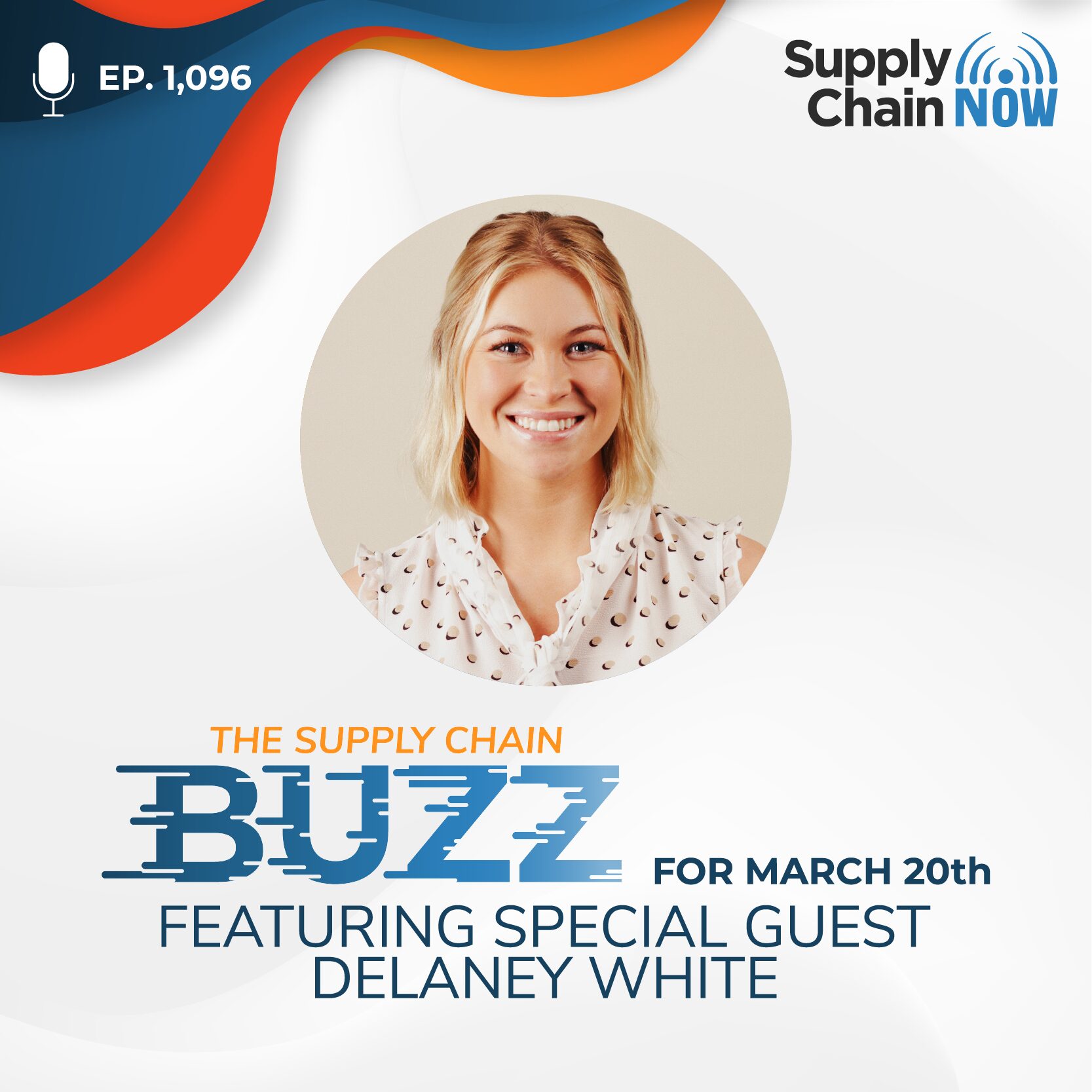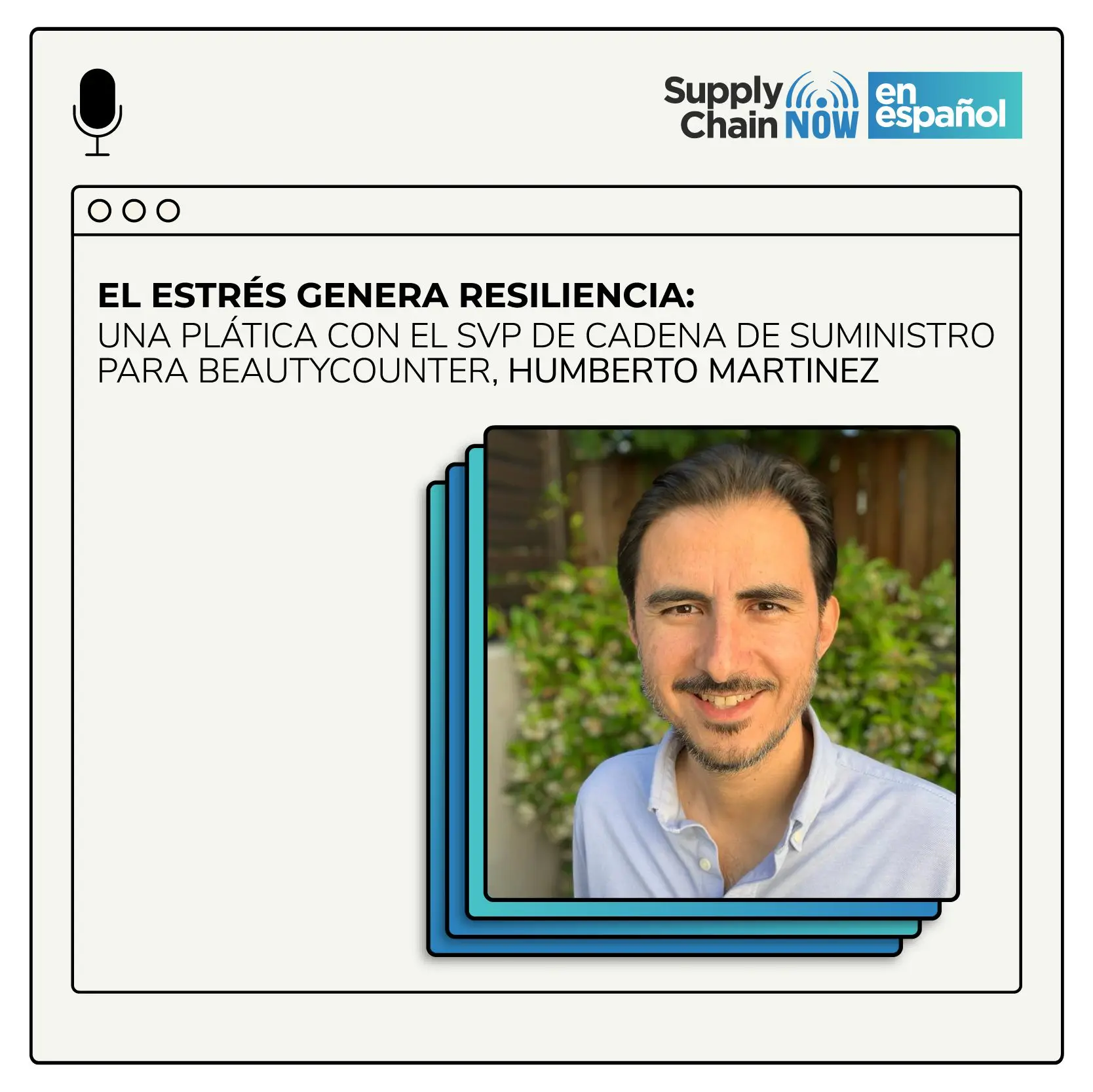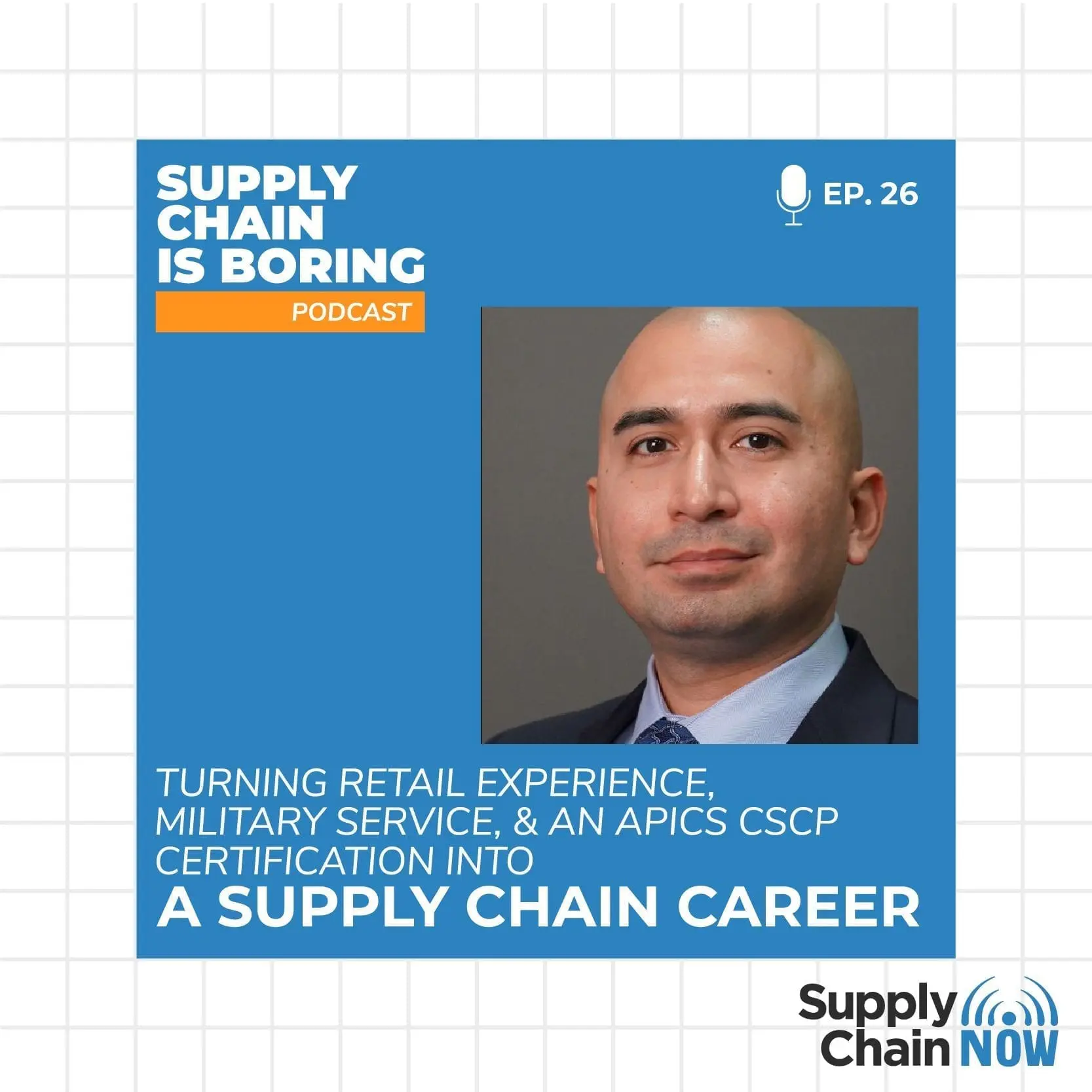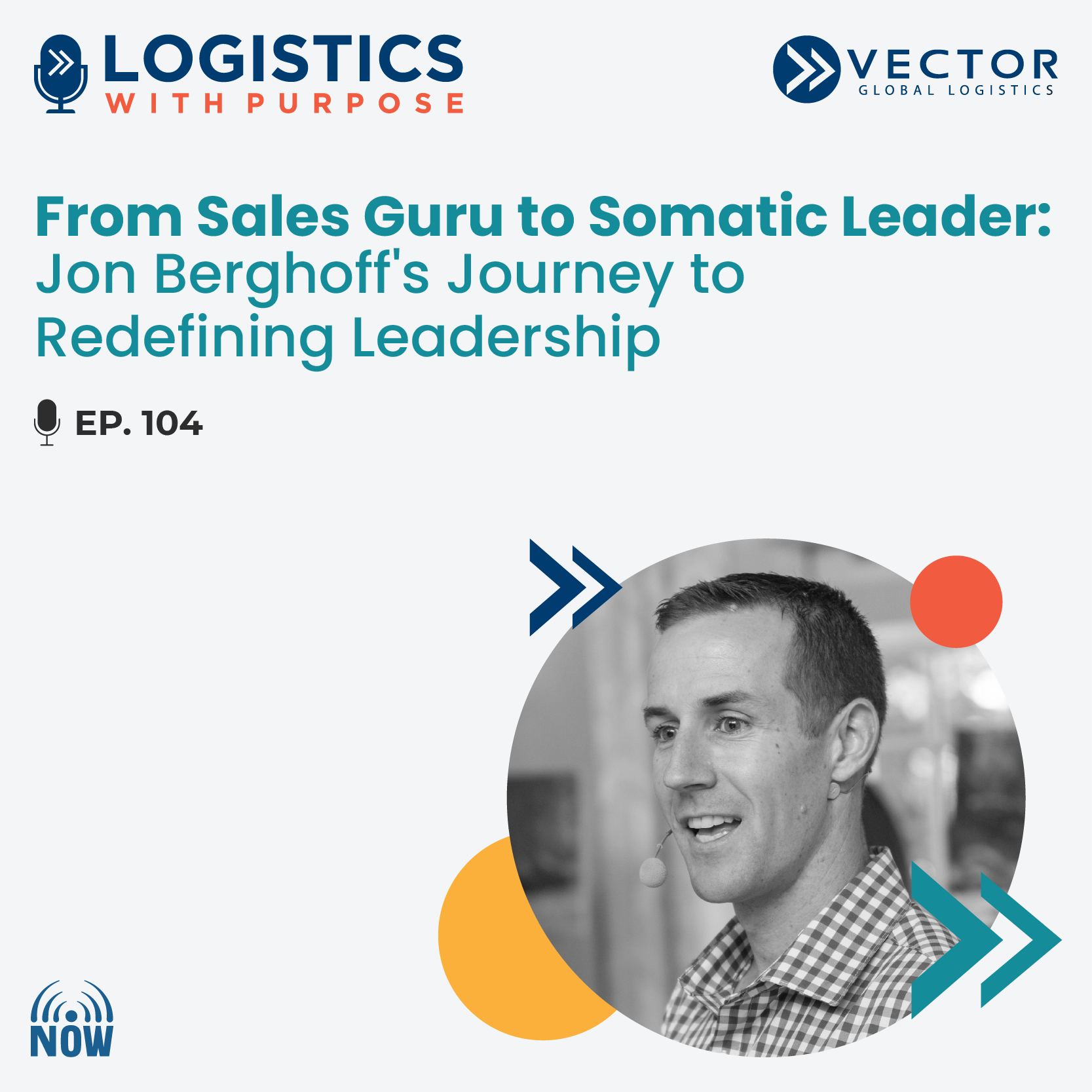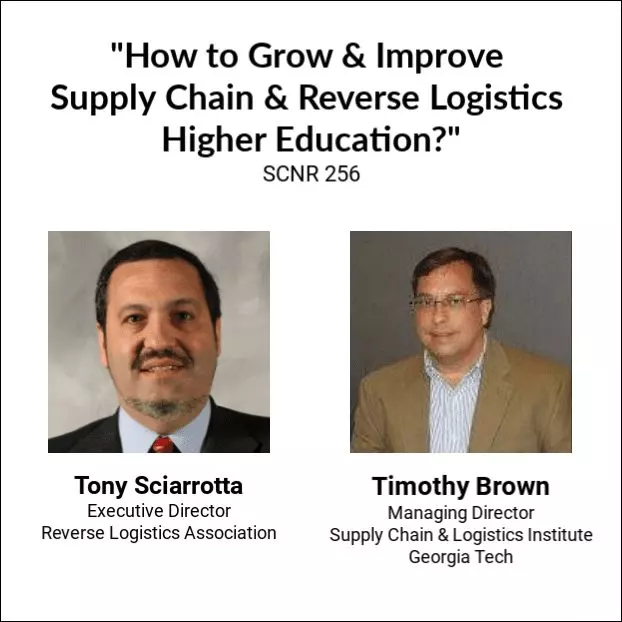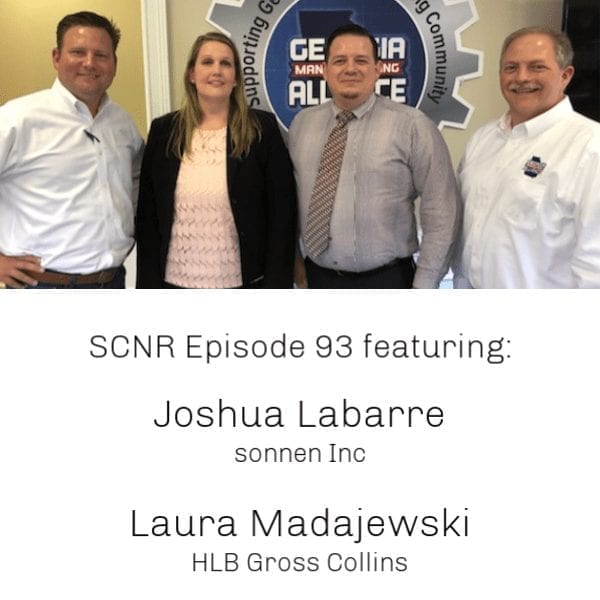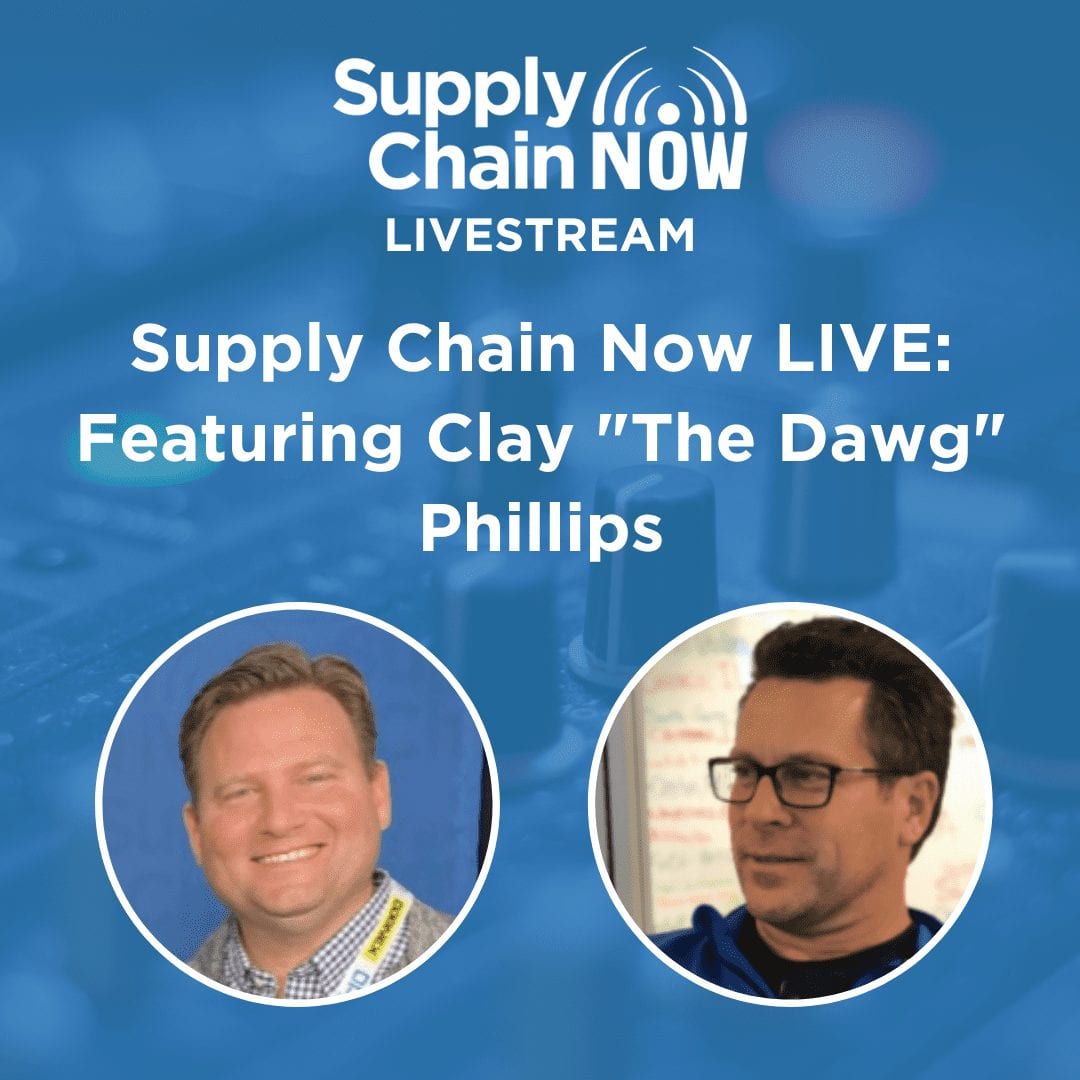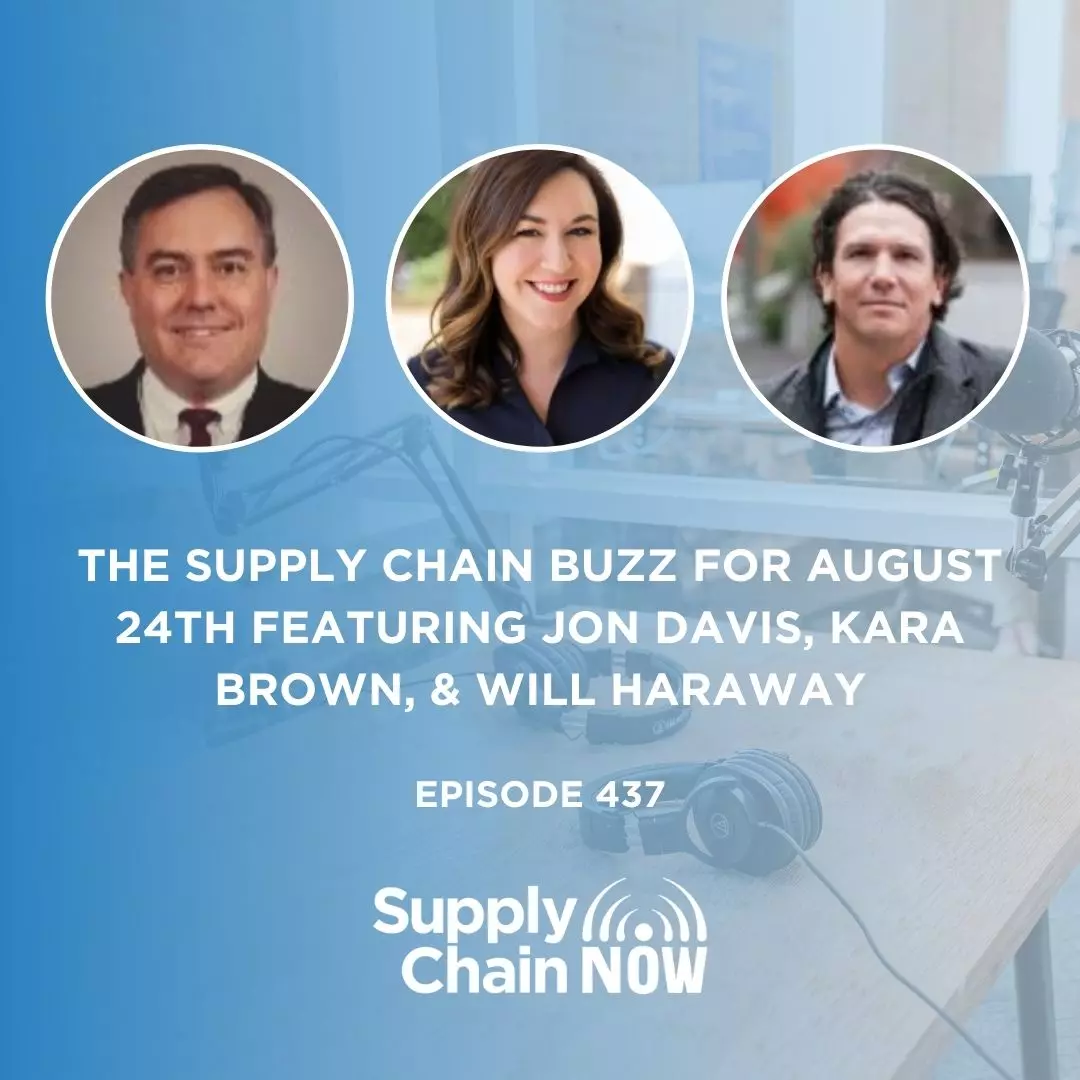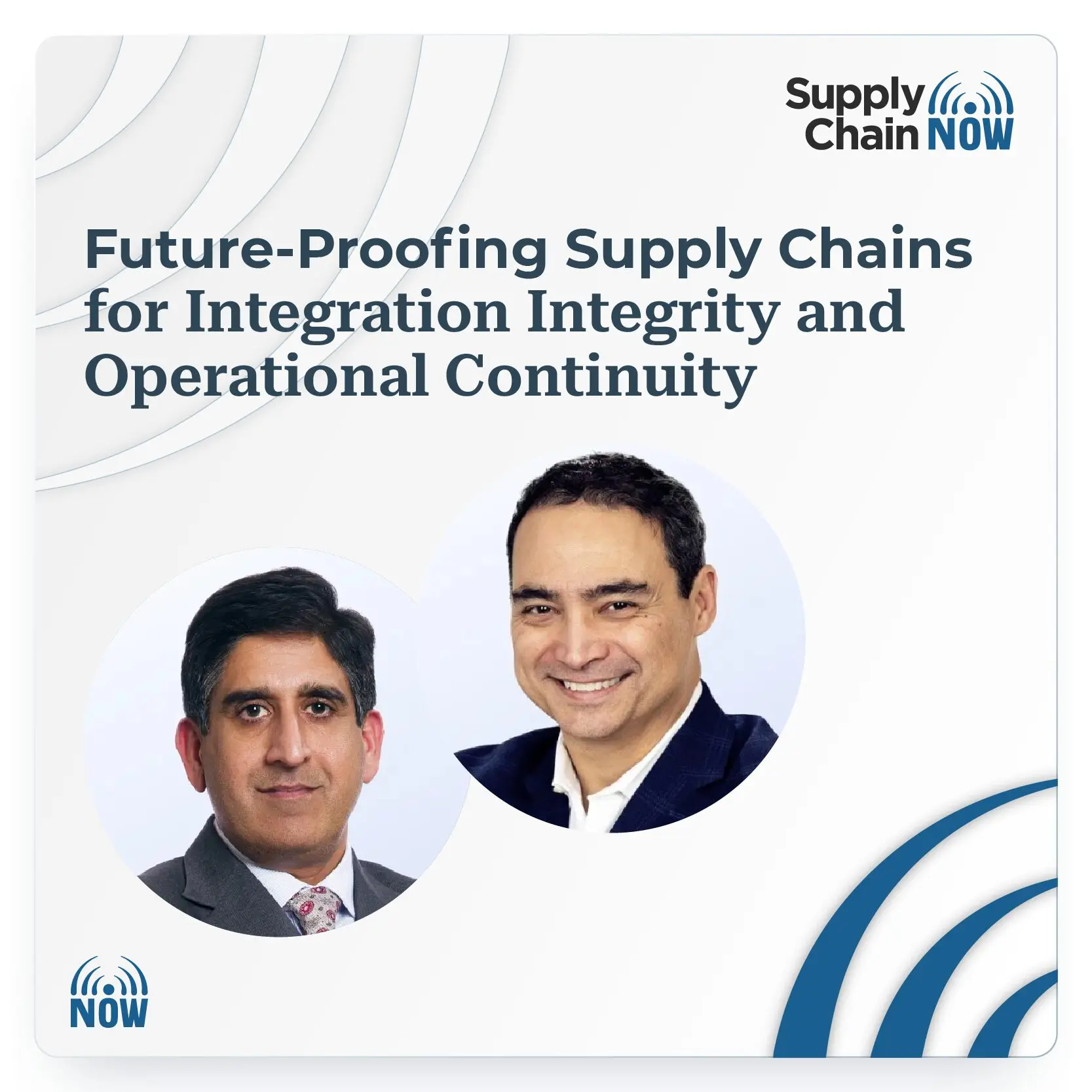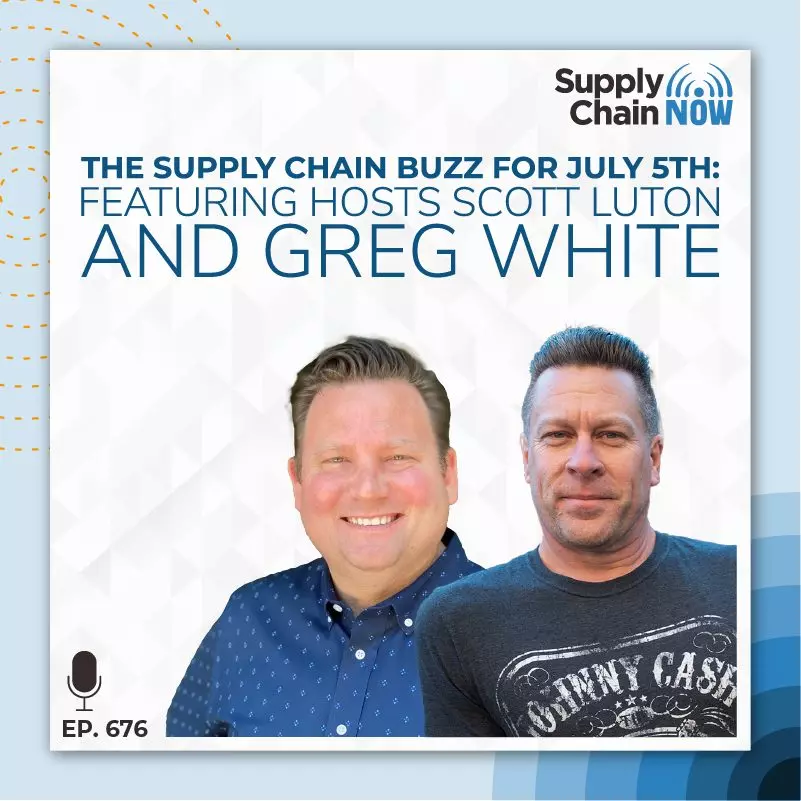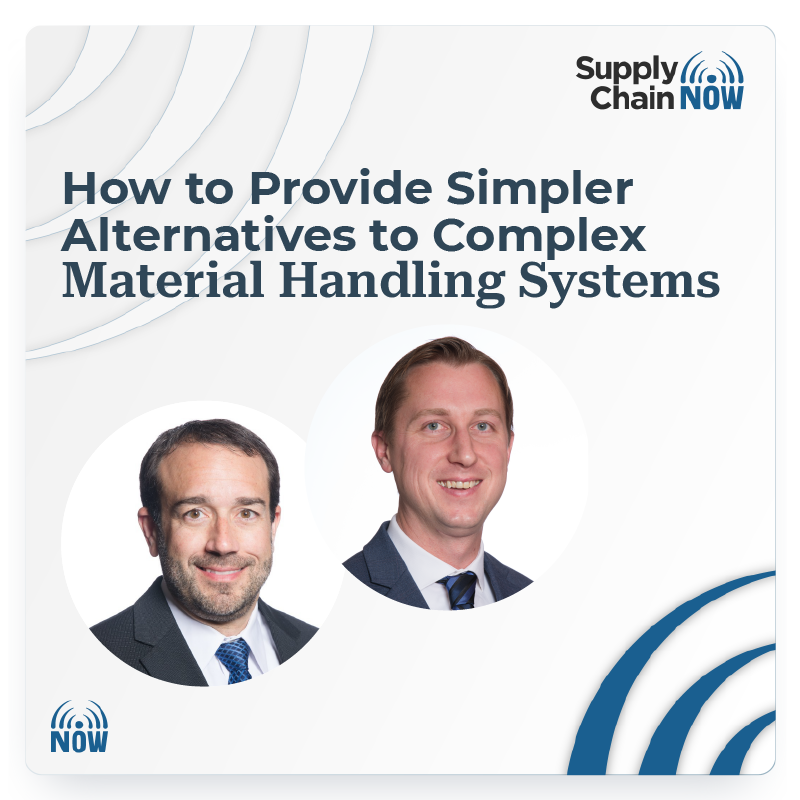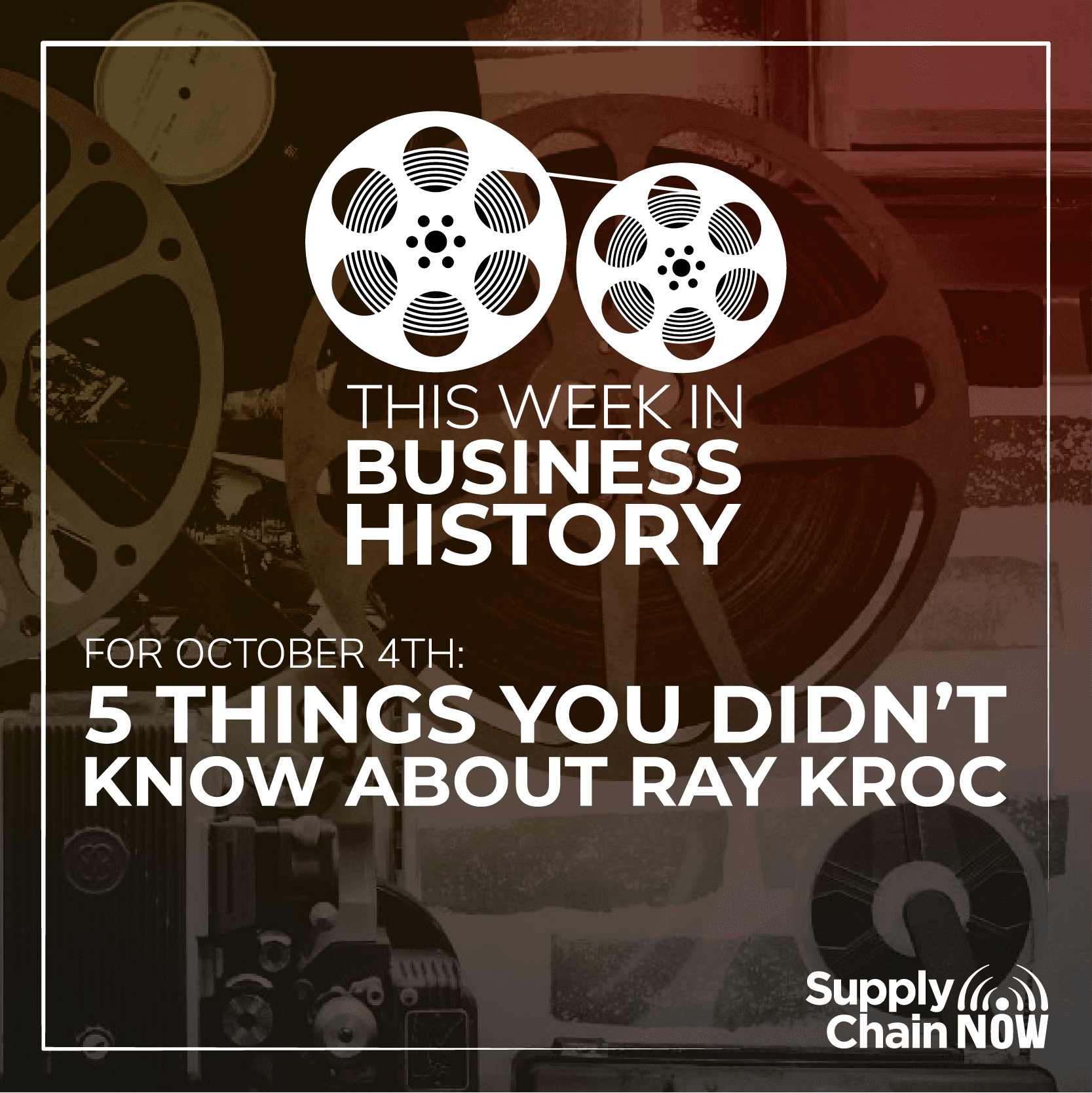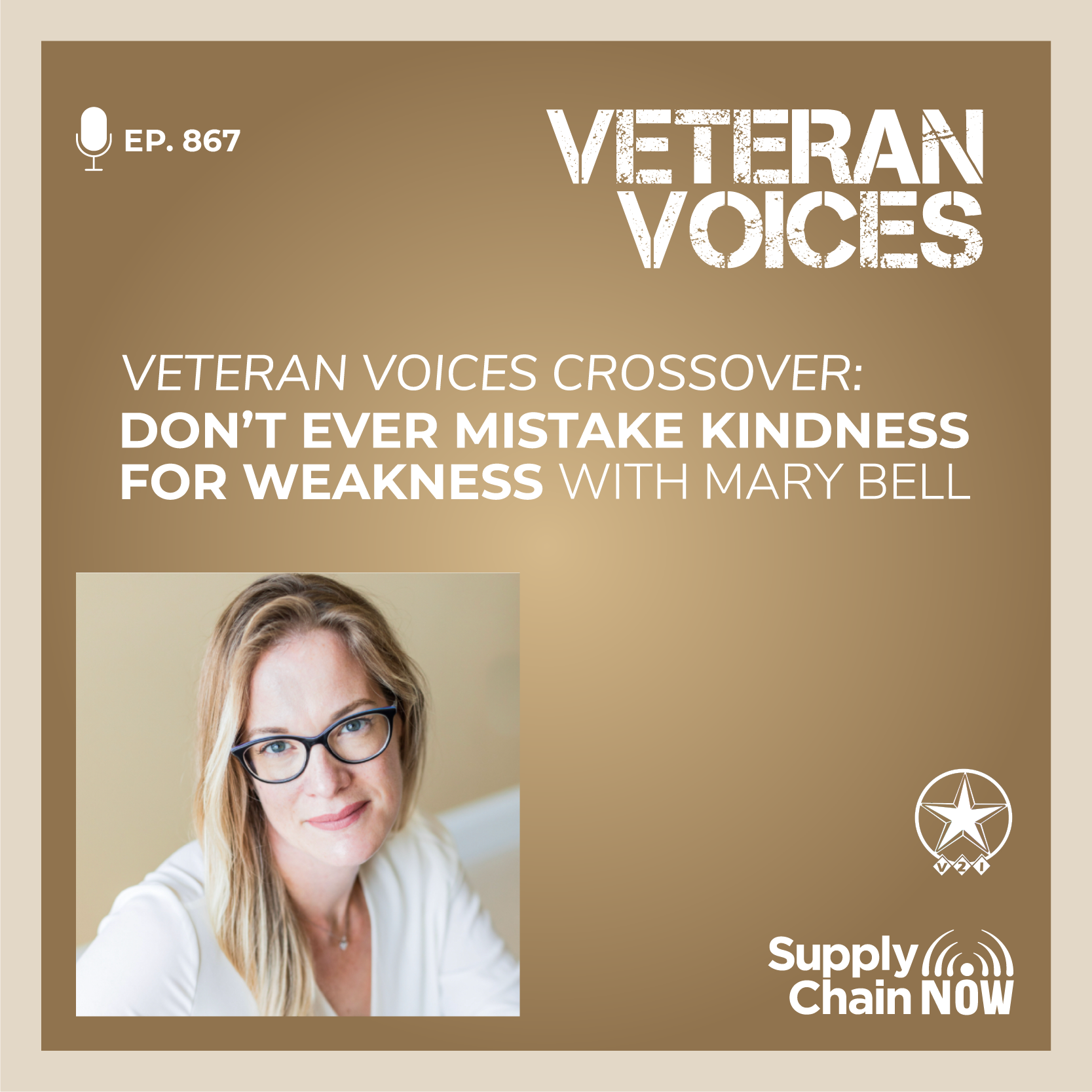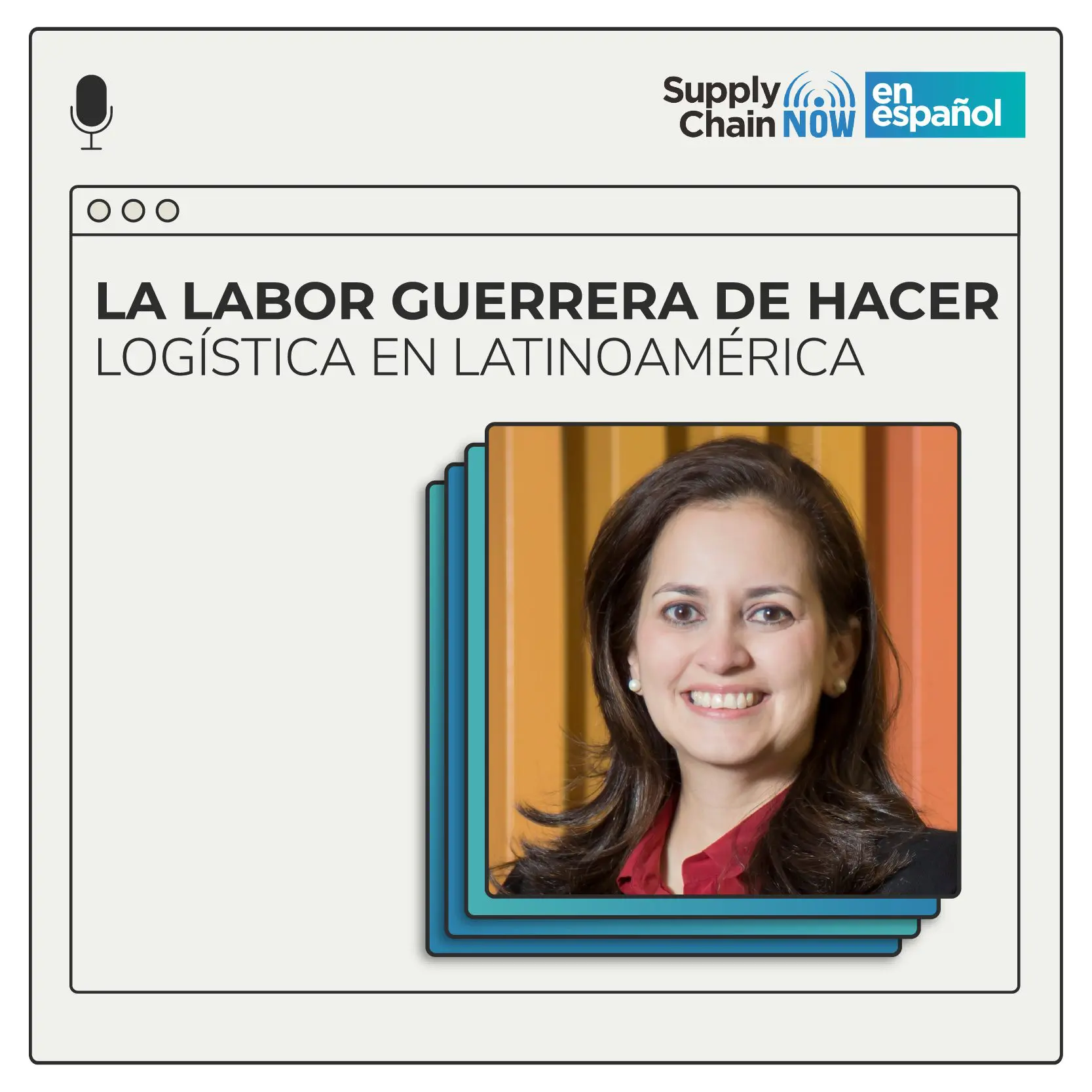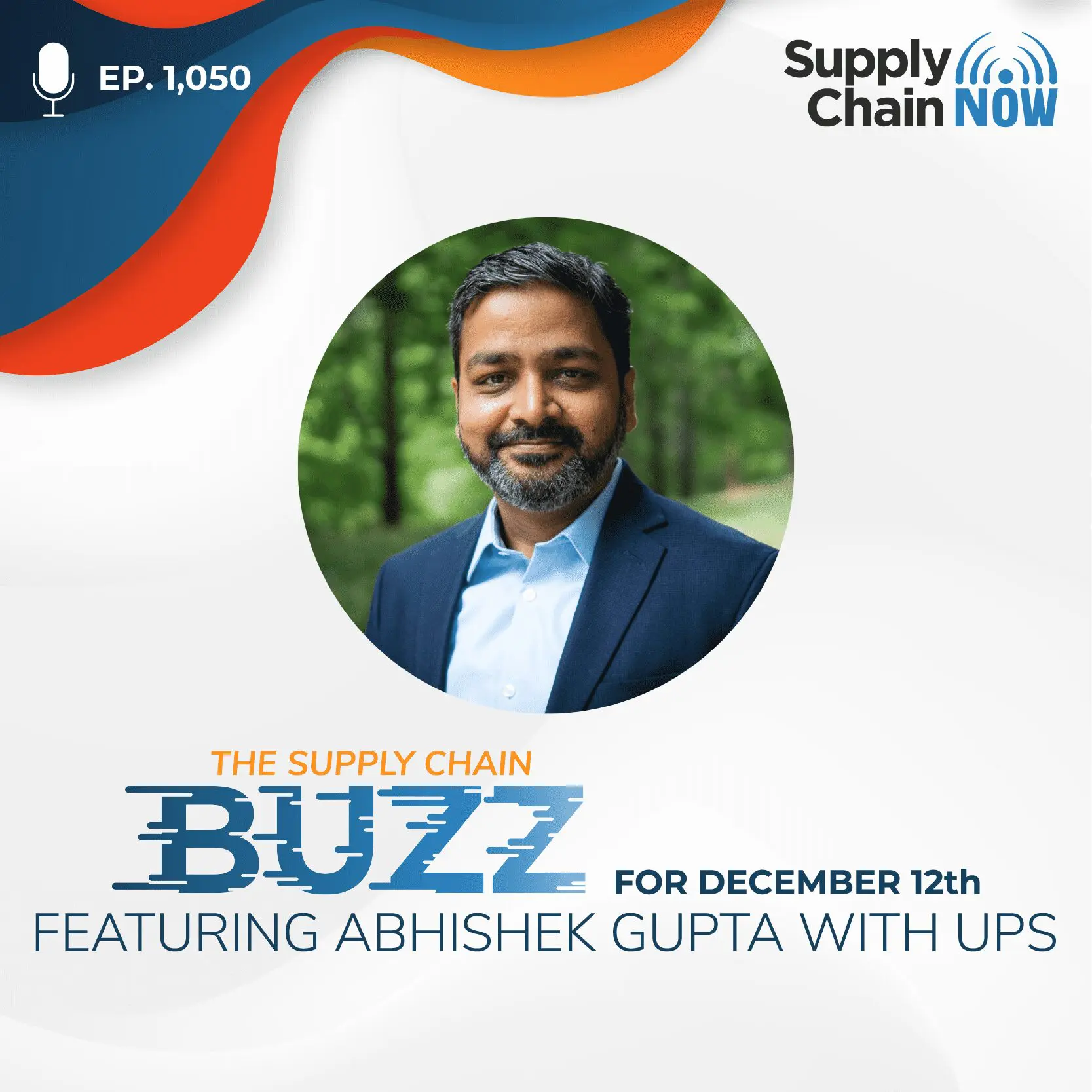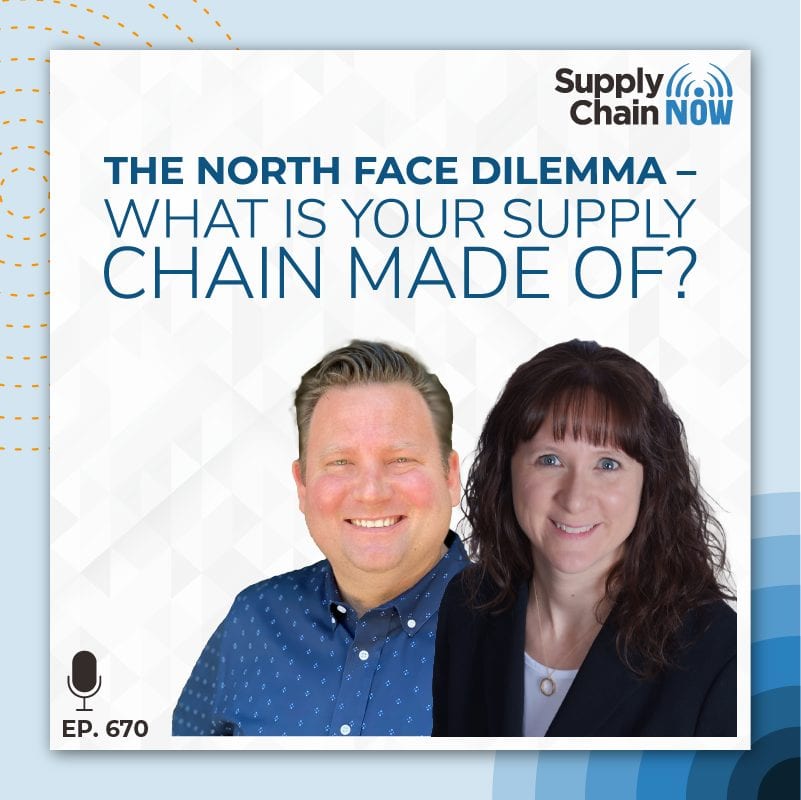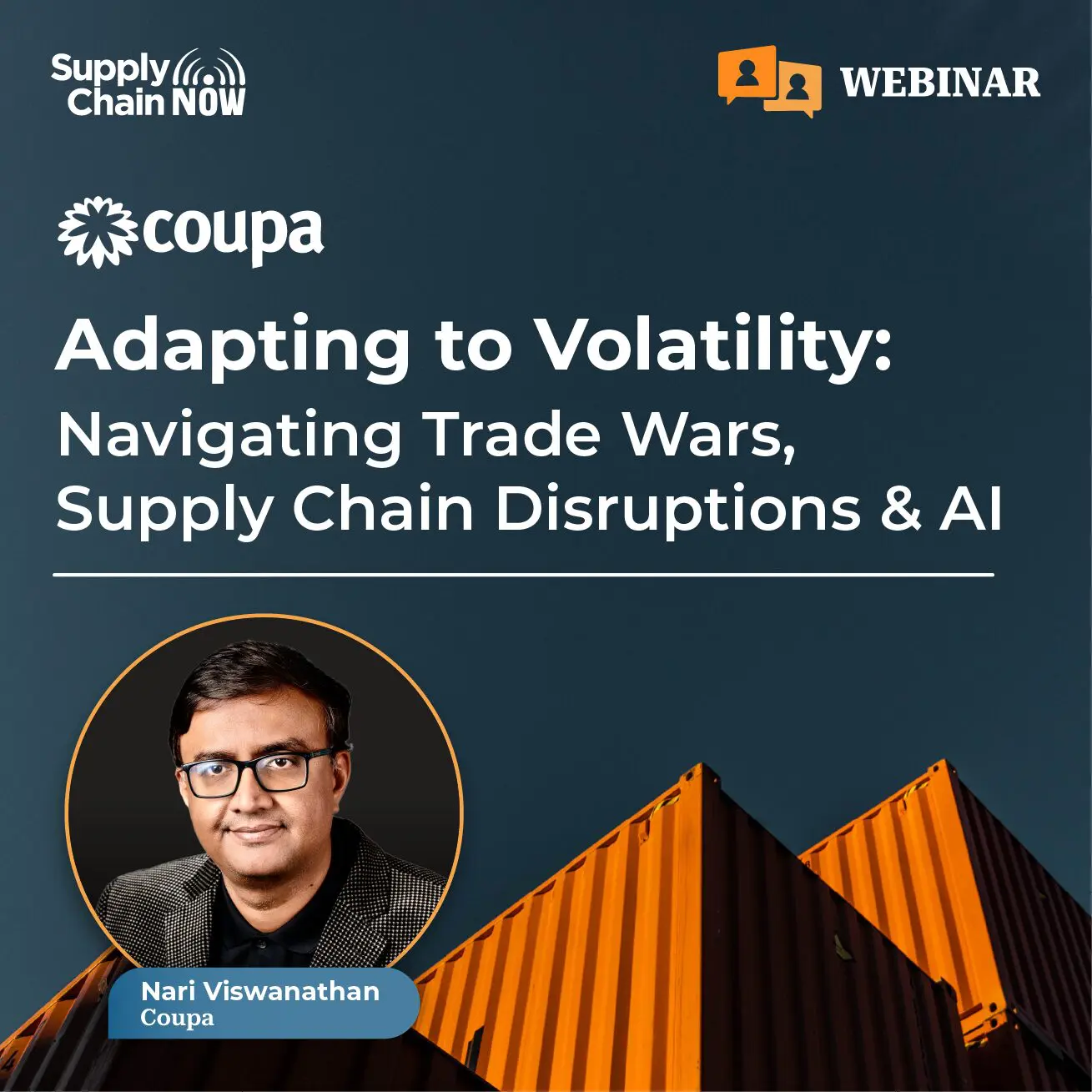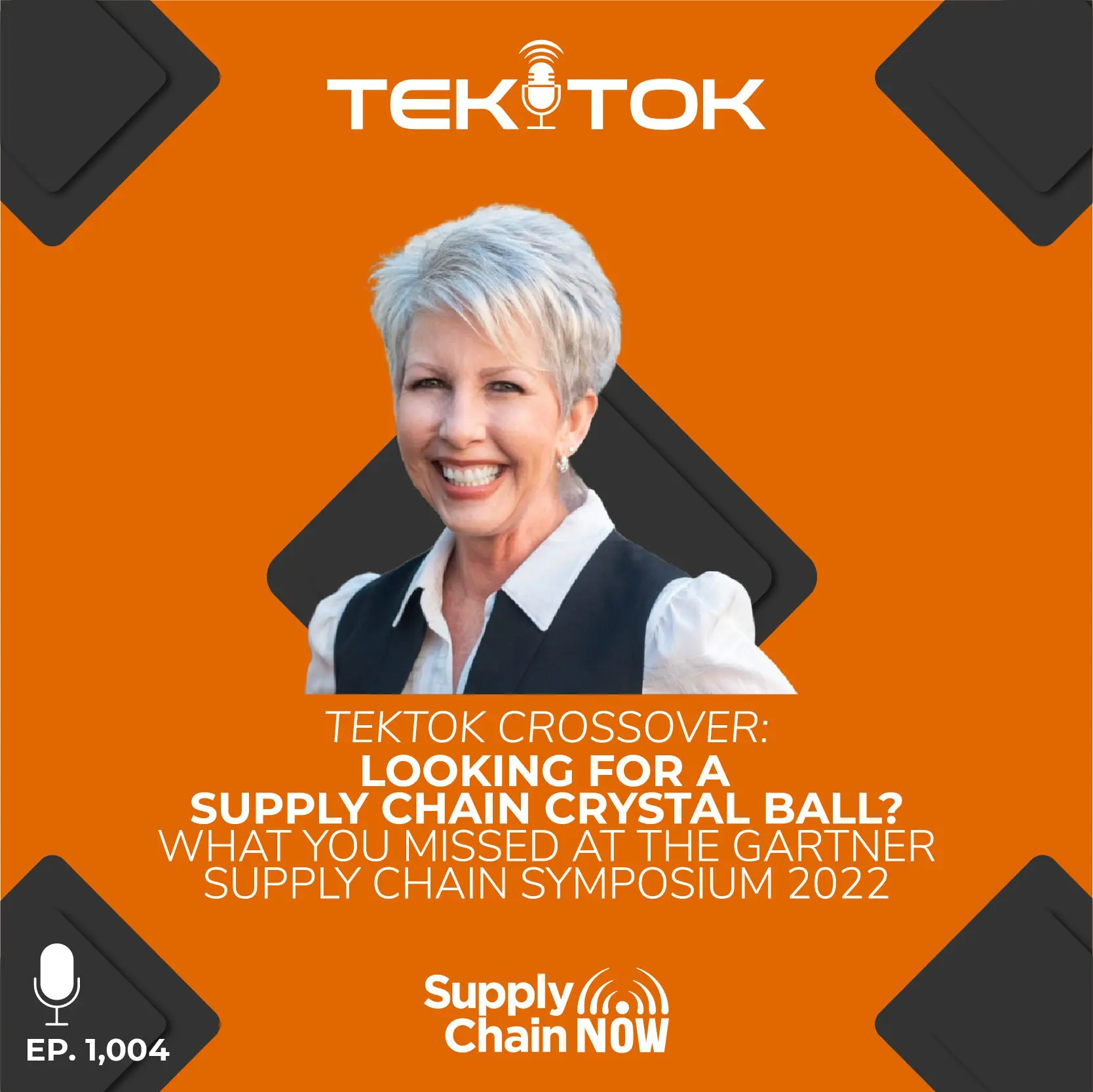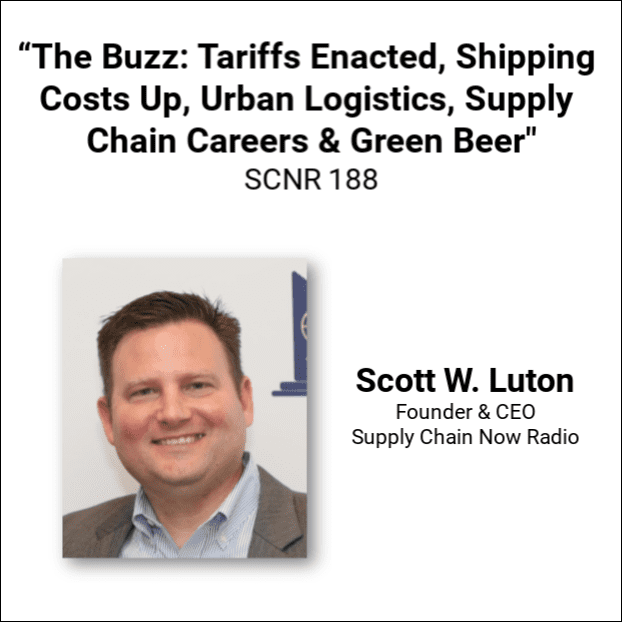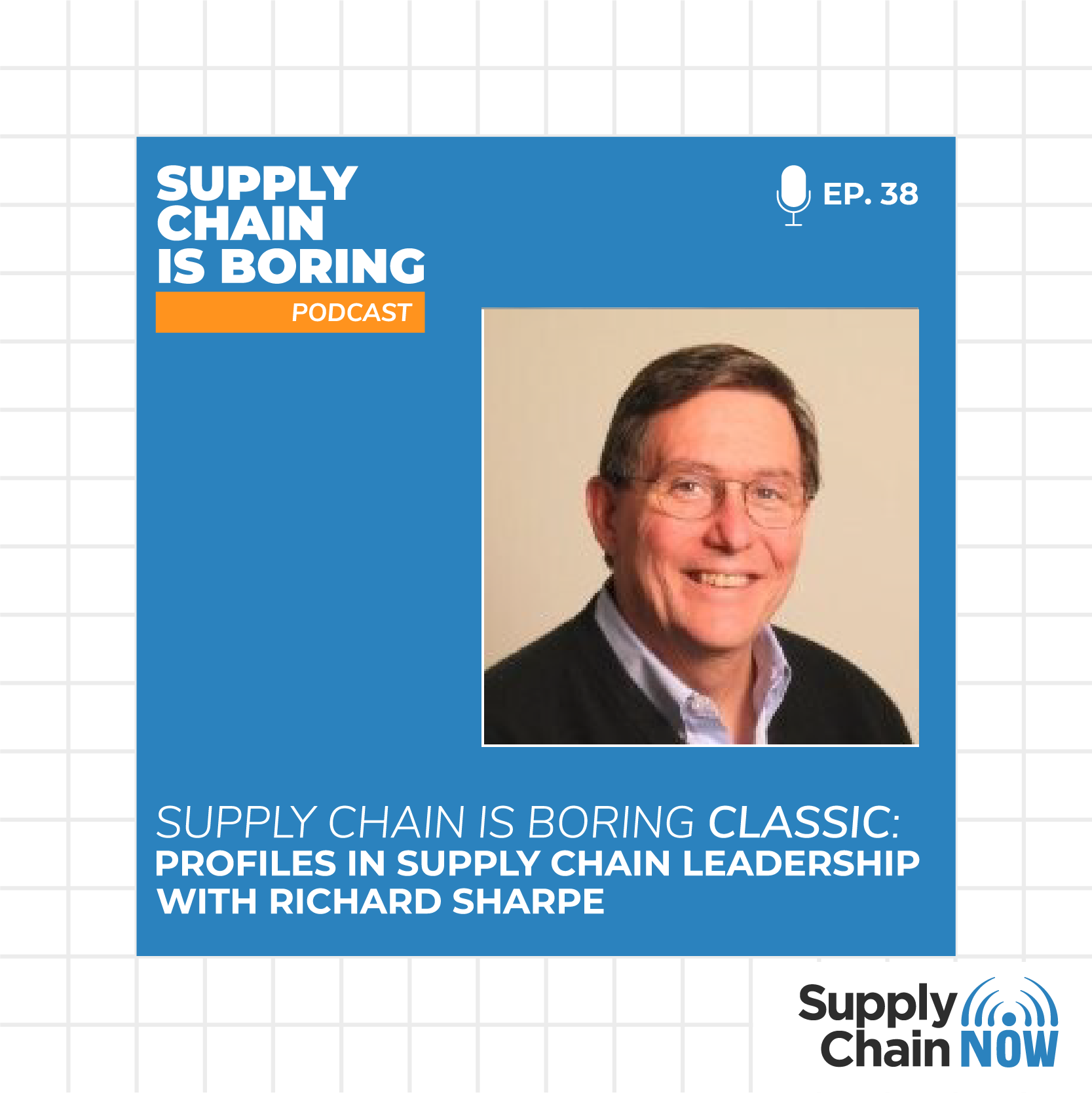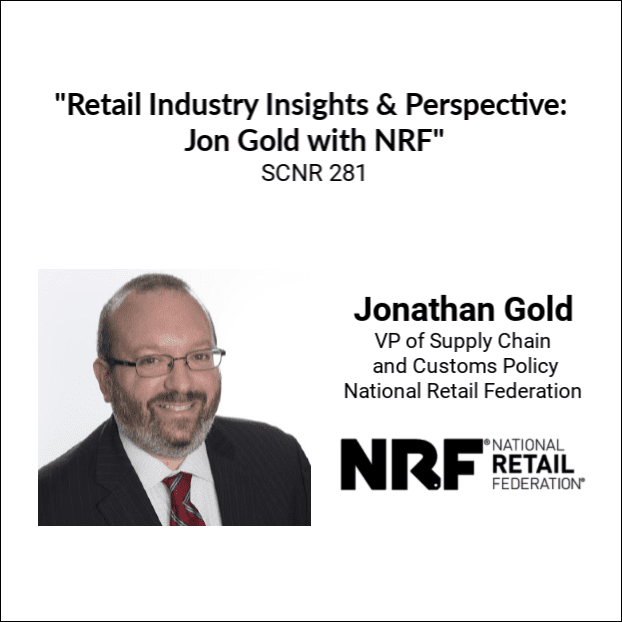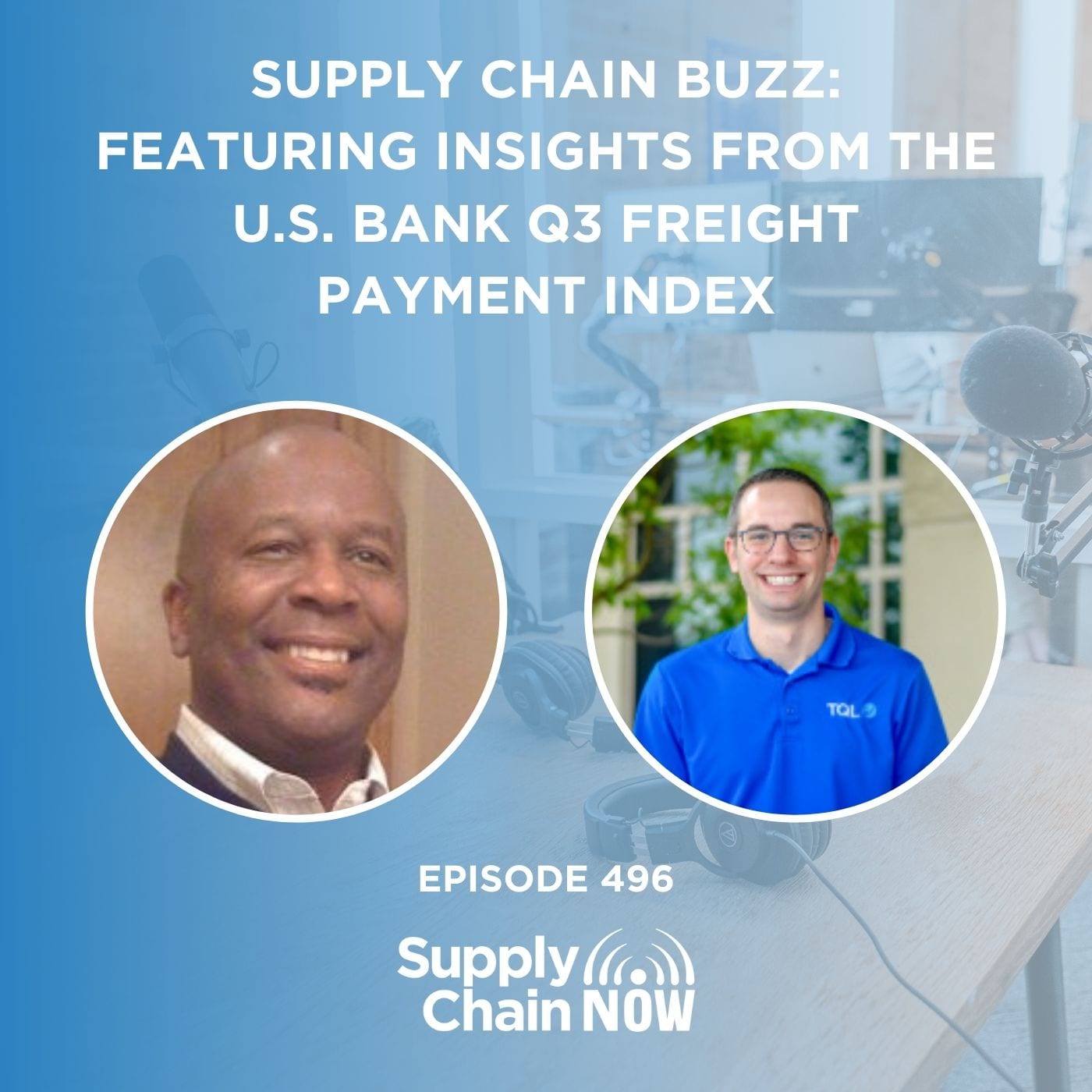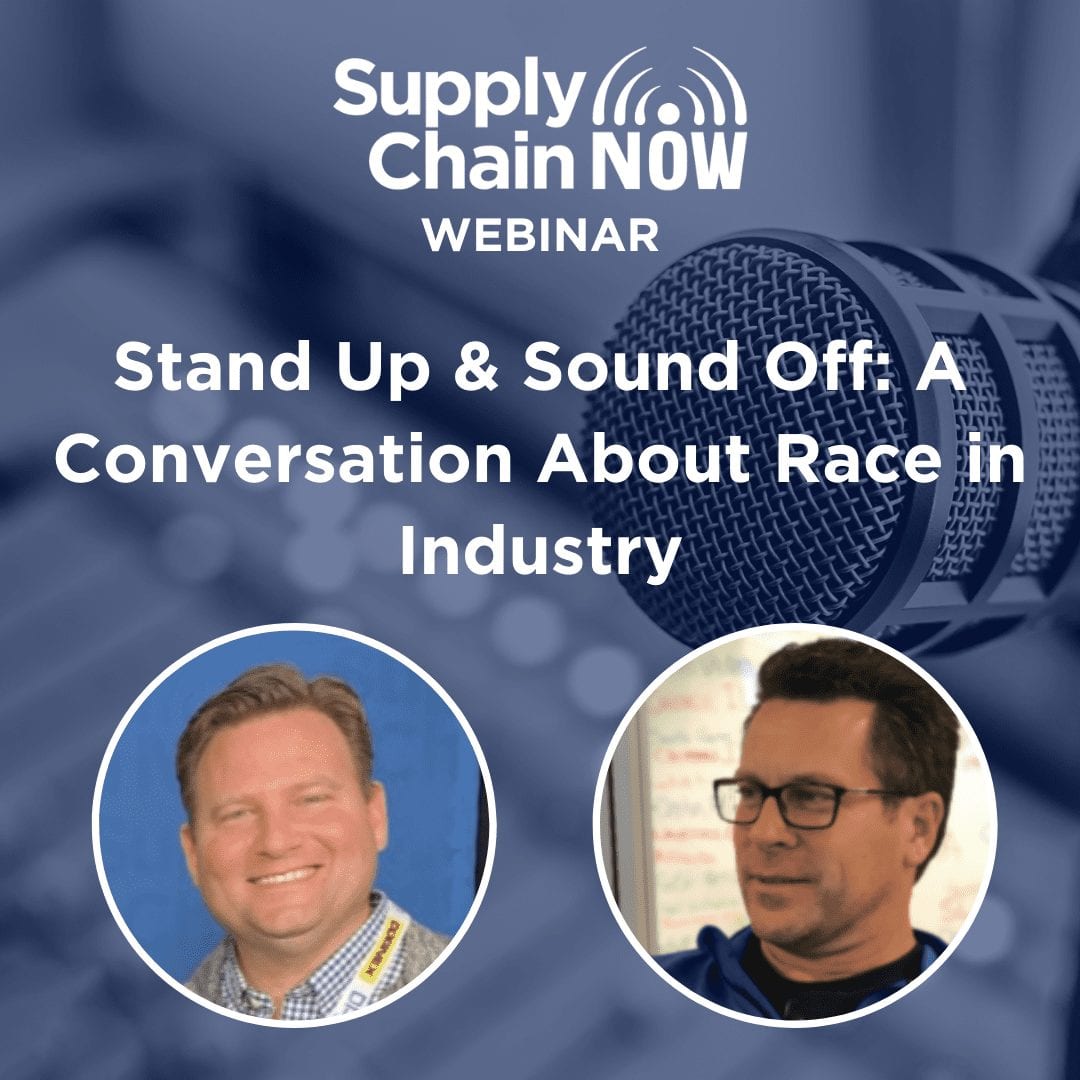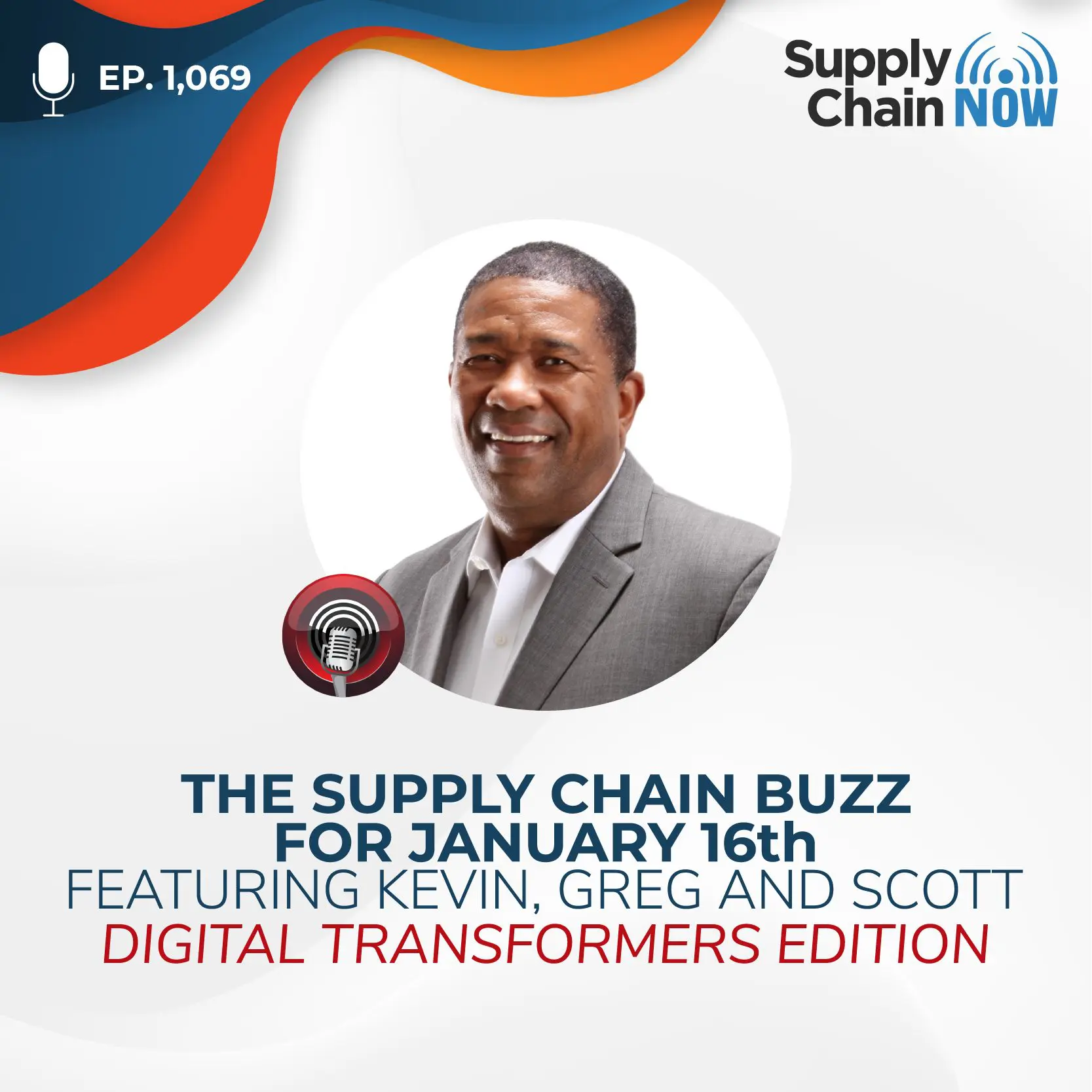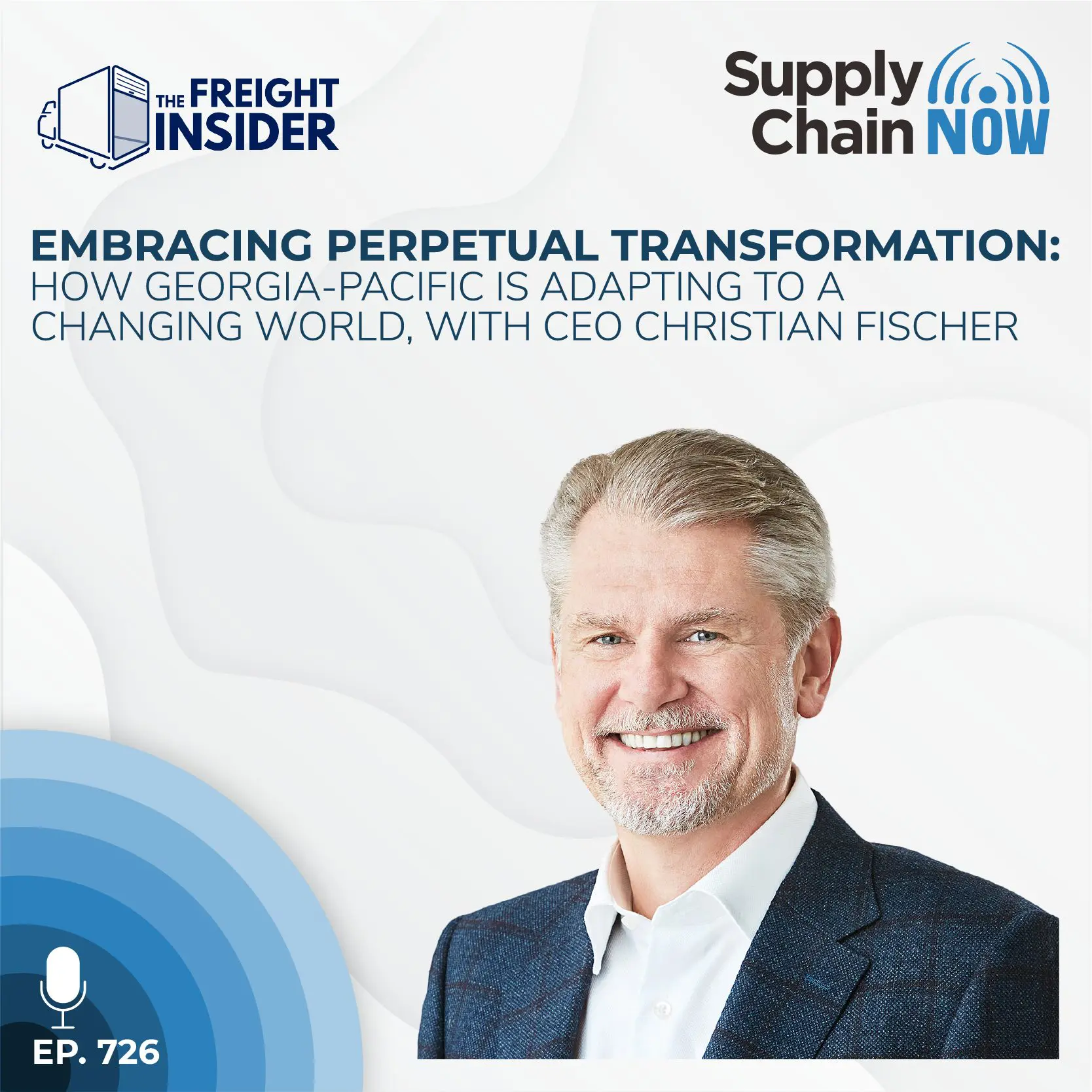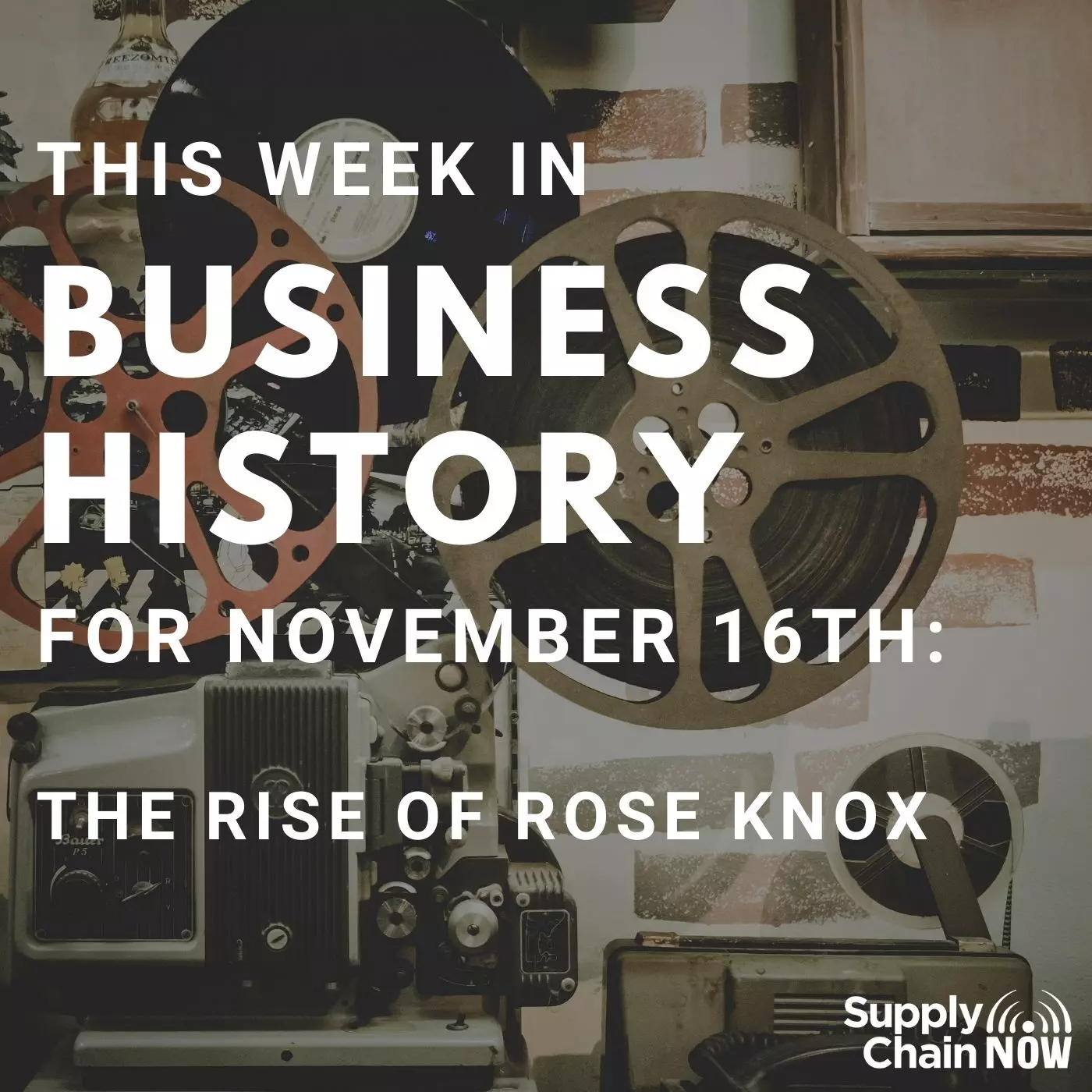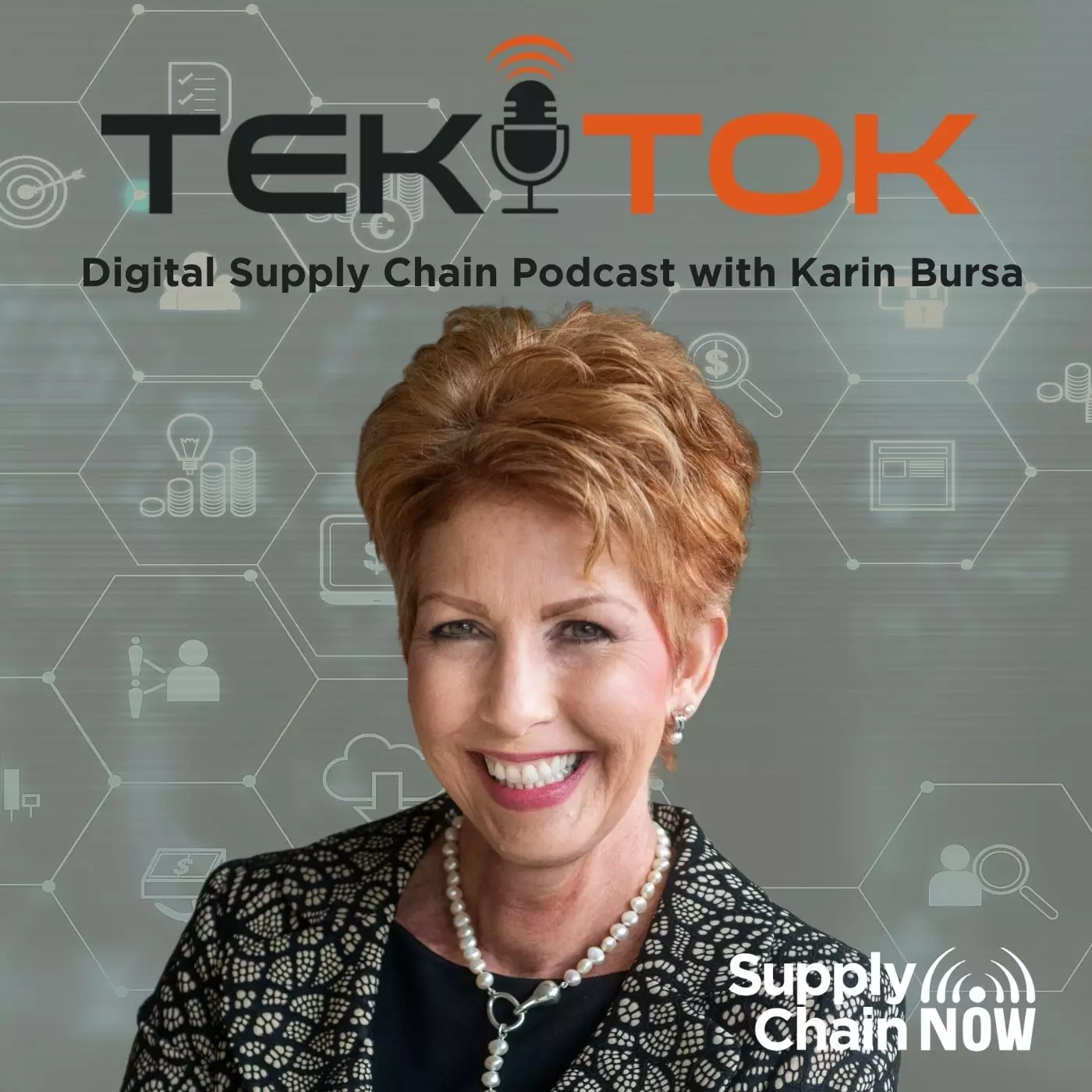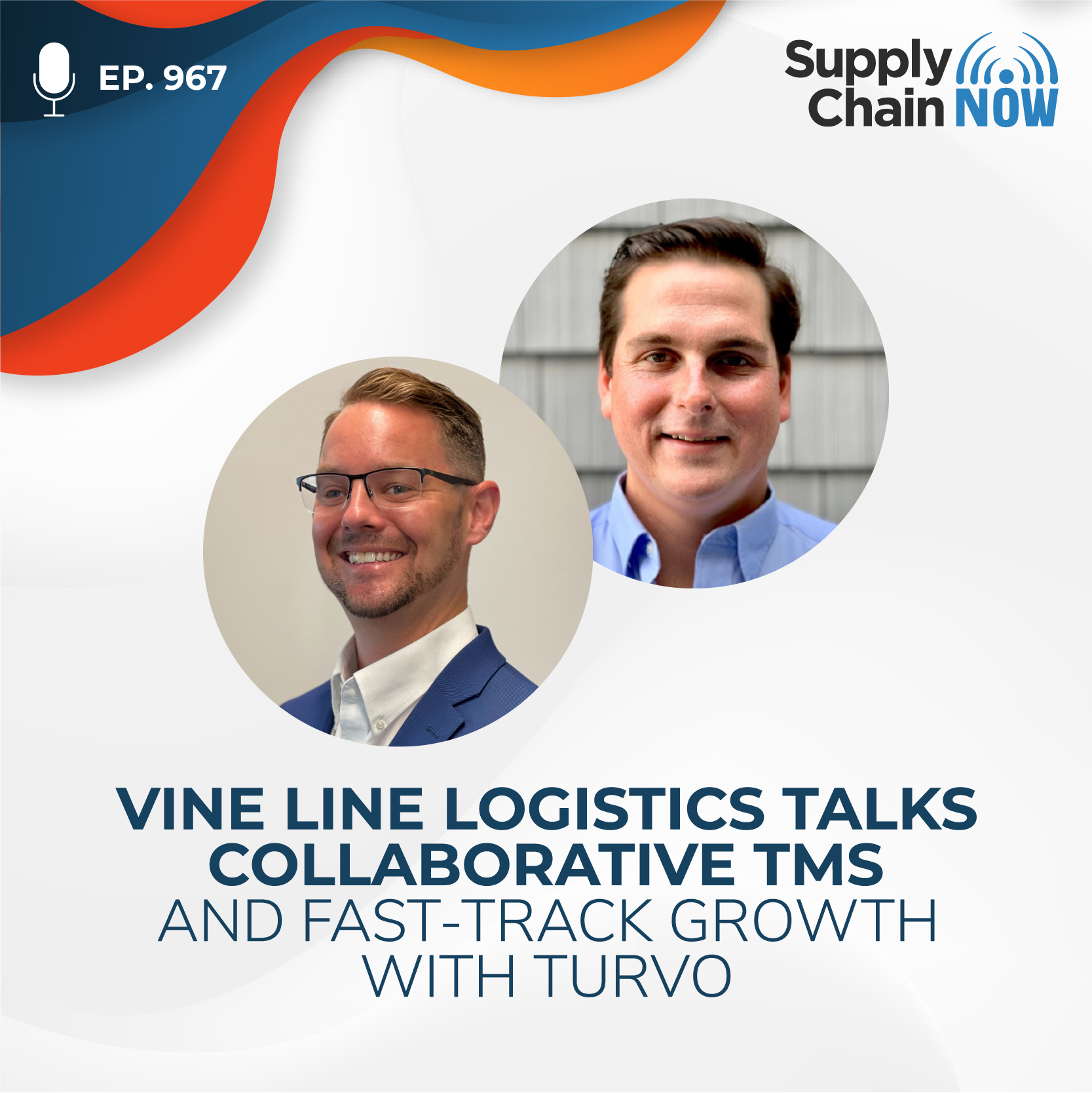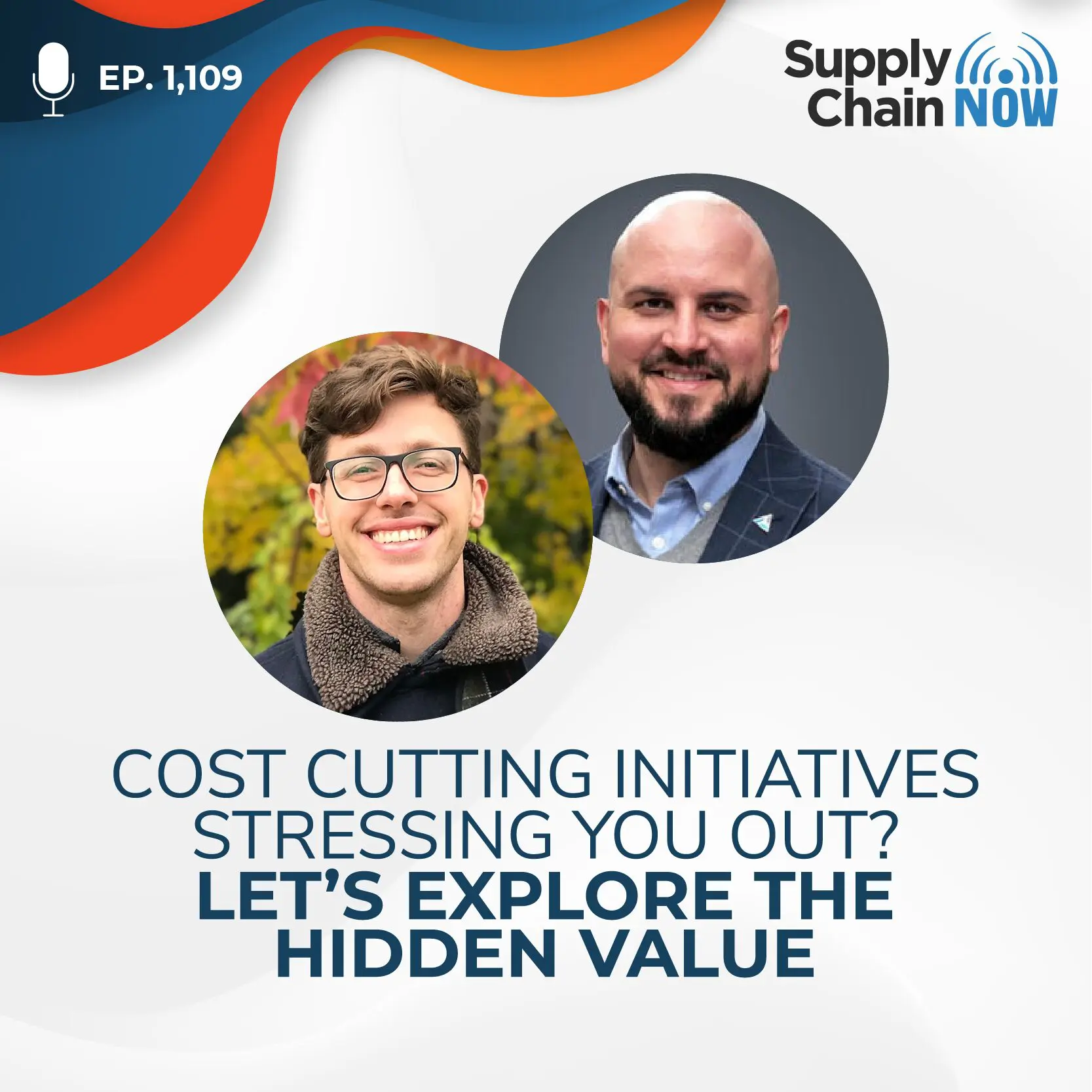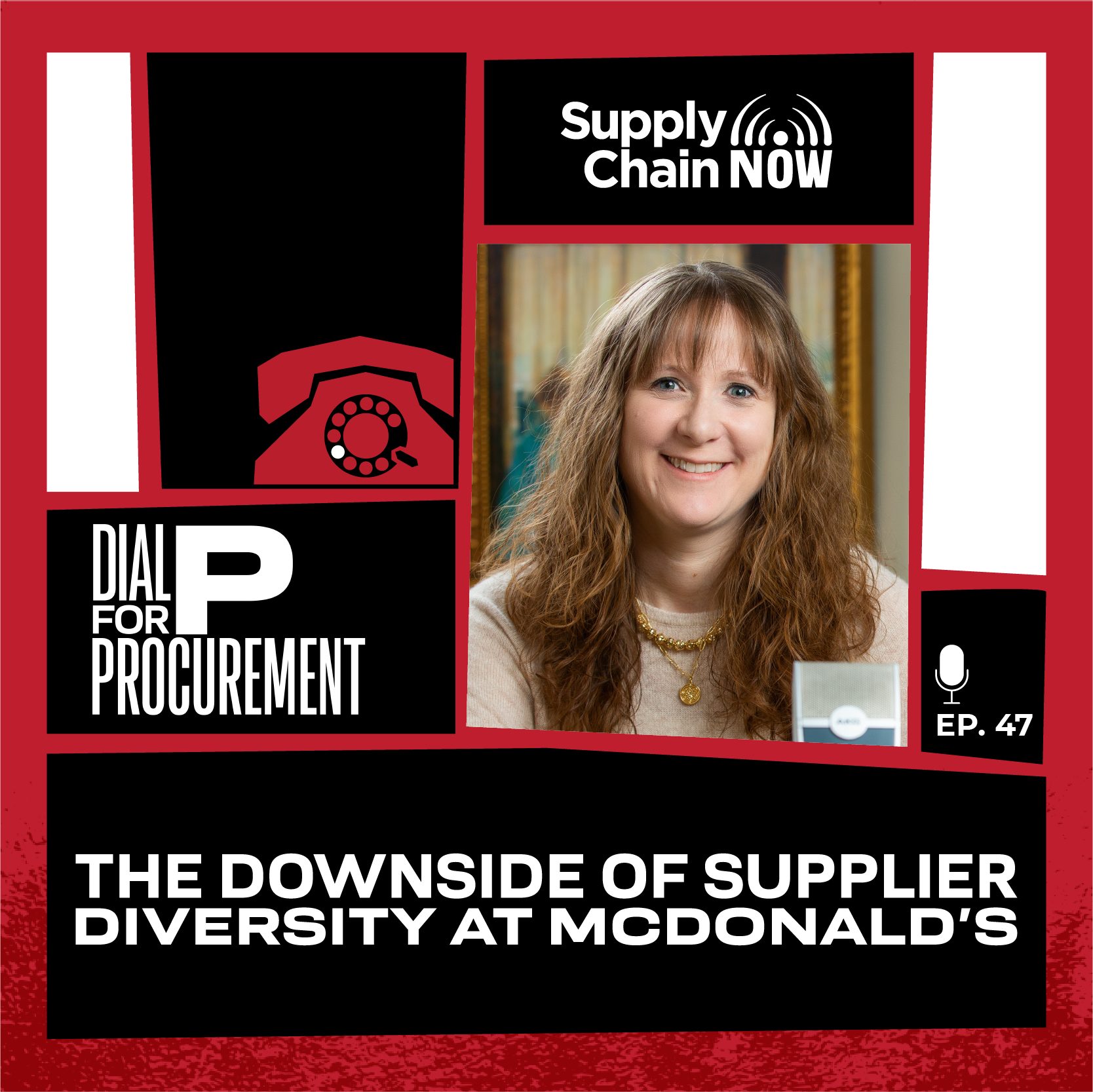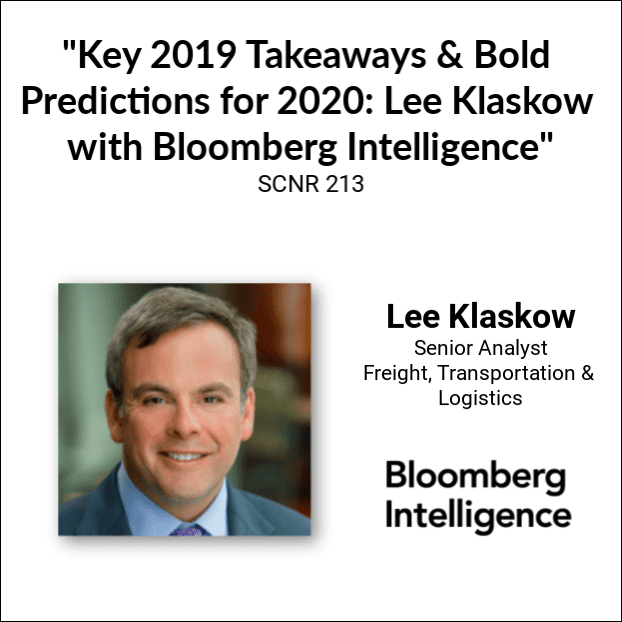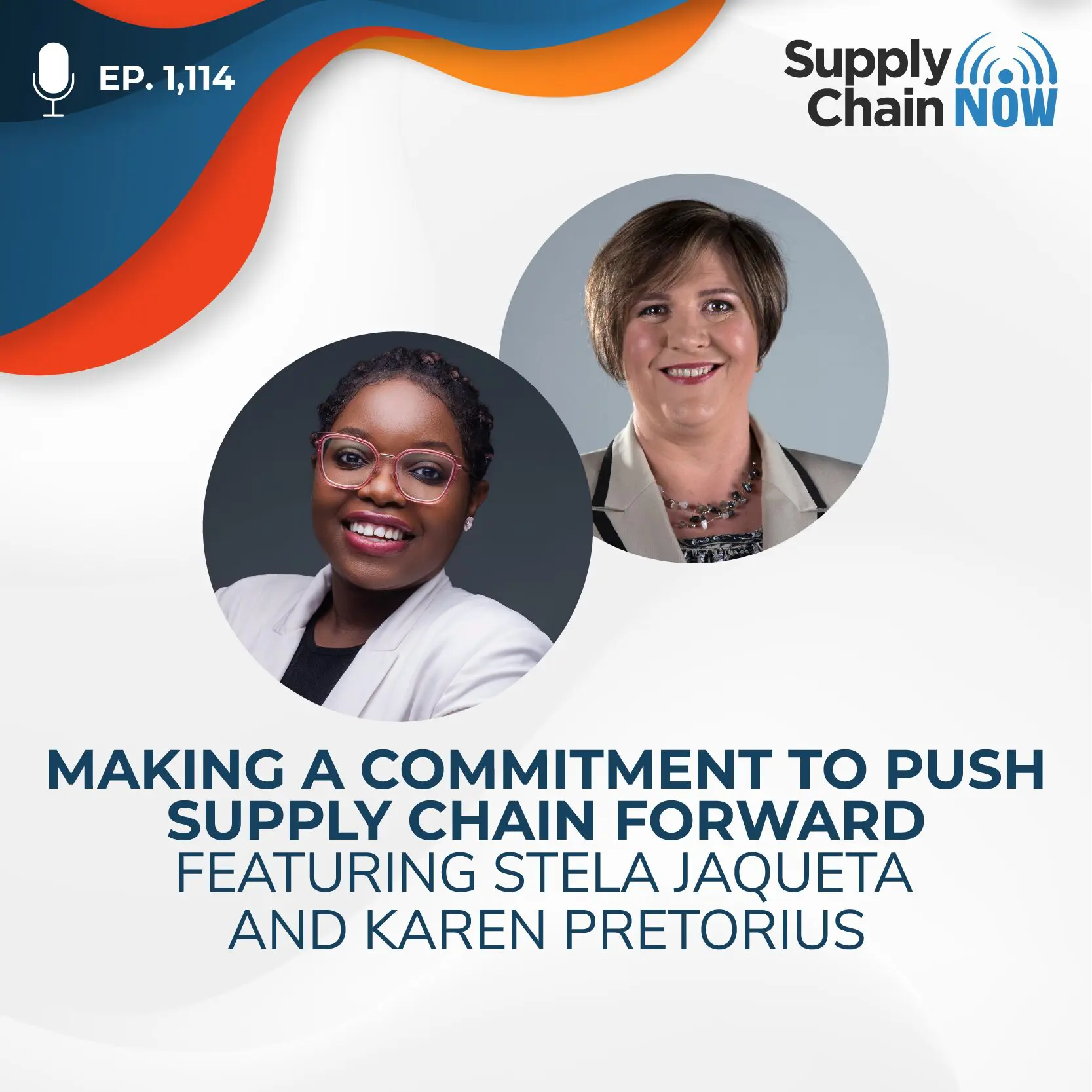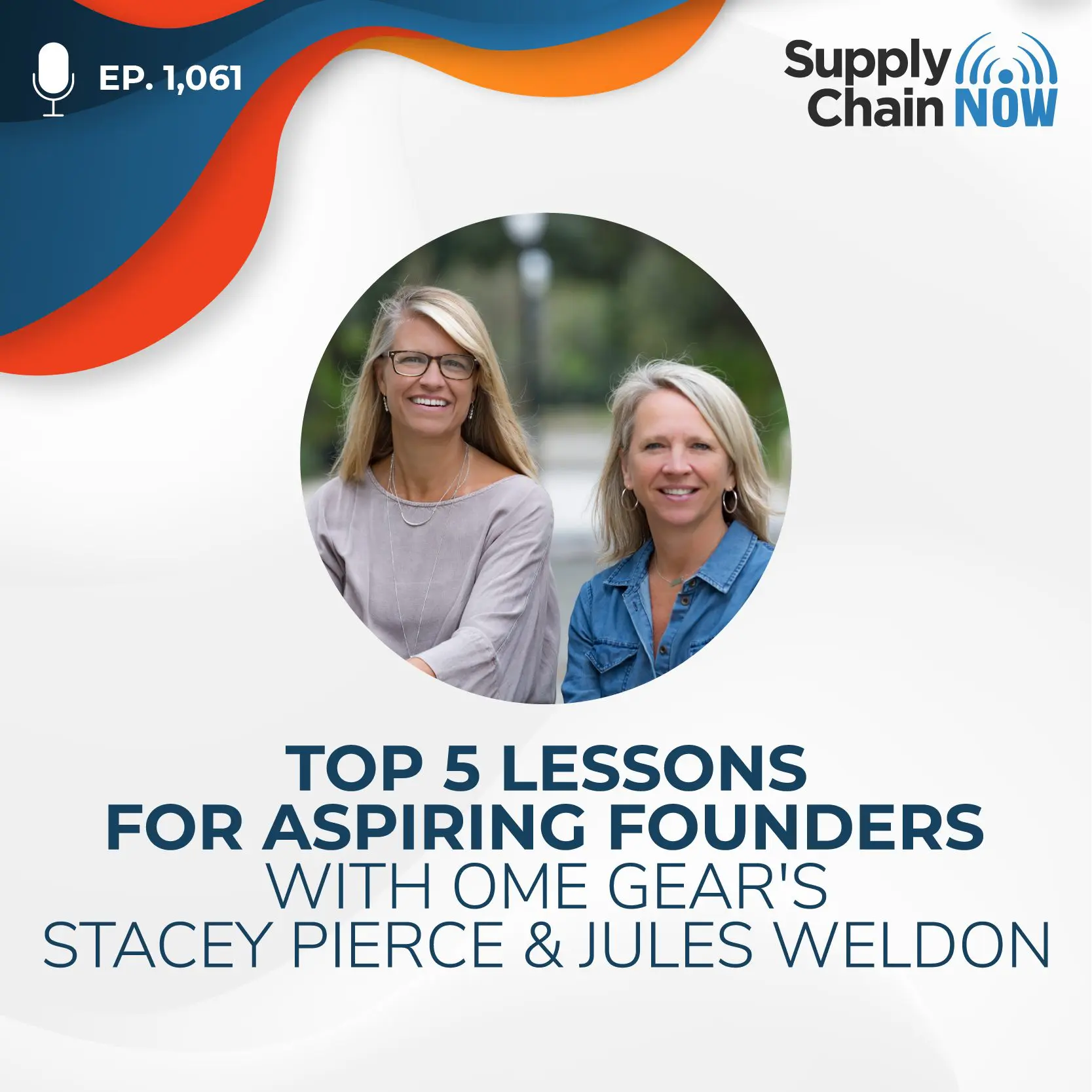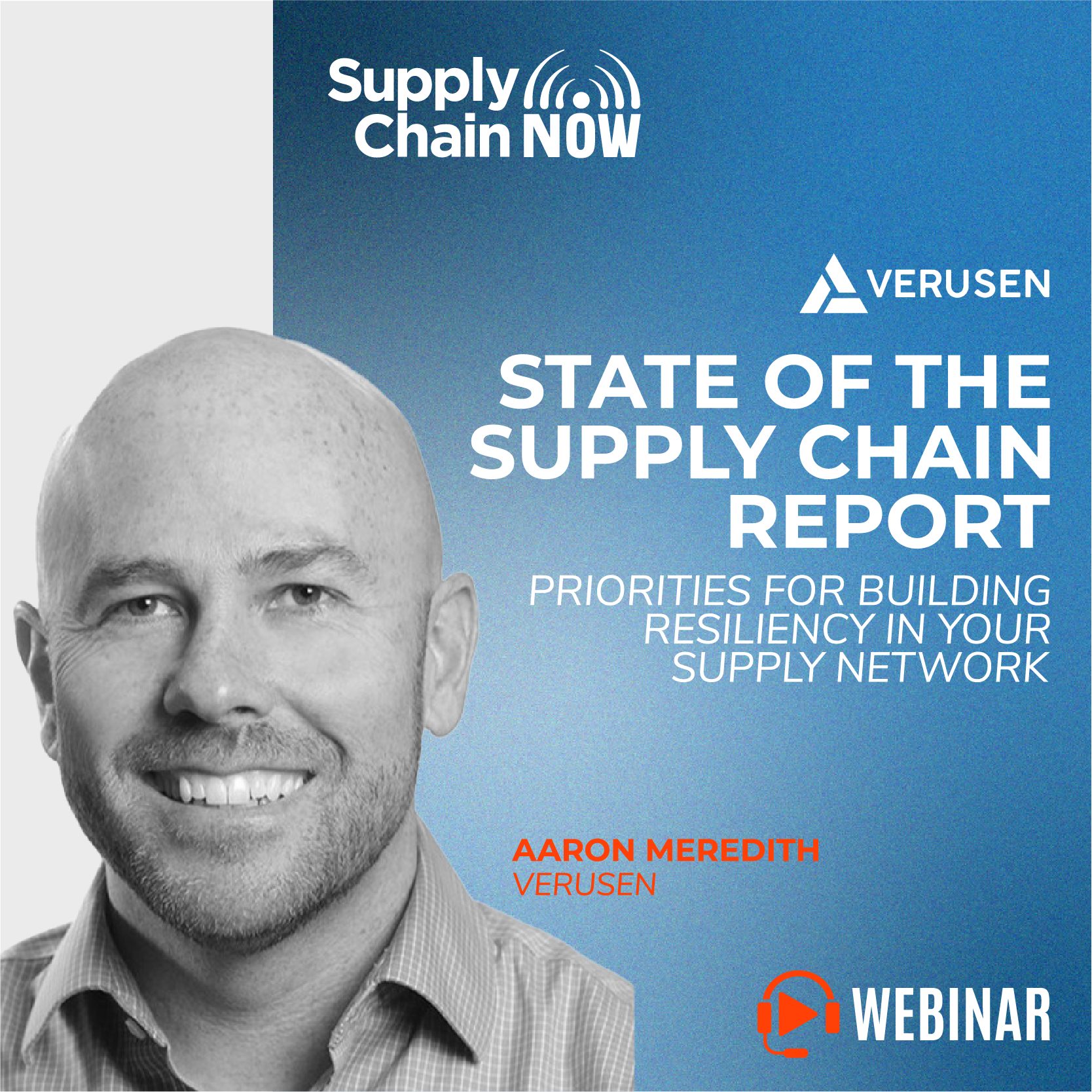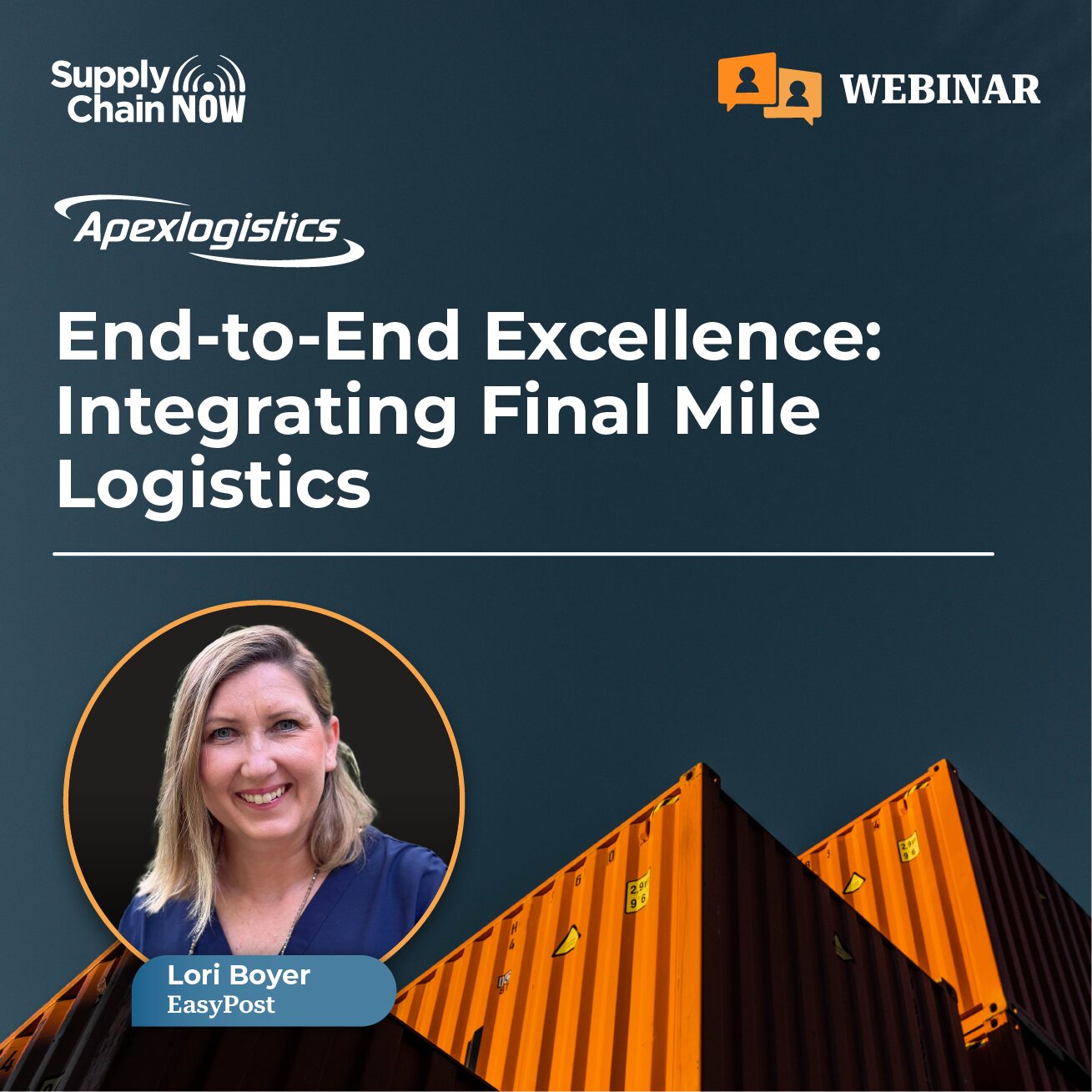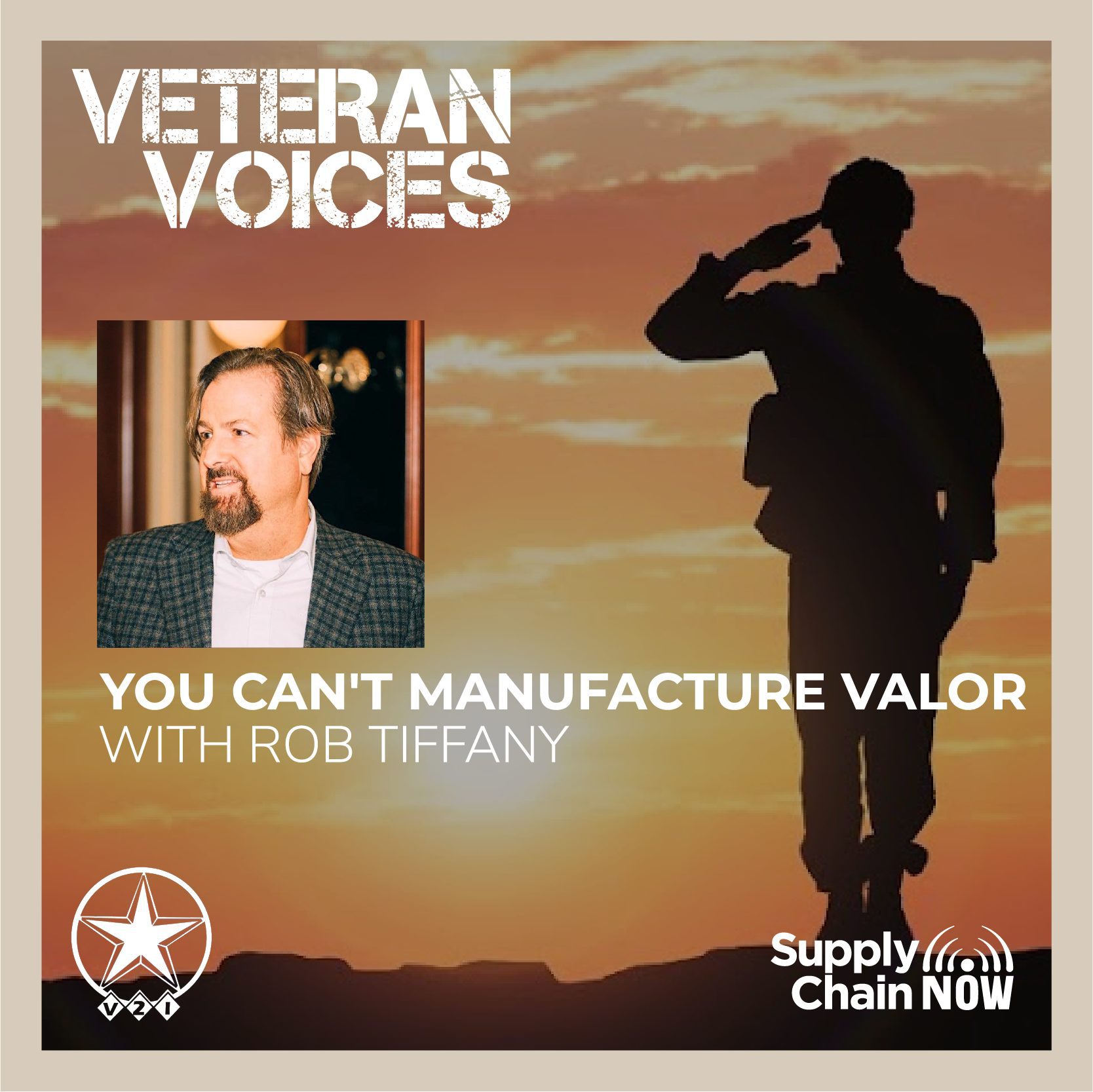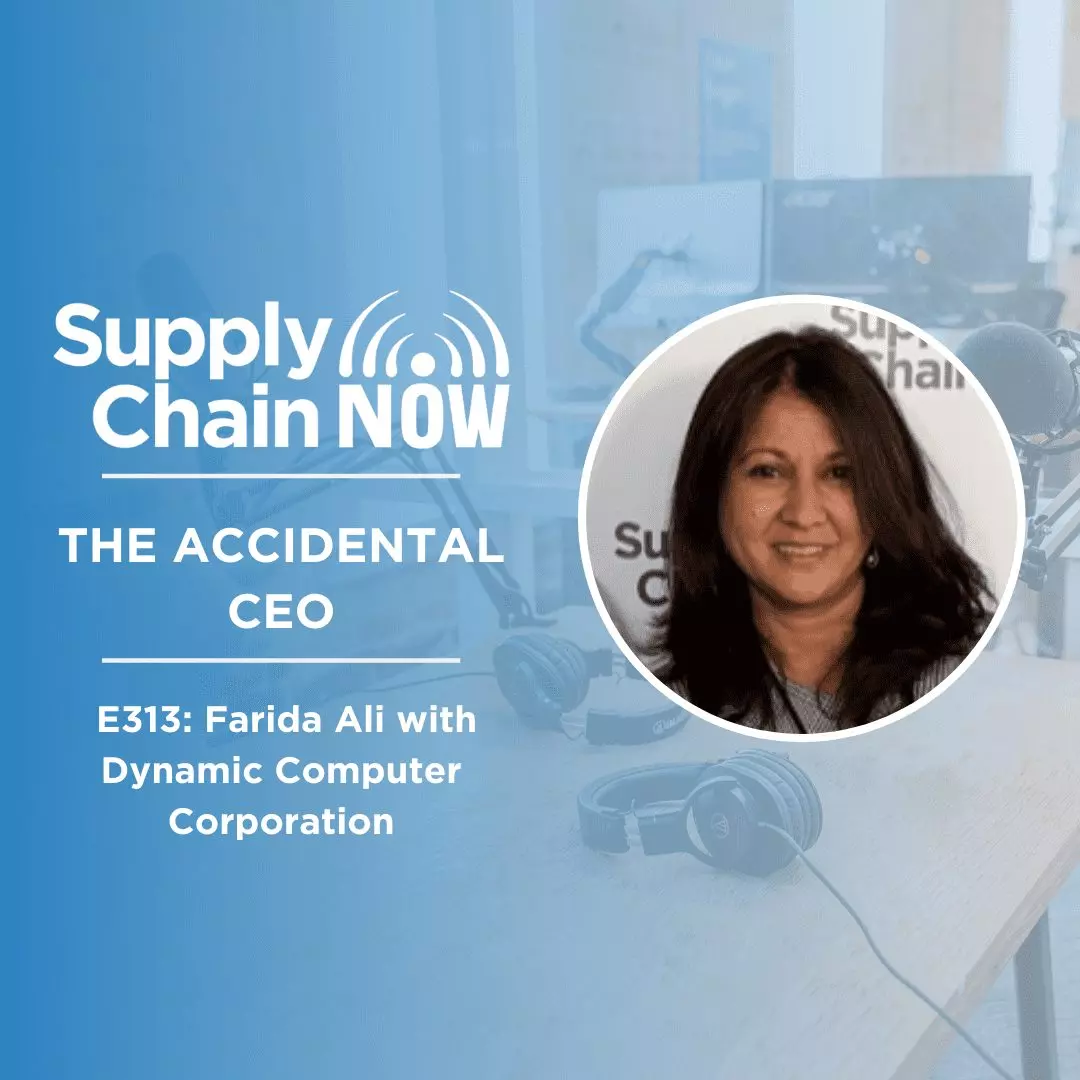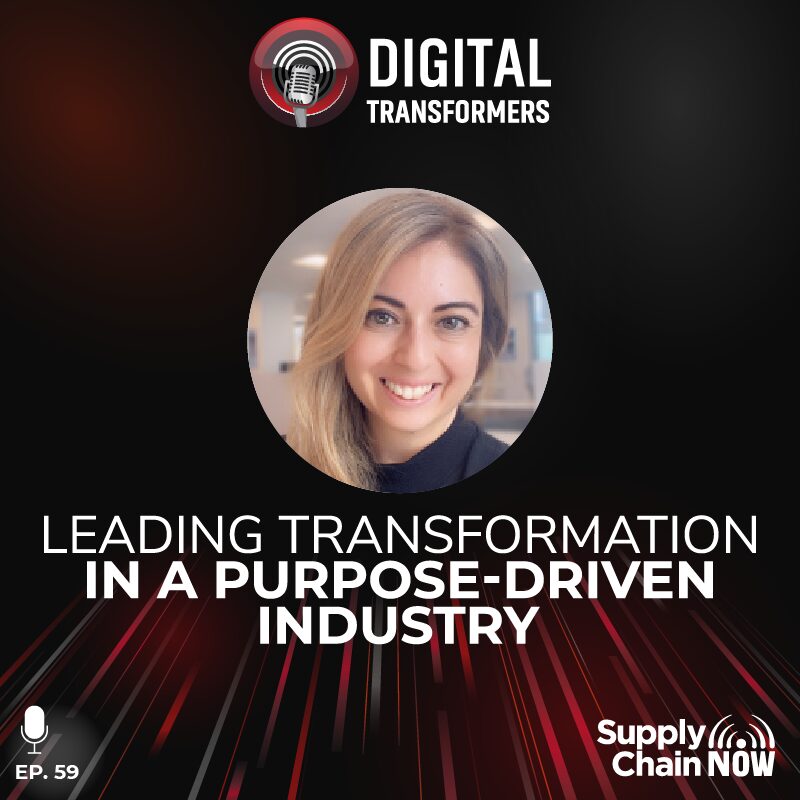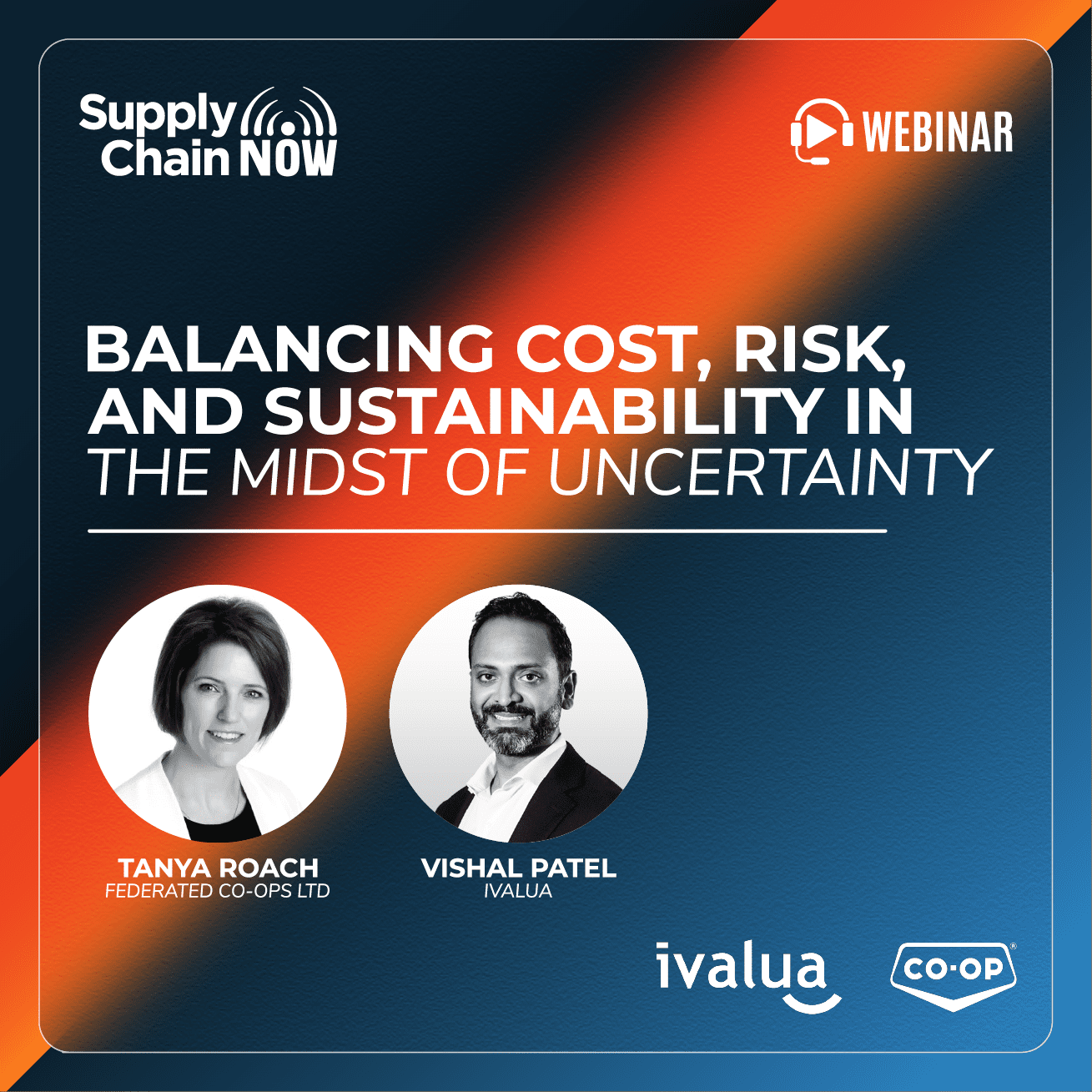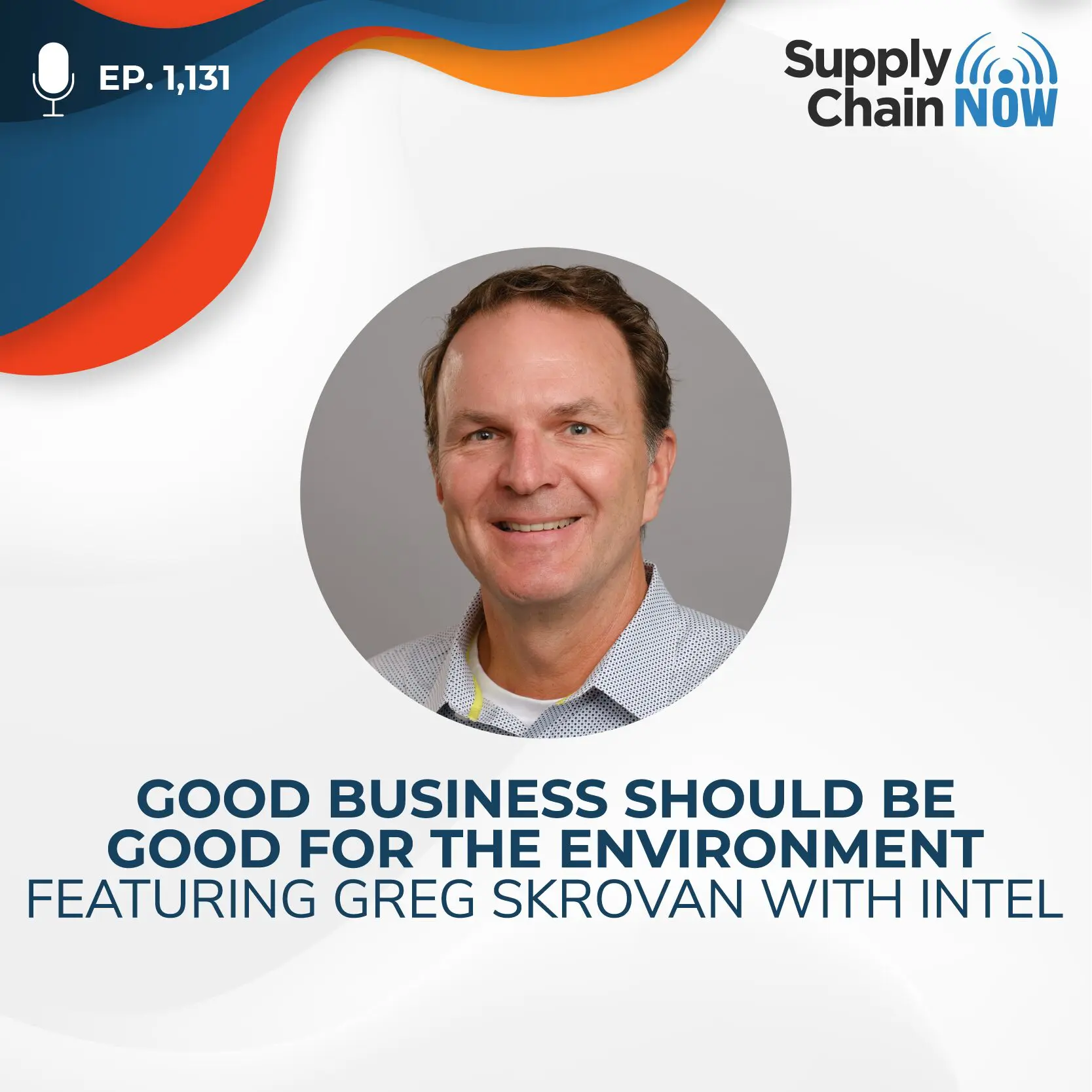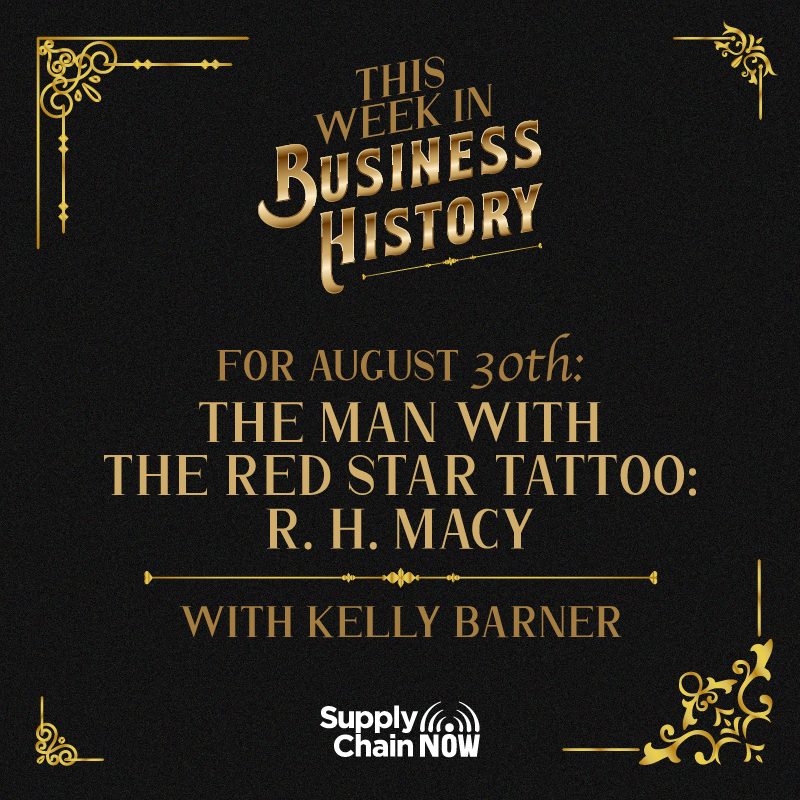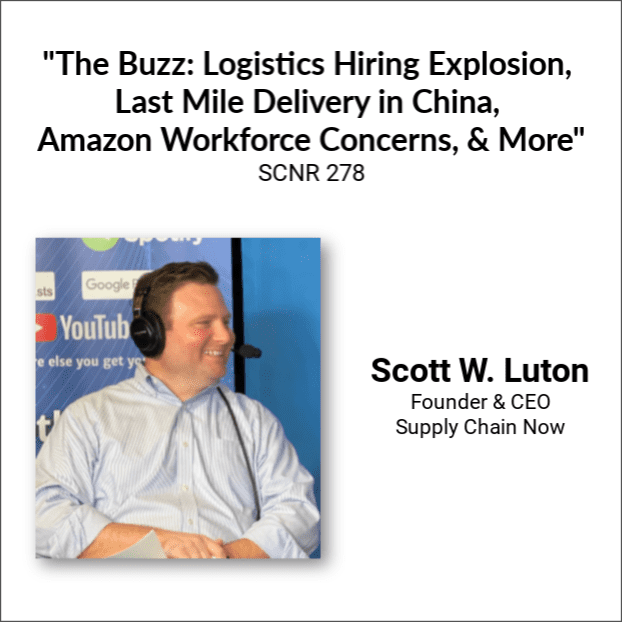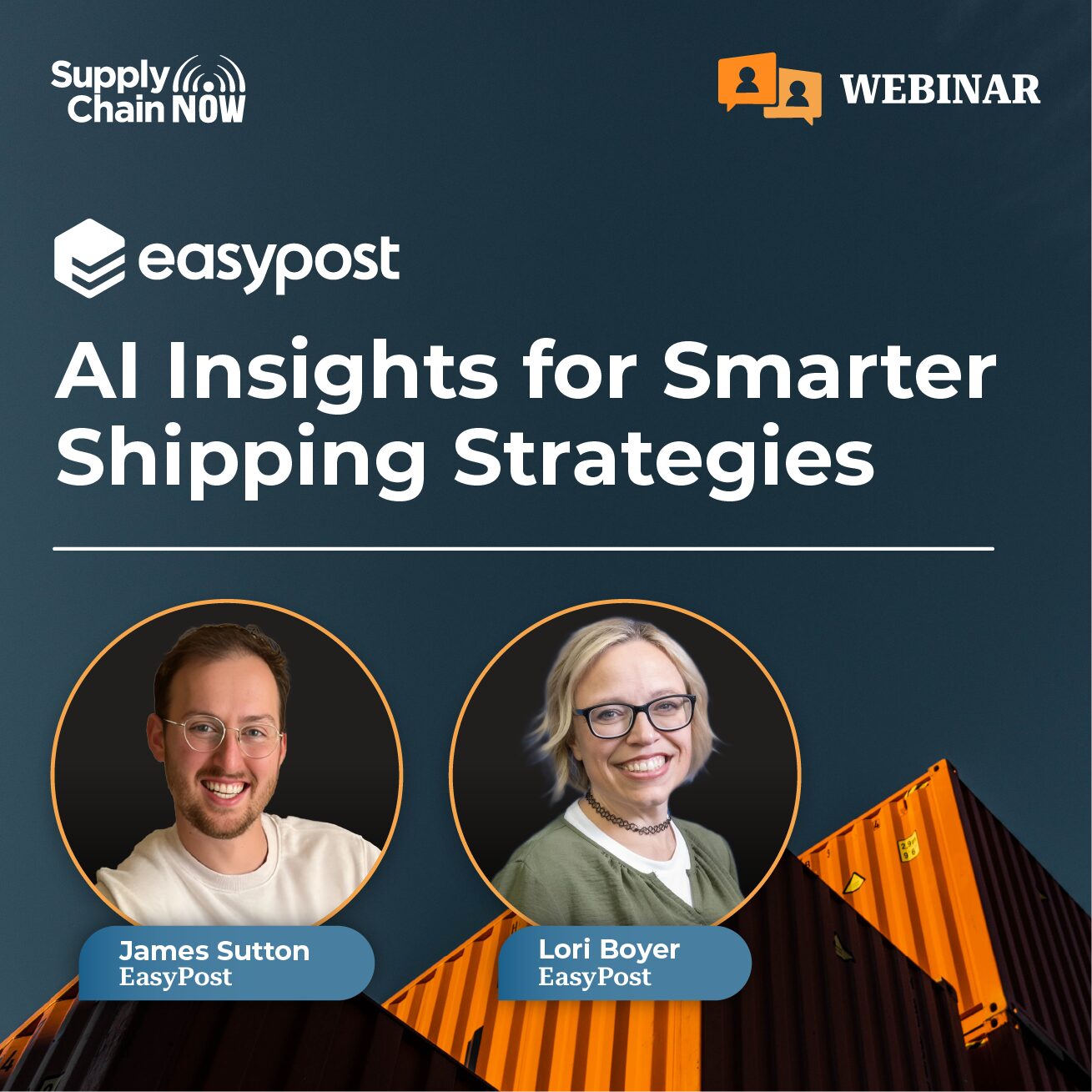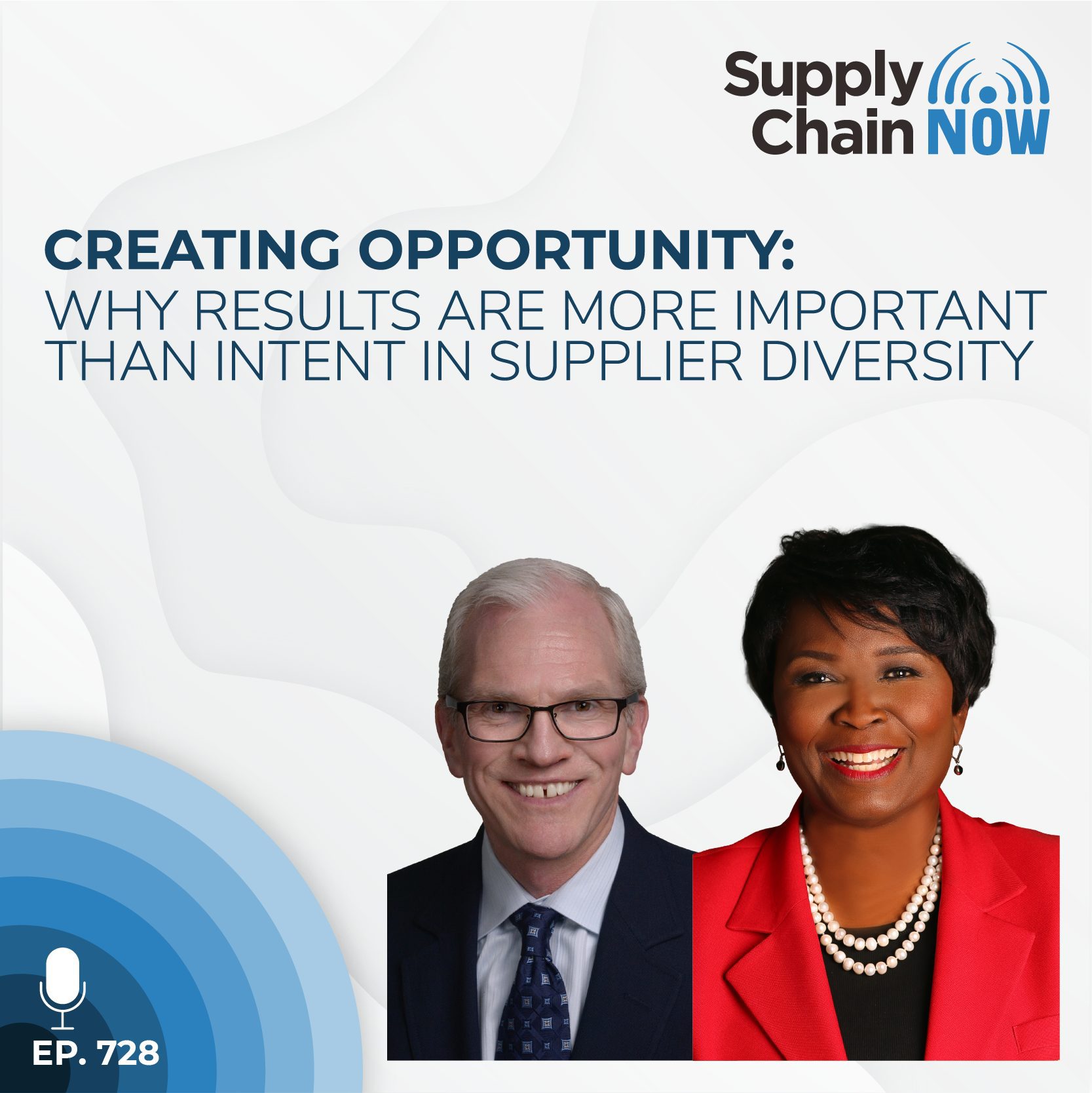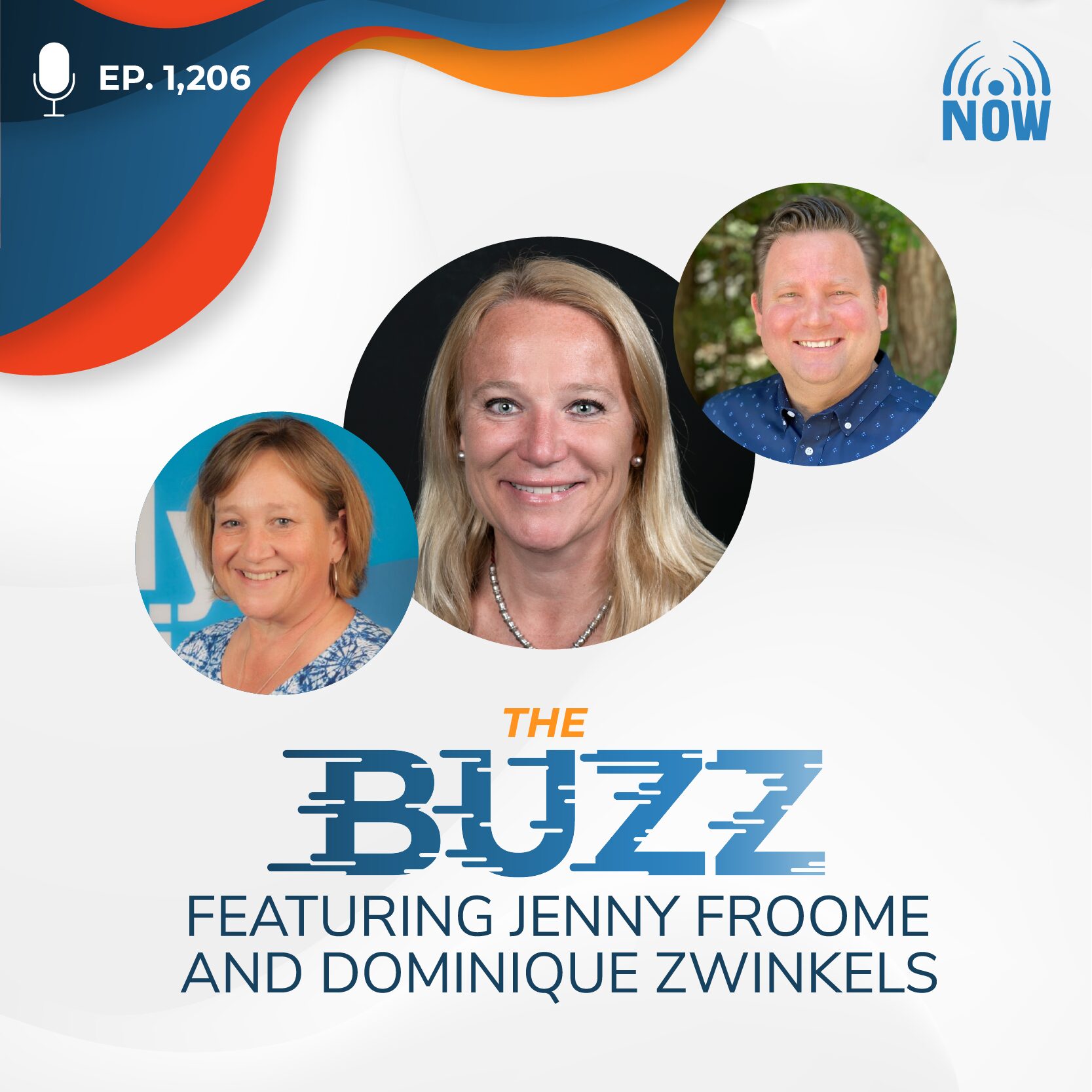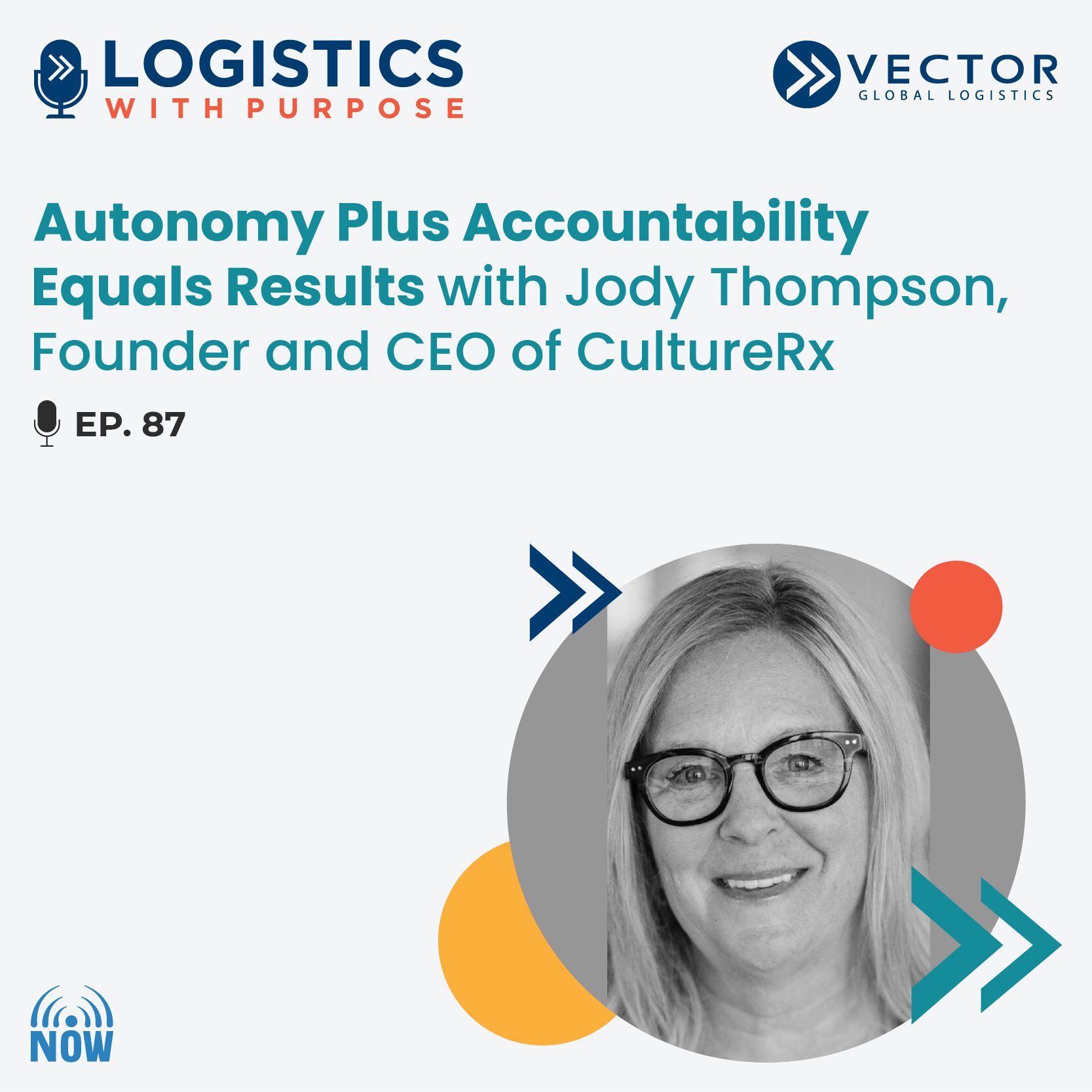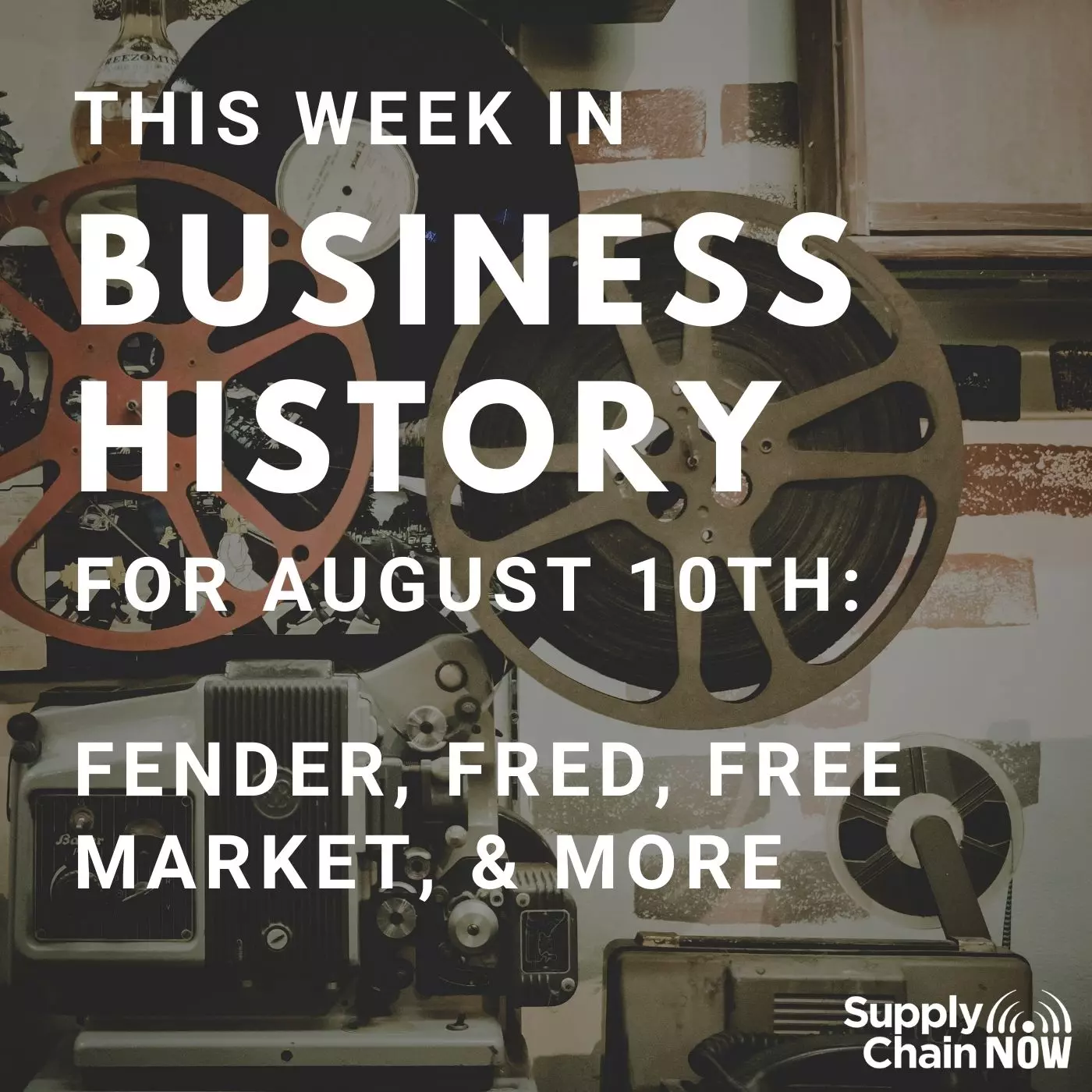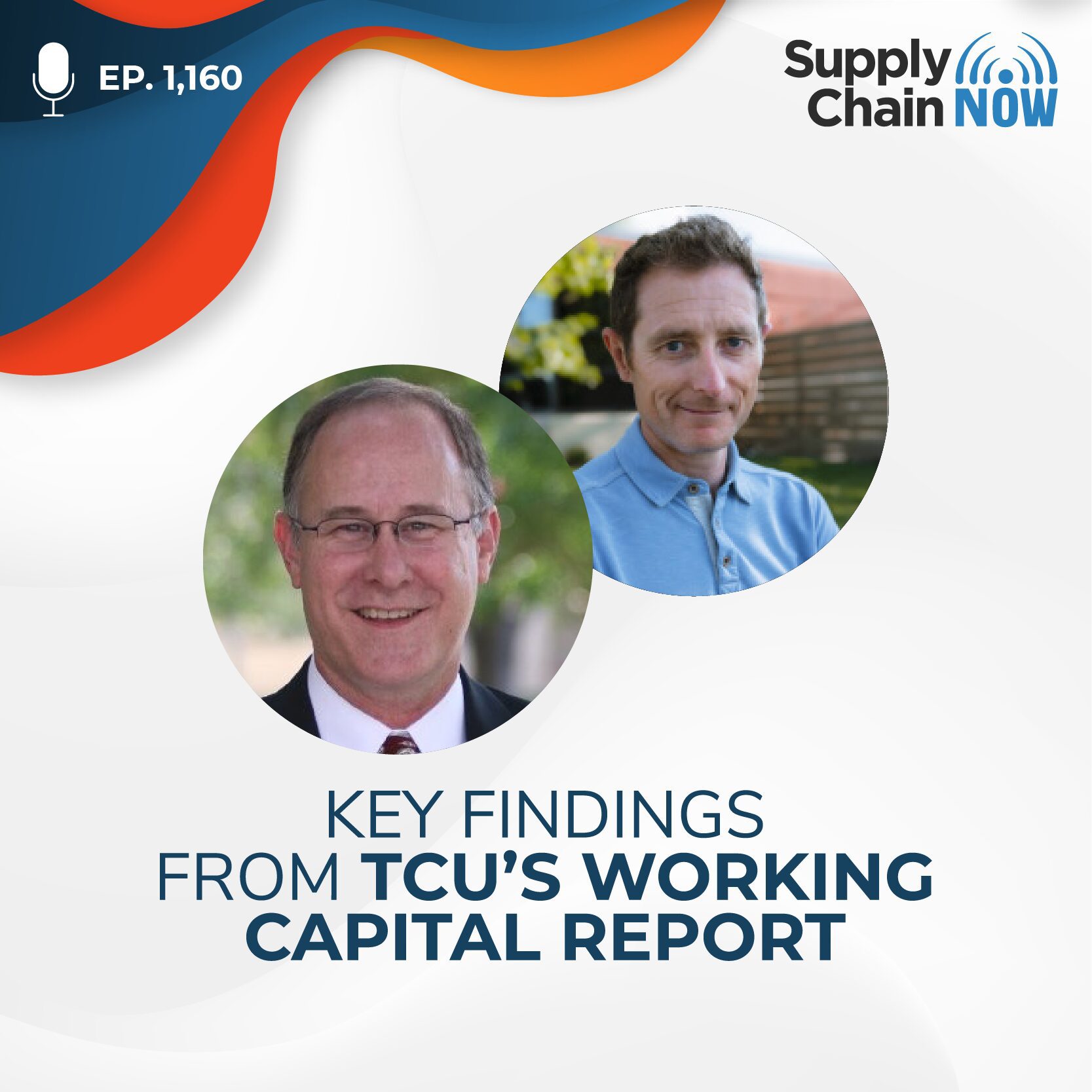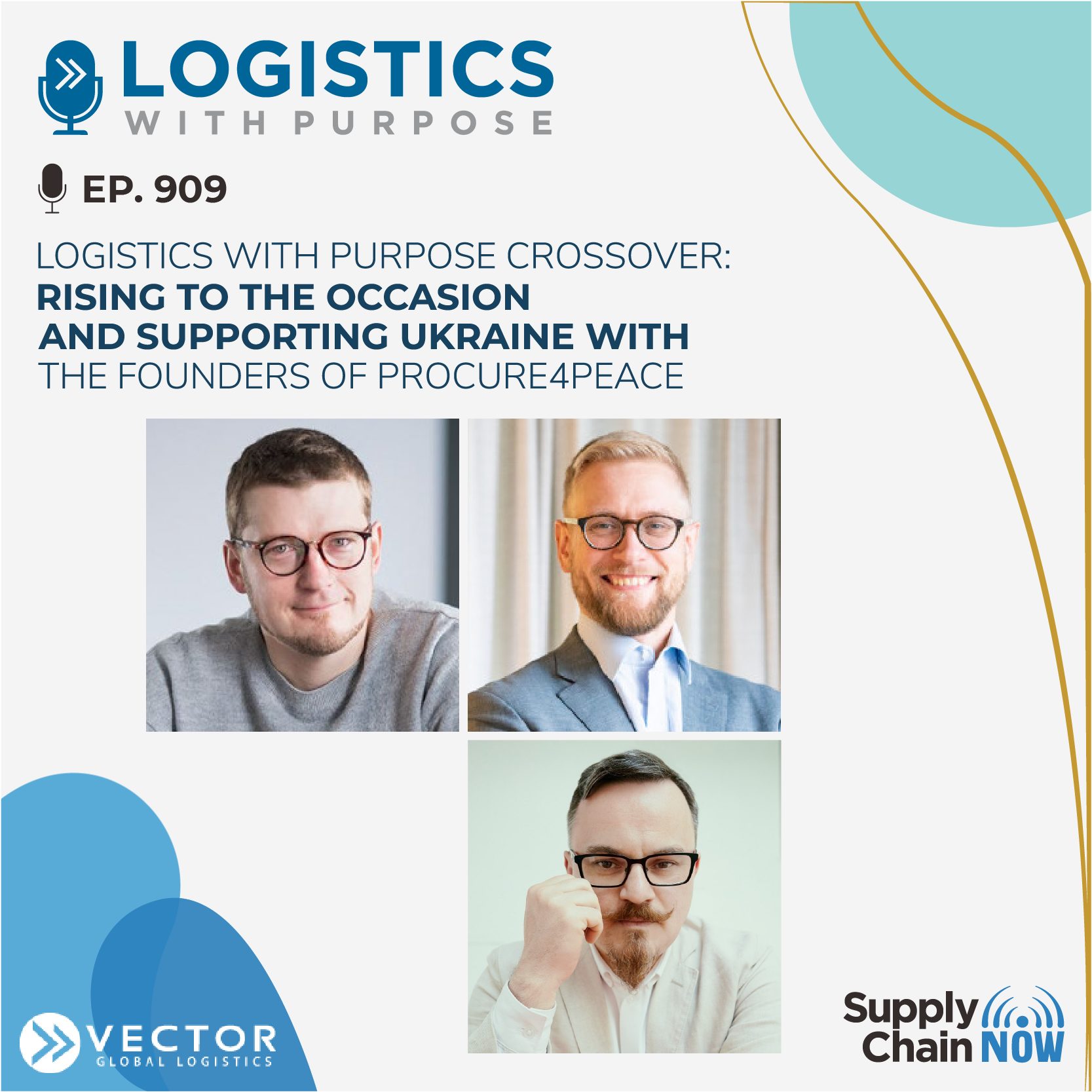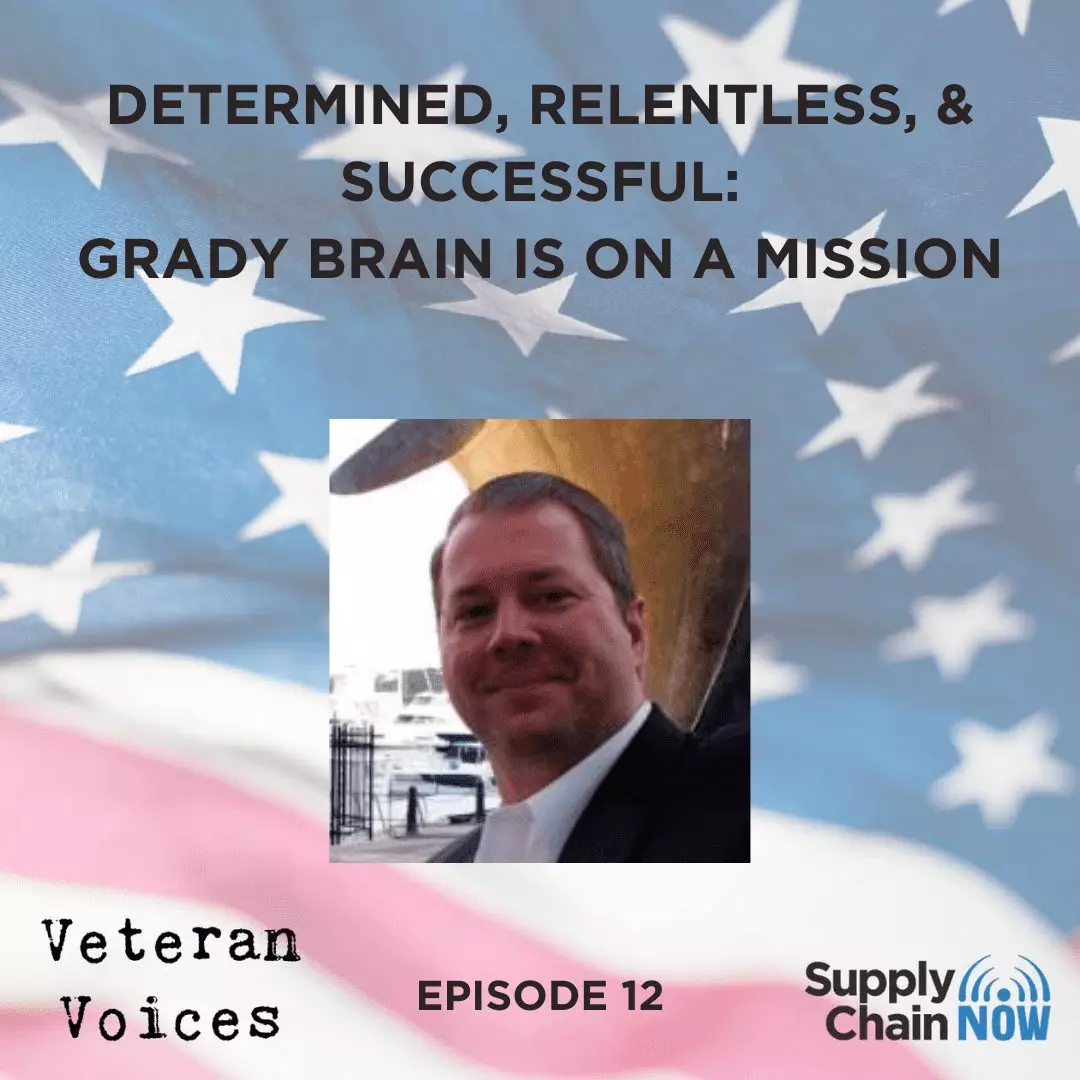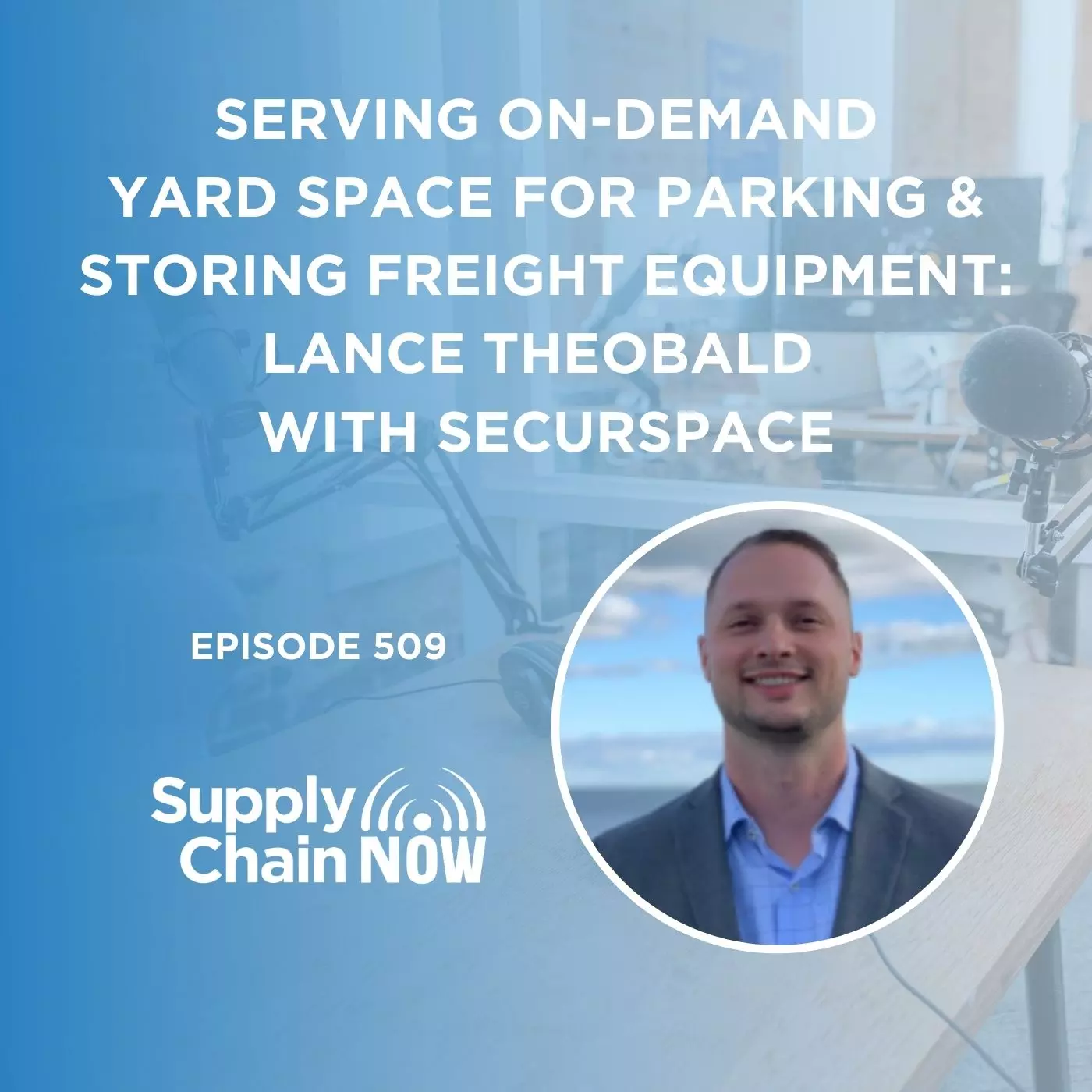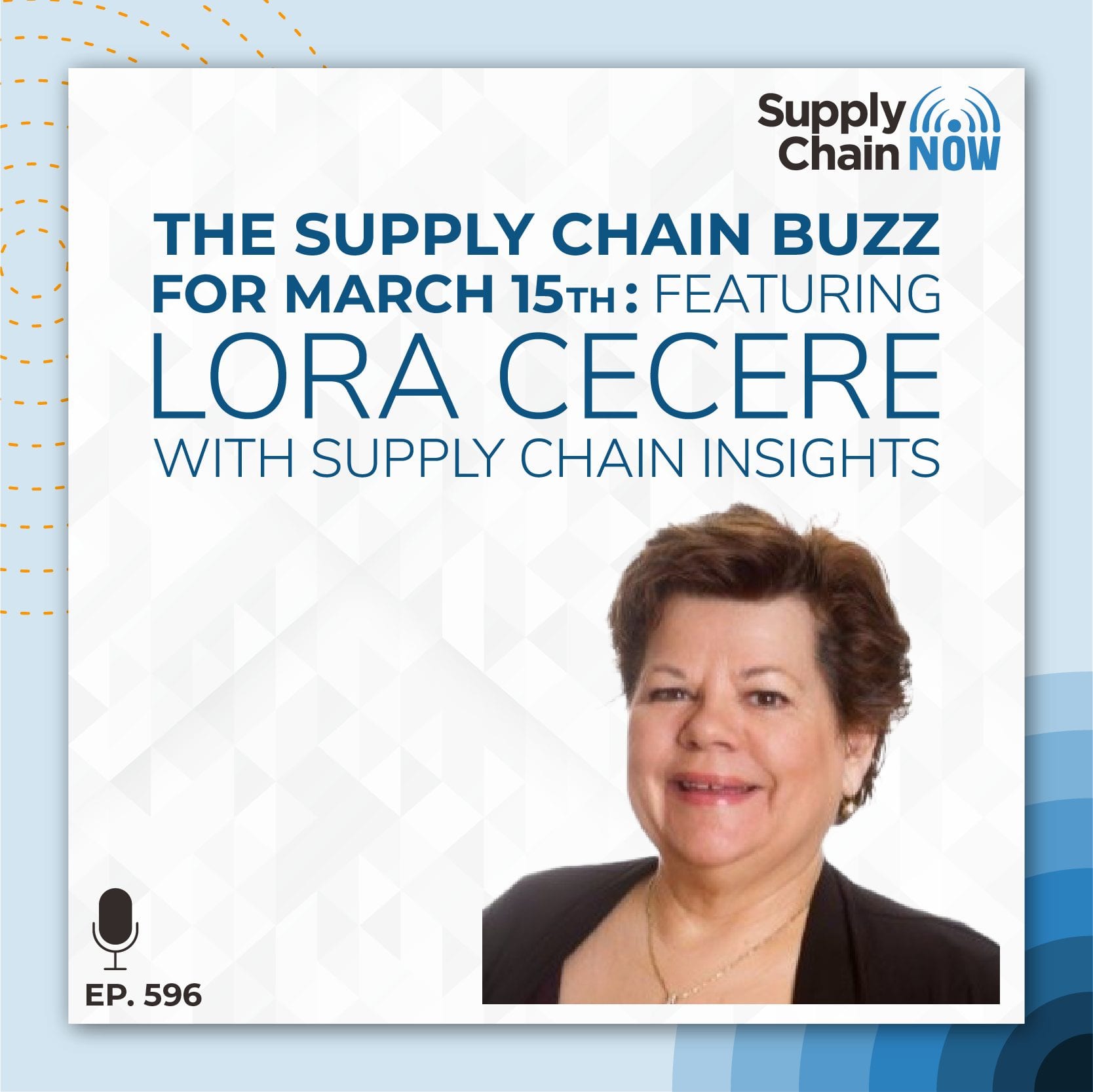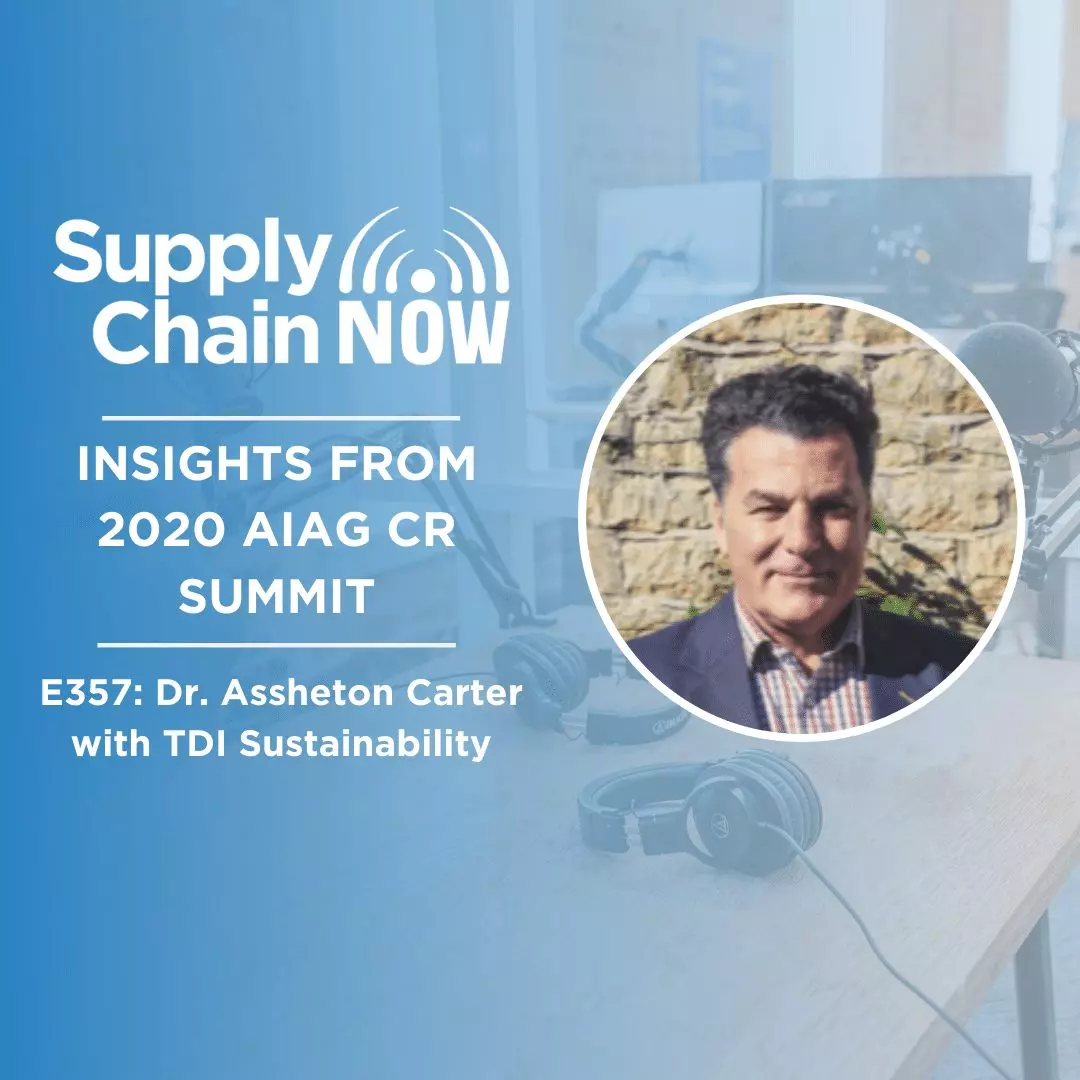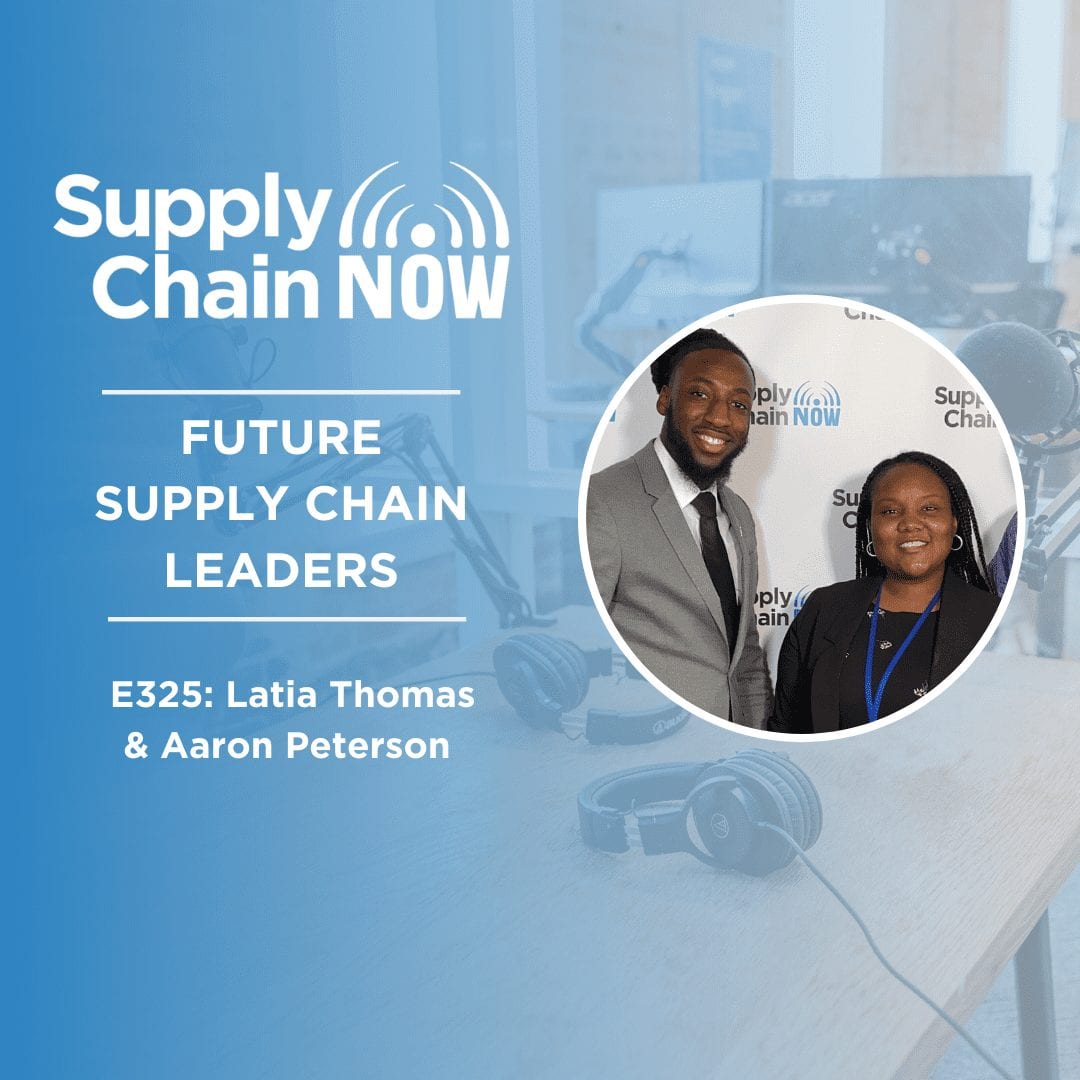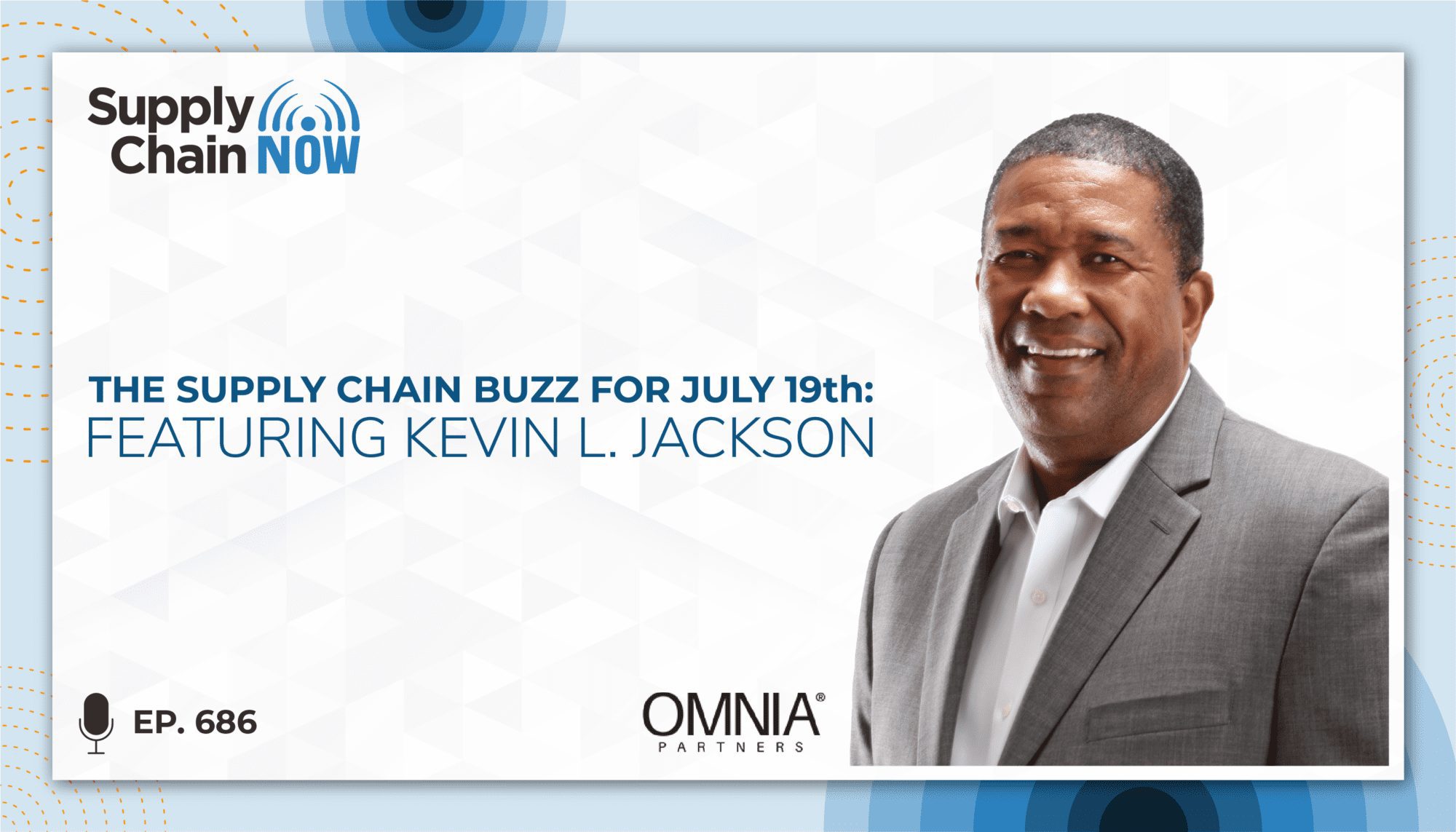
Episode Summary
“80% of understanding how to manage your supply chain is adopting and understanding and recognizing cultural shifts; only 20% is rooted in the data, analytics, and technology.”
– Kevin L. Jackson, Digital Transformers
The Supply Chain Buzz is Supply Chain Now’s regular Monday livestream, held at 12n ET each week. This show focuses on some of the leading stories from global supply chain and global business, always with special guests – the most important of which is the live audience!
In this episode of The Buzz, Supply Chain Now Co-hosts Scott Luton and Greg White welcome Kevin L. Jackson, Host of Digital Transformers, to discuss a number of real-life examples of what is quickly becoming a technology-enabled ‘arms race’ between the good guys and the bad guys. Protecting the custody, or provenance, of anything moving through the supply chain – whether digital or material – is an ongoing challenge, but it is one that companies have to invest in and continually innovate if they are going to secure their assets.
To cover this week’s top stories, Scott, Greg, and Kevin put their combined experiences into the ring to discuss:
· The surge in fraudulent and counterfeit products available on the market as a result of unmet, pandemic-driven demand
· A vote to approve an FCC program that will ‘rip and replace’ all Chinese telecommunications equipment from U.S. networks for the sake of national security
· How large consumer brands, like P&G, are leveraging the advantages of AI to drive product improvement – that is, if they can gather data that will be representative in the wake of the pandemic
· Whether domestic production of the chips that are embedded in so many consumer products will help address the production shortages hitting manufacturers
Episode Transcript
Intro/Outro (00:00:03):
Welcome to supply chain. Now the voice of global supply chain supply chain now focuses on the best in the business for our worldwide audience, the people, the technologies, the best practices, and today’s critical issues. The challenges and opportunities stay tuned to hear from those making global business happen right here on supply chain now.
Scott Luton (00:00:31):
Hey, good afternoon, everybody. Scott Luton, Greg White, and Kevin L. Jackson with you right here on the supply chain buzz on supply chain. Now welcome to today’s show Kevin, Greg, how are we doing this morning?
Kevin L. Jackson (00:00:44):
Well, looking good from the day. Say how are you doing down there? And Alana pretty good. It’s a little rainy down here, but a pleasant, pleasant. Oh, the grass is growing. That’s the good news when it rains every day. And you know when to set your clock to 2:00 PM, although it started pretty early today, I guess the storm came through the DC area last week, I guess it was. And, uh, that was torrential real short. Yeah, it was very short. There’s no
Scott Luton (00:01:22):
Shortage though, of news and stories and developments that we’re going to be working through here today. Oh, I see all this $600. Oh gosh. Plenty of practice for sure. But the bus today, it’s important to share with you that the bus today, of course, we go live every Monday at 12 noon Eastern time to talk about some of the biggest issues, new stores, you name it, taking place across global supply chain, really global business. And today our show is powered by our friends over at Omnia partners. Greg they’re reshaping the future of purchasing, but I would, as I shared last week, they’re already starting to shape the current state of purchasing your take-home Omni, our friends on the partner.
Greg White (00:02:13):
Yeah, well, I mean, first of all, Kevin Heath, uh, you know, he, he shared a lot of leadership at Georgia Pacific before, uh, going to Omnia and has brought a lot of vision to that company, not just as a group purchasing organization. And we’ve talked to our, our Slonen who, as I say, was born for this. I wouldn’t want him to have to negotiate against that guy, but, um, but fortunately it’s not really an against thing. That’s the beautiful thing about the culture of this company. They bring all these companies together, they power up their negotiating, um, power, if you will, and, and help them make better, more sustainable deals with what the companies are dealing with. You know, the other thing that they do is they really are strongly embracing technology because our friends at Verisign, which nobody can see, but that’s the shirt I’m wearing, uh, are doing some work with them to kind of, you know, improve how companies network with their suppliers and even their customers. So it’s, I mean, it’s a very powerful vision. It’s not your grandpa’s GPO. Well, right?
Scott Luton (00:03:22):
Yeah. They work with lots of movers and shakers and speaking of leveraging technology, Kevin, uh, that that’s table stakes these days. Right.
Kevin L. Jackson (00:03:30):
Well, I see one of the things Greg was talking about is companies can’t operate independently anymore. You have to, first of all, you’re operating in a global environment, whether you target that or not, right. If you’re on the internet, you’re in a global environment and you are, you are not only competing with other companies, but you have to partner with other companies. So you have to be in an ecosystem and, and the, the, you, you have to operate like a pet, you know, Wolf pack. There you go. There’s a Wolf pack ecosystem. And when you have, uh, organization like Omnia partners, uh, you know, behind you, uh, supporting that Wolf pack, Hey, you’re powerful.
Scott Luton (00:04:19):
So not only is today’s show power by Omnia partners, but, uh, maybe power by the NC state. Will my friends there as a Clemson fan, that’s been a incredible robbery going back. It used to be called the textile bowl in football at least, but I digress. That’s true. All right. So let’s do this. I want to, let’s say a load to a few folks, and then we’re going to talk about, uh, three upcoming events, including ones hosted by our friends at Omnia partners down in Miami. Um, let’s start let’s, let’s say load a cow Garcia, uh, tuned in, I believe in the west coast. I think he’s in the Seattle area. Kyle spent a long time. Hope this finds you well tuned in via linked in. We have Eric Toone Eric Canepa maybe Canada properly tuned in via LinkedIn. Great to have you here. Tell us where you’re, where you’re tuned in from to, uh, some, uh, seven-ish Savannah tuned in via LinkedIn. Great to have you here. All right, Kevin and Greg, we have Kelly
Greg White (00:05:18):
Bros are watching. We’ve got to step it up. Nice. Of course. Hold on. I’m going to sit up straight. My chair,
Scott Luton (00:05:26):
The merits and Geli, um, hoses of DAPI and host and founder, uh, managing, um, owner over at, uh, buyer’s meeting points. So Kelly hope this finds you. Well, Tom Holden is back with us via LinkedIn. Hello, Tom must be from Texas. We’ll see Tom, tell us where you’re dialed in from,
Greg White (00:05:45):
Hey, we say howdy in Kansas too. Oh, that’s right. Okay. Except in Kansas, it’s had it
Scott Luton (00:05:51):
Absolutely every day. So Peter bullae, I hope this finds you well. Hey, thanks for your message earlier, really. Sorry about, um, the loss of your friend. Um, Peter had a, a friend of his, uh, lost his battle with cancer and he shared with us earlier today. So all thoughts and prayers with that individual’s family. And of course with you and all your friends as well. Um, let’s see here, of course, clay Phillips and Amanda and Jayda and Allie are kind of behind the scenes on the production side. Hello clay. Andy is back with us and even popping in his laugh strings pretty regularly here, tuned in via LinkedIn. Uh, great to have you look forward to your contributions here today. Claudia says great to see a grid only Greg, I guess Claudia.
Kevin L. Jackson (00:06:37):
Great. It’s great to see going have to step up the game. Come on guys. Claudia needs to recognize that somehow it’s a, it’s a Homeland thing. You can’t get there for me. Don’t even try. Okay,
Scott Luton (00:06:56):
Claudia. Uh, great to see you. Yes. Great to see you on supply chain now in a spaniel, uh, as during your interview to the day. So hope this finds you and your team.
Kevin L. Jackson (00:07:10):
You know, I just, I just completed, uh, and I fit a trip around Argentina, a beautiful country. It is, isn’t it it’s fast too. I think people underestimate just how big it is. Patagonia. Oh my God, just so beautiful. Beautiful. And probably a good thing that it was just especially this time of year, because you’re so close to that to Antarctica. Antarctica. Let’s jump on a plane. Let’s go. Let’s go soon.
Scott Luton (00:07:47):
Critique. Hello via LinkedIn. Great to see you back here on the buzz. Uh, happy birthday, Tom, by the way, hopefully enjoy that. Uh, the Shakespeare of supply chain, Greg and Kevin is back with us. Gregory. Great to see you here tuned in from the Caribbean. Uh, let’s see here. Uh, Claudia says coopertition is how collaboration will be done in the future. I love that phrase here. Uh, Rabbids XY is back with us via LinkedIn. Great to have you here. Uh, Rhonda is, Hey, Rhonda made it on time today, Greg and Kevin. Okay.
Greg White (00:08:22):
That’s a really hard time too. So we won’t tell the boss. Right.
Scott Luton (00:08:27):
And I got cause city wrong. South Seattle is Portland. I knew that cop. My apologies,
Greg White (00:08:34):
But we’re very familiar with both because it looks a lot like Seattle and Portland outside right now, as a good friend of mine said from Portland, if you don’t mow your yard in the rain, you won’t mow your yard. My father, my son lives in Seattle and it was like 127 degrees. Um, so, uh, I don’t know if they’ve had an heat wave this summer. Wow. Oh,
Scott Luton (00:08:58):
Fred is back with us, uh, and angry
Greg White (00:09:01):
Doc holiday of supply chain.
Scott Luton (00:09:05):
He’s your huckleberry Fred Tober. Hey Fred, I’m gonna pose this question to you. Uh, our mutual friend, Dr. Troy Montgomery. I spoke with him last week. We’re going to feature some UGA students and, and thought leaders. I’ll tell you that they are bright, uh, later this week, but I could have sworn, I saw you driving down the road the other day and that convertible, speeding around a curb. So Fred, let us know if you have a convertible, uh, and hope this finds you. Well, really? Yeah. I could have sworn it was Fred Tolbert, but he was not wasting any time or wherever he was headed.
Scott Luton (00:09:38):
Yeah, of course. Big show. Bob is tuned in with us as well. Ziggy Garcia is with us and many, many others. Great to have everybody here. Big show tune, uh, teed up here today. Sorry, we couldn’t get to everybody, but Hey, get ready. We’ve got six stores. We’re working our way through and we’d love to have your POV and, and take as we navigate through the stores across that are making up global supply chain today. Okay. So Greg and Kevin, I want to hit a couple of quick events and then we’re going to dive into the first story. So, um, want to make sure we invite everybody to join Greg and I in Miami as Omnia partners is hosting connections, 2021, right? They do this every year. Uh, and Greg, as we shared, I think last week with our audience, it’s free to attend for supply chain sourcing and purchasing leaders. You get keynotes, you get expos, you get networking. I bet you get some great food. As my hunch, Greg, we’ll see, uh, no doubt and a lot more 400 plus attendees going to be having a great time down to magic city at the event, uh, is what they’re projected this year. And we’re gonna be broadcasting live. Uh, in fact, the buzz on Monday, the 27th, I think is if that’s the right date, it could be the 28th, whatever, whatever Monday that is,
Greg White (00:11:02):
I’m checking right now, Scott can keep going. I’ll let you know, wonderful,
Scott Luton (00:11:06):
Uh, September 27th when we broadcasting the buzz alive from the event. Excellent. And then we’re going to be, um, conducting several interviews of, uh, some of the folks down there. Some, uh, some organizational leaders down there. So you can learn more about checking the link that’s in the show notes, but join us. You know, Greg we’d love when organizations invest in events like this and, and, you know, make it easy to, to be a part, right?
Greg White (00:11:33):
Well, I mean, we just talked about all the value that they bring as a membership, but, um, this is, this is an opportunity to learn about whether you are a member or not right to learn about GPS and how they can be most effective. And as Kevin wisely said, how to avoid going it alone. I mean, I just, you know, as we’ve talked to them over the months that we have talked with folks at Omnia, it really makes me wonder why companies, unless they’re very, very vast, right, right. DMTs and the, like, why would you go alone? Because this gives you equivalent power of that. Um, you know, it reminds me of, um, Scott employee leasing, right? Where you pull your employees with a couple hundred or 500,000 other people and get all the benefits of that and cost savings of that. This is very similar in a procurement thing. It takes a village, right, Kevin, but the question is, are you going to have some tubing sandwiches while you’re there? Darn skipping. I know, right where we at at blue Ridge, we have a bunch of customers in Miami. So I’ve been introduced to some very good
Scott Luton (00:12:48):
Looking forward to it. Uh, folks join us in Miami. In September, you can check out more information via the link and get ready for some tasted Cuban sandwiches
Greg White (00:12:58):
On that point, if you booked travel for that just yet. Not yet. Let’s talk about that offline, because we may want to go to the city of fountains before we go to the magic city. Let’s do it,
Scott Luton (00:13:10):
Did tour the port center too, but nevertheless, uh, join us in Miami, in September. Okay. Moving right along, Kevin and I are going to be hosting our friends from TCU and Esker on July 27th, which is gosh, next week 1:00 PM. Eastern time. How digital transformation not just accelerate your supply chain, Kevin, but strengthens it, right?
Kevin L. Jackson (00:13:31):
Yeah. I’m, I’m really excited about that. You know, um, S-curve and their cloud platform really helps their clients, uh, just get the most out of their referral system by accelerating communications and being able to deliver visibility, both pre-sale and post-sale. So, um, this is going to be important webinars. You’ll learn a lot. And
Scott Luton (00:14:00):
So this is good. Love it. Um, join us July 27th for what will be a fascinating discussion. I’ll be taking my 17 pages of notes from this panel, for sure. And then finally, uh, really excited about this mini masterclass. This talk about home run panels, Maria crystal, Peter, Rodney mark, all teaming up to offer some really free and, and, uh, practical, powerful advice for supercharging your career journey, finding a job, uh, advancing and promoting through your job, making an impact. Join us July 29th, uh, at 4:00 PM for that mini masterclass and really appreciate Peter and the whole panel here for taking time out of their busy day to help folks. Okay. So Kevin and Greg, I wish I could, um, I wish Fred had shot me this in a different place, so have responded to my convertible question and he sent me a great picture that I can’t share here just yet, but it’s like a scene.
Scott Luton (00:14:59):
I remember the end of the animal house movie. Uh, John Belushi drives off with his date in a convertible near the end of the movie. He’s just 69. Yeah. That’s what he shares. He’s confirming. Maybe he’s got a convertible. Okay. Folks, we got to get down to the news of the day though. Are y’all ready to go? Yes, let’s do this. Let’s do this. Uh, all right. So I want to talk in this Forbes article. I want to talk about this really interesting article in supply chain, dive, where we, uh, Greg we’re revisiting some of the fraud and counterfeit issues that we’ve seen in the last couple of years. Um, especially on a fortunately in PPE personal protective equipment. Uh, so this article quotes, uh, legal counsel over at 3m, of course, a major player who stated quote, the pandemic has been a major driver of fraudulent activity in quote, uh, Homeland security to address this a launch operations stolen promise in April, 2020 to battle fraud and related crimes.
Scott Luton (00:16:02):
So, so here’s a few numbers that will add some context to just how widespread of a challenge we’ve got here with fraud and counterfeit. So over to over 2200 COVID-19 related seizures, that could be pharmaceuticals that might be masks, other things over 300 arrests and get this 54.3 million illicit proceeds revenues seized. So 3m, this is another interesting factoid. So 3m set up an anti-fraud hotline in March, 2020. Now you never know with these corporate, sometimes these big corporate initiatives, they kind of do it for four, um, kind of, uh, optics. Right? Great. Thank you. Great. That’s exactly what we’re looking for. But over 14,000 calls went into, you know, globally went, hit that anti-fraud hotline they have now for their part, especially when you think of masks. 3m is quadrupled in 95 respirators production. They’re making almost a hundred million per month now, but they’re still seeing, um, major, major increases in counterfeit 3m in particular PPE, right? Cause that that brands trusted brand, you put that brand on things and some folks won’t, you know, ask the extra questions. So unfortunately, you know, uh, that quote that’s often cited, don’t let any, uh, crisis go to waste and there’s different versions of that quote, but unfortunately the criminals are, uh, are following that same advice. So Kevin start starting with you, your take here and what we’re seeing, uh, in fraud and counterfeit. Well,
Kevin L. Jackson (00:17:41):
I think about frog and concert is that they’re getting a lot better, right? Because they, um, technology, you know, as rapidly improving for the good guys, but it also improves on the bad side as well. Unfortunately, the bedside can move a lot faster. So you have this constant arms race, and it all rolls down to, um, data, um, and trustworthy data, understanding the government has this big, know your customer, um, laws and requirements where you have to verify information. Um, and companies are getting, you know, fraud because it’s very difficult sometimes to get the information and verifying information. I know, uh, my company, uh, we actually were a victim of fraud and wasn’t an PPE, but it was in laptops and tablets where we got a purchase order that we thought came from the government. And it looked just like in government purchase order, it had all the correct information, the telephone, you know, everything looks correct. We went on the web and try to verify, and, and in the end it was fraud. It was fraudulent. Um, it’s, it’s hard. It’s really hard
Scott Luton (00:19:10):
Agreed. Especially, you know, um, you know, founders and entrepreneurs are already balanced in 20 things, right? And, and, and so many small companies, startups are being targeted as well. I was part of an organization and also, um, uh, was impacted with, with, uh, fraud. But Greg, what’s your take on this, uh, this new story where, where it’s everywhere?
Greg White (00:19:32):
Well, sadly this is a health and life saving based story, but frankly, this is not news. We’ve been dealing with the most unscrupulous nation on the face of the planet for decades, China. And all they have to do is, is, you know, if 3m is outsourcing their, their manufacturing to China, all they have to do is put it in the three inbox and route it through different channels, right. Or, you know, however, they, they manage this, uh, much like Kevin. I worked for a company back in the nineties, early nineties, uh, just over two decades ago that, um, that we made tools in China in the same factory that craftsman made their tools in. They were substantially the same tools with our name crew line stamped on them instead of craftsmen. And we would routinely find them that precisely molded tools at flea markets and other stores, um, you know, to the same with, with our names, Stan stamped on them with much, much cheaper metals in them.
Greg White (00:20:42):
So, um, as you know, as Kevin said, it is an arms race because look, these people are there. They know they’re going to get caught up on and they’re already planning for their next level of depth of crime. Right. I mean, we’ve seen this, it’s a very difficult thing to keep up with. Um, I think some of the technologies that Kevin works with blockchain in particular, um, can help with verification of these sorts of things to alleviate some of this. Right. Right. And as you said, it does go to the trustworthiness of your vendors. It goes back also why companies need to be part of that Wolf pack. We talked about before with other companies you learn about him, uh, you know, if they’re trustworthy and, um, you know, it gets better and better. It’s harder for a counterfeiter or a fraudster to, uh, get inside the Wolf pack. Right. That’s right.
Scott Luton (00:21:45):
But you got to leverage that technology. In fact, uh, Jenny Froome and I are interviewing, uh, sheesh, uh, founder of Ben CU tomorrow, which leverages blockchain, did it really power visibility, and for a variety of reasons, visibility’s is so in demand. And this one of the ways we can put a big spotlight on these, uh, the fraud and counterfeit issues, we’re seeing, got to battle it with data and battle it with, uh, electronic, uh, spotlight, so to speak. Okay. So we’re gonna move right along. Uh, great reporting is always by our friends over at supply chain. Dive y’all check out that article there. Next up, Kevin, let’s see here we are talking about how the FCC is making big moves on what it deems to be a national security risk. So tell us more about this.
Kevin L. Jackson (00:22:28):
Well, first I need, uh, have the back office put some ropes around are great because this is gonna make him jump out of his chair, but you got Adam’s vote on Tuesday. The FCC, uh, fond allows the program to rip and replace all Chinese telecom equipment from the U S uh, networks. Cause it’s all a national security risk, Y counterfeits counterfeits, right. And Congress has already, um, and this, this is weird. They’ve already put money into this and it’s a $1.9 billion to reimburse companies that have bought Walway or ZTE equipment and deployed it into networks because now they basically have to rip out that equipment and replace it with, uh, uh, product from, from other countries now, um, get this to be eligible for the fund. The, from us telecom firms have to serve 10 million or less or fewer customers. Typically you would see this and it’d be gone to the big guys. Right, right, right. But this has gone to dust small guys, right. This is the I’m going to jump out of my chair.
Kevin L. Jackson (00:24:02):
These are the rural telecom operators. Right. Um, and why them, because they had less money. So they were buying the cheapest product on the market would happens to come from Chon. All right. Um, so these eligible companies can, uh, actually get reimbursed for ripping out the, uh, the Chinese, uh, product. And it’s, it’s it’s high level, right. This is a national security threat, right? Yeah. Well, I, I don’t think we can argue that it’s a national security threat. Right. And I’m glad to see that finally, Kevin funds are going to people who really need it.
Greg White (00:24:51):
And, um, and I wonder then, and I don’t know if you have any insight here, Kevin, on how these companies might be able to sustain that. Okay. Cause they’re going to get this money to replace these, the, the, the product from these bad actors, but they’re going to continue to have to upgrade and expand their networks and things like that. Is there any provision for that in the future, or is there any way that this equipment is made more economically outside of China? Well wonder the another cat that the FCC is doing is that they are putting in regulations for, uh, securing the supply chain and our friends over the telecommunications industry association actually developed a ICT specific standard for global supply chain security. And, uh, uh, TNS is a same shameless plug, heavy blockchain enabled, uh, capability that digitizes or tokenizes the mobile equipment, uh, identifier called the, and I recall that the electronic or enhanced in the IUD that would prevent counterfeits and you’re also, um, monitor software that’s associated with the products so that you can know if the, um, if the software is original software a little bit has been modified or changed.
Kevin L. Jackson (00:26:34):
And if you’re anyone, if you’re interested in the, uh, supply chain security, um, I’ll, uh, have the, uh, back off this, um, put the link in the thread, count me as interesting.
Greg White (00:26:52):
Well, let’s seriously. I think we ought to talk about this offline because this, I mean, this is a problem that we need to solve is Scott, you know, my favorite word, provenance, provenance, and the security of these products. I mean, this is two articles in a row where essentially we are talking about the same thing and we are hearing about this more and more, um, which is why I think such a natural link Kevin, with what you have done for so long digital transformation and supply chain. I know you didn’t see it at first, but it didn’t take you long to figure it out. That that is an important part of this and not to digress too far. Right. I’m seeing a lot of supply chain, a lot of universities tying their supply chain practices into digital transformation practices and vice versa, right. Because it is so such a necessary component of provenance, of security, of chain, of custody, of, um, of status of the goods, you know, was it turned upside down, did it, did it fail to maintain frozen temperature, things like that, all be handled and managed with blockchain. So, so the good news we’re going to have to talk. So we’ve got the Tia,
Scott Luton (00:28:15):
A webinar in the comments sign up for that webinar. We enjoyed hosting a similar conversation a month or two back, uh, involving Kevin TIAA is a great group doing a lot of good work. And certainly they’re the voice of the, um, uh, w w what’s that industry. Yeah, I C T I always forget that acronym. Um, so y’all check that out. Um, and then I to also share, thank you, Tyrone says this course continues to get better. Appreciate it. Great to have you here today. And as I mentioned, uh, clay and the team dropped a link in the comments. Hey, um, so to wrap this up, the story up, uh, we’re talking about the FCC finalizing this rip and replace program, uh, via C in the BC. And I gotta tell you, Kevin and Greg, when I saw this picture, I was like, ah, that’s such a pretty view, but there’s probably a, a portion of our global community. It may look at that tower and may give it that kind of that the sidewalk and how 5g, uh, some
Greg White (00:29:26):
That’s right. That is right. But, uh, that is true. I think about when I was a kid, when my, my great uncle had a phone in his car, it was some sort of fancy two way thing, but I mean, it wasn’t a phone and that was in the seventies. So, I mean, it’s not like it’s not like we have not been broadcasting over the great Plains, our beautiful Hills, and, you know, as much as we want to get away from it all don’t we still want to be able to see the supply chain buzz when we’re in rural west. Right.
Scott Luton (00:30:01):
Greg, I thought you were going to say something else. One of our favorite phrases around here,
Greg White (00:30:05):
You can’t wait, you spill it. You can’t outrun radio or whatever, the version, I guess, internet run radio. That’s
Scott Luton (00:30:14):
Right. Um, okay. We’re gonna move right along, uh, worker talk next about how this talks about big time brands or Proctor and gamble is shedding some light on how they’re using artificial intelligence to drive improvements. And what’s interesting about this story, Kevin, for you elaborate more on it is they had this map from while I was reading, they had this big master plan ready to go, and then the pandemic hit. And then all of a sudden their historical data lost a ton of its value. They had to rebuild it, but T tell us more about this. So,
Kevin L. Jackson (00:30:45):
You know, the, uh, you know, Proctor and gamble a huge company, right? They, they, they have to keep track of so much stuff, right? They are big on data because data is used to inform how to production lawn work. You know, you can’t make too much Clorox. Well, that’s not possible. Right, right. But you need to know what your demand is so that your production line can match that, or you lose money. Right. Um, so, uh, but when the pandemic hit that the demand for things like toilet paper and hand sanitizer just went through the roof, uh, and there was no historic, uh, precedent for it. So before the pandemic, they were looking at the past, what happened in the past, you know, they had all that data. They created all these algorithms based upon that data. Um, and, and in 2020, they were ready to start using this advanced technology.
Kevin L. Jackson (00:31:46):
All right. And then when the pandemic hit, everybody was saying, yeah, we’re Procter and gamble. This bug, we, we knew this was, we knew we have all on beta. We have our algorithm, artificial intelligence is ready to make this happen. And then it was in bell paths and it really didn’t, um, help them, uh, they recovered. But, but in the end, they determined that it was all about cultural shifts. It was all about the people and understanding what was important to them, right. The algorithms didn’t know how important toilet paper was, the people, how stupid can an algorithm be. But 80% of the text of understanding how to manage your supply chain is adopting and understanding and recognizing cultural shifts. And only 20% is Robert in the data and the analytics and the technology. So it’s sort of a different, is it different? Do gold technology go beta, but you really need to know about the people. Yeah. Okay. That’s, that’s critical. So they, they, they really, in order to solve these real world problems, you have to understand culture society. What’s important to them. Uh, if you understand that, then you can use analytics and technology to be bet.
Scott Luton (00:33:28):
Yeah. Effectively. Um, so Greg, I bet you are chomping at the bit to talk any, anything AI, for sure. But beyond that, what’s your take care of the story from ProctorU?
Greg White (00:33:40):
Well, before we talk about AI and precisely to Kevin’s point, and just to tie that into something I’ve been saying for decades and researching for decades, we are forecasting the wrong thing and supply chain, and that is the fatal flaw in supply chain. And that’s why we didn’t predict or pick up fast enough on the great toilet paper shortage of 2020. We are predicting items. The data that Kevin is talking about is how much toilet paper has sold in the past. All right, get ready yet. Past performance is no indication of future value, right? And I, and I am, I have created this term for using historical data to try and predict the future. It’s not forecasting, it’s post casting. We’re trying to look at the past. We’re trying to look at the items that sold and, and predict the future. What did this item do last year?
Greg White (00:34:40):
You know what it did, it did exactly what it’s doing right now. Nothing it’s sat on the shelf waiting, waiting for, as Kevin has talked about a human being to act on it. So we are forecasting items when we should be forecasting consumers. And that is the, that is the critical transformation that needs to occur in supply chain, in order for us to be able to do the forward-looking the real forecasting that Kevin’s talking about. So I can go into credible depth on how to do that, but that is, that is the fatal flaw. And that is the kind of data that by the way, is available, thanks to e-commerce and all of this data that’s collected on our phones, on our, um, on our computers, on our drivers, dishwashers, everything right. The chip that got put in when I took the shot, all of them, that’s how bill gates knows where I am. Um, but you know, it is that data that’s so valuable because we, what we are predicting is what, what we should be predicting is what we will do next. Right? Yes. Right. And that is the only way in which we can truly transform supply chain is to stop looking to the past for our accused, because as Kevin said, the history of what Proctor and gamble had is absolutely useless. 100% look at those indicators.
Kevin L. Jackson (00:36:18):
It’s 80% useless. Yeah. That’s true. 80%, 80%. When my dad says more than 80% of putts that don’t get to the hole, don’t,
Scott Luton (00:36:33):
We’re going to have a moment there in a rough and tumble. But, um, you know, I mean,
Greg White (00:36:38):
I think that, I think that’s a good point. We have to shift what we’re forecast. Yes. I agree. Right. What, we’ve the way that we’ve thought of forecasting in the past is we use this historical data as the holy grail is the top of the funnel. And then we try and layer it in with additional data. But I like to think, I think of it inversely, the historical data that is PR does probably provide 20% and sometimes even more, it’s not, it’s not our initial go-to if you think about it, it’s not the cream on the top of the barrel. It’s the sludge at the bottom of the barrel, that if we can’t figure out what human being, some way to predict what human beings are going to do, we have to resort to looking at what historical data we have in the past on items. Right? So real time data is telling you what the cultural change is happening right now. That has to be your lead indicator, right? Moderate that with your historical data.
Scott Luton (00:37:43):
All right. Let me share a couple of comments here from our friends, a big show, Bob Bova says culture, creativity and human inner communication is critical to evolution. AI is only as good as their programmers. Claudia says human behavior prediction is the new supply chain challenge. And Rhonda like that idea posts, casting human behavior. I like that. Rhonda and Greg. Okay. So what we’re talking about here, folks, just to kind of close the loop here, we’re talking about how P and G is leveraging AI to really do some big things and, and, but differently than they had initially planned, thanks to of course, a pandemic. So check that out. That is, um, that is a new source for me, Kevin. I think that is a venture beat is what VB stands for. Yeah. I’ll check out that article as well. All right, Kevin, we ready to move right along.
Kevin L. Jackson (00:38:34):
Absolutely. So, all right. So fast, is that clock running fast?
Greg White (00:38:40):
Yeah, that
Kevin L. Jackson (00:38:42):
Was our Kevin. That was our most violent agreement so far. So good. Greg
Scott Luton (00:38:49):
Mentioned, Greg mentioned toilet paper a second ago. I believe that computer chips is a 20, 21 version of
Greg White (00:38:55):
Toilet paper.
Scott Luton (00:38:57):
We’re not going to stop talking about it. And for good reason, because just as important as TP is computer chips are in everything that, that Kevin and Greg just mentioned. So I really enjoyed this article. This is, this isn’t straight up news. This is one of the, um, the brand voices that you can find in force. But a lot of times these articles are really good. Like this one. And this is from our friend at, uh, at SAP. Richard Howells is the author of this article. So check out a couple of his highlights, a lot good factoids, and this article had lots of them. So did you know, in a typical new car, you can have more than a thousand computer chips, right? Uh, did you know that in 19 90, 30 7% of all chips were made right here in the U S in 2020, just 12% of the chips are made here and the major players as y’all might imagine, you might guess Taiwan, you might guess China, but South Korea is, is also in that, in that top tier of chip manufacturing.
Scott Luton (00:39:54):
Uh, did you know that normal lead normally times for chips due to their complexity is already 26 weeks. So we’re not talking to, uh, trying to disrupt two or three week lead time. They’re already because of all the complexity involved long. So this article also references Intel announced that major $20 billion, holy cow, that’s gotta be a type of major investment Arizona. Uh, it’s probably a 2 billion investment Arizona. One of the few owned shoring initiatives announced here in the last 12 months or so as a domestic manufacturing of chips looks to gain some ground, you know, Kevin, one of the last times you were with us? Well, it was probably about eight months ago now. I don’t know, think about it. I mean, six months ago you talked about, got it. Hadn’t been that long.
Scott Luton (00:40:44):
Hey, I’ve got three kids. My sense of time. Yes. Yeah.
Scott Luton (00:40:51):
Kevin, one of the great points you made was, um, when it comes to computer chips and, and the use of chips is, is all this constant computer and it goes on, right? And so the performance of your average computer chip is a little different than it was, you know, maybe five or 10 years ago. But what else about this story sticks out in your mind, Kevin?
Kevin L. Jackson (00:41:11):
Well, w uh, one of the things that stuck out is that the concentration of chip manufacturing, um, in, in Taiwan, um, and Korea in China, I mean, I’m know manufacturing in China is concentrated across every industry, but sort of the opposite of that. There is a move of foot to break up a monopoly of chip manufacturing in Taiwan. And I want to press about that if that’s good or bad, right. You always want to have, I mean, Taiwan has shown that it’s, it’s a great center of manufacturing, these chips, and the quality is great. And I mean, they all friend to the U S a government we can trust like South Korea governments that we can trust. So why would, why would someone want to break up, uh, that, that center of excellence? Um, you know, nobody likes monopolies, but sometimes monopolies are good. And when you’re in, like we have monopolies on our electricity, right.
Kevin L. Jackson (00:42:32):
Uh, and why, so that everyone can get equal quality, you know, electricity, otherwise be based upon what you can pay. Same thing with Warren, we have monopoly organizations that run war because there’s a commodity something semiconductor chips, or a commodity, if you like it or not. All right. And go into everything, your refrigerator, your stove, your car, your watch, right? So maybe just like the internet is a commodity, maybe the manufacturing provisioning of these chips should be seen as a commodity, better for everyone to have quality, as opposed to having this quality in a distributed based upon what
Scott Luton (00:43:21):
Yep. I’m gonna come to you next, Greg, but really quick. I want to clarify, I got it. I got a note from the team. It is indeed a $20 billion investment Arizona that Intel is making, and it’s two factories. And of course they’re probably rolling up all the jobs and you name it, but that talk about a massive commitment. We’ll see how that plays out. All right. So Greg, wow. Yeah, no kidding. It blows me away. Uh, I like to see the math behind the hat. Um, but regardless, I think it’s, it’s a great thing. It’s certainly a great thing for Rhonda and all of our friends out in Arizona. Uh, probably some good high paying jobs. Um, Greg, what’s your take on monopoly or chips or you name it?
Greg White (00:43:59):
Yeah, all of it. So, uh, I think, uh, I liked that perspective, Kevin, that we need to think of this, like a utility, like a, a semi governmental organization. Yeah. Right. Because in all of those situations that you described water and power and all of that, those are heavily regulated industries by the governments, either state or federal governments that assure that that monopoly does not become all powerful, but instead becomes all serving. And, and I agree that that is something that would be very, very useful for this at the same time. I don’t understand frankly, the, the breakup of the monopoly in Taiwan that may be an internal Taiwan thing where they want to spread the wealth to other companies in Taiwan, which is fine with me. I’m not, I’m not sure. I like the idea of getting much outside of Taiwan and South Korea, because with China’s one belt, one road initiative, they are basically creating incursion into every other Southeast Asian country where many people are going for respite from the despots of China to try and manufacture other goods.
Greg White (00:45:09):
They’re getting into, um, Vietnam, where people are moving production, they’re getting into Malaysia and even Singapore, some other areas where people are, are moving funds or moving, uh, production of goods. And it’s enough already that China is some enormous percentage of, of all of the mind rare earth minerals that go into semi-conductors right. And for them, for them to control both the, the elements of production and the means of production, uh, boy, that sounds really dangerous. Doesn’t it? So, uh, I think those are all things we have to think about, uh, as we do this. And as you guys know, I hate it when the government gets involved in certain things, but where infrastructure is involved. And I think we’d have to argue that at this stage of our society, semiconductors are infrastructure as evidenced by the tens or hundreds of thousands of vehicles sitting in launch right now that can’t start because they don’t have their final semi-conductor. I think we’d have to argue that semi-conductors are as close to a utility at, or, or as, or, you know, commodity is Kevin talk as power or, or water.
Scott Luton (00:46:27):
Excellent point. It’s all out there out though in their internet connectivity, right. Critical infrastructure
Kevin L. Jackson (00:46:39):
Infrastructure. And what part was the internet
Scott Luton (00:46:49):
For another show, but I think what be, you both have touched on, uh, Greg, you touched on, there is G geopolitical, um, hot football that, uh, with Taiwan and China’s massive investment in its, uh, and its own defense, um, arms, you know, Navy army, Navy air force, uh, and some of it’s very stated public communications in terms of its goals. Um, you know, there’s a lot, there’s a lot of moving pieces here, but regardless, I think some of the good news are some of the massive investments. Of course you don’t play catch up overnight and this kind of game. Right. But you gotta start somewhere. And, and some of these massive investments that do create some, some new sources, new suppliers or new, um, options, there are going to be good things in the, the longer term picture. Now with all that said any smart analysts that I’ve been reading, uh, you know, there’s no even catch up this year. It’s all in 2022 before supply even comes close that catching up to demand and we’ll keep our finger to see if that keeps, keeps getting moved out, keep our finger on the ball there. Okay. So I want to share a couple of things here from the audience. Uh, Peter going back to the way he says, deciphering the sludge. Interesting new concept. Not heard that one before. Guess it equates to scraping the bottom
Kevin L. Jackson (00:48:07):
Of the barrel. That’s right. Historical item demand is the bottom of the barrel in terms of demand indicators. Absolutely.
Scott Luton (00:48:16):
Are Yvonne great to have you here today. It talks about how the pandemic world is, you know, you got to have your gadgets, right? Everyone’s working from home learning from home, or, you know, just the techno technology continues to permeate every aspect of our lives, right? As evidence with some of the appliances we talked about. And of course it talks about how demand is greater than supply, um, Ron dimensions, jobs, jobs, jobs, for sure. S great, uh, Rhonda, uh, Claudia, what about opportunities Africa, for example, Claudia, that’s an excellent point.
Greg White (00:48:50):
So that is, that is interesting. And of course, China has also made huge incursions in that Kim winter. Who’s also in the stream showed where China’s banks, which are of course governmentally run. Yes. Um, are, are investing all over the world and particularly in Africa. And of course their one belt, one road initiative includes Africa. So, um, certainly anything we can do to help support those companies, the are those countries, I’m sorry, those countries is hugely helpful. And it, I mean, look, this is a whole new kind of, of cold war. It is a financial and infrastructure cold war, but, but you know, I have no doubt it is a war. And if, if we don’t push back, they will, as I think I quoted, um, was it Ben Franklin, there are two ways to, to subdue and overcome a country. One is by the sword and the other is by debt. So, um, so what China is doing is indebting hundreds that hundreds of companies around the world to their banks and, and, you know, they’ll reap the benefits, not only in interest, but also in control over those countries and companies and governments. So,
Scott Luton (00:50:18):
So Kevin, I’ll give you the last thought there and we’re going to move on.
Kevin L. Jackson (00:50:24):
No, I think as you’re saying, this is an economic war, economic battle, um, and you have to engage our parish. So, um, w spoken by maybe commander and NASA.
Scott Luton (00:50:44):
That’s right. Um, and Kevin can’t tell us anything else because he has to kill us. All right. I want to share this. Uh, so Gregory is charming in the Shakespeare supply chain here says with respects to AI and human behavioral science, it’s a huge study, still has a long way to fully understand the constructs of the way it can be predictable human nature makes shifts and impacts every facet of industry science, law, economy, geography, politics, and the list goes on. So we haven’t arrived. You’re right, Greg great point. There are Gregory made some big strides, but we have not arrived. And, um, Kim, by the way, says war, for sure. You gotta be in it to win. Yeah. Um, all right, but going back to Africa. So, so, uh, stay tuned as our supply chain leadership across Africa series continues looking forward to our interview with bamboo, um, uh, that will be released in the coming weeks, Jenny and, and the team. I think Greg will be part of their, um, their upcoming August event, uh, during I think day two of it. But there’s so many, there’s so much great news innovation and investment opportunities playing out across Africa. Kevin, I think one of your last appearances here, we talked about the, the trade zone, right? Yeah. The trade deals,
Kevin L. Jackson (00:52:02):
Continental free trade zone.
Scott Luton (00:52:05):
Okay. So let’s keep driving. Gosh, folks, we’ve got a long way to go. All right. So we were talking there about the semiconductor struggles via Forbes. Uh, Kevin, talk to us about union Pacific and they’re calling a temporary Tom out here, uh, on stuff moving from the west coast ports to Chicago. Tell us more.
Kevin L. Jackson (00:52:26):
So earlier this year, uh, you know, we had that, um, reporter on the scene down in LA seeing all the lineup of the, uh, container ships waiting to get into port Jamie now it’s happening on both sides. Okay. And how does stuff get from the interior to the porch? From the porch to the interior? It’s through rail. Okay. And you have to separate because one of the major arteries in the United States, so they, they live in this same ecosystem and they see what’s happening on the port. And when the bag is full, you can’t put more stuff into it for the ports, all full photo trains, stop it. Right. Um, this is the suspended eastbound service from the west coast port terminals to the gold medal. It’s a motor facility in Chicago. Okay. So they can ease the traffic congestion at the end land terminals.
Kevin L. Jackson (00:53:31):
So all the coast off full, so shifts had gone down, uh, um, uh, St. Lawrence Seaway to try to get to the inland terminals they’re full. Okay. So we’re just stuck. Uh, so this, this suspension is aimed to help ocean carriers reduce their backlogs. Okay. So they, they was planned to stock the suspension rail service on yesterday for about seven days. All right. They, they believe it’s going to help the global backlog of containers. Uh, now this announcement only applies to union Pacific served terminals in Los Angeles, long beach, Oakland, and Tacoma, Washington, but you know, other rail, um, hubs, um, other, the logistics of freight 400 organizations, this hurts them.
Greg White (00:54:36):
Hm. So Greg, so you’re saying, yeah, you’re saying we got 10 pounds of ships in a five pound bag. Right. Well, I appreciate the explanation because honestly, the article was not completely clear of how this would alleviate the problem, but the clarification around the St. Lawrence freeway and how inland inland water ports, not just inland ports, Scott, which is a whole different term, right. For some of us in supply chain, um, those inland, inland sea ports or whatever you want to call them on the great lakes, of course they’re jammed up. So I think that’s a, um, that’s a great move by ups, probably a little bit of self-preservation there because you can bet that it’s impacting their, um, you know, their efficiency of their rail. But, uh, you know, that the issue remains that, that, uh, and, and I think they noted also in the article, Kevin, that it’s not domestic, right?
Greg White (00:55:40):
They’re not ceasing to move domestic as they, they called it 53 foot equivalents, which are real trailers. Those are 53 foot trailers. It’s the 20 and 40 foot PD is that right? P EDU anyway, the, the, the sea containers that they are fixing to move for seven days. So it won’t stop ground transportation. That’s good. It will alleviate this jam, uh, of product coming from both land and sea to ports like Chicago. So that should help loosen things up, but there will be a requisite impact on the availability of goods. And I seven day increase in lead time on some of those products that would otherwise move from long LA and so forth to Chicago, which is a common point for distribution to the middle and Eastern part of the country. So we’ll have some of that impact, but I’ve really kind of liked this move.
Greg White (00:56:37):
I mean, I think it’s time somebody did something to alleviate this poor congestion, um, rather than just observe it. And isn’t it interesting to watch how Fort congestion has worked its way all the way around the country, right? From the west coast to the Southern ports, to the east coast ports up the east coast, and now even into the great lakes that is, that’s fascinating to see how much flow we have that we are now jamming ports all over the country. We’ll think about the ports though. So what about the warehouses between the ports and your rail heads, right? This cargo can’t go into your warehouses anymore. And they’re probably being held on the containers on the tracks at the rail heads. Yeah. Yeah. What a mess.
Scott Luton (00:57:34):
It is a mess, but Greg, I like your point it’s, uh, it’s about times. Good to see people taking action rather than to just observe the mess that it is kind of reminds me of that quote. Um, I don’t know who said it, but everyone complains about the weather, but no one does anything about it. Um, all right. So let’s, uh, we were just talking about union union. Pacific’s move there. I want to cover one final story where we might go over by a couple of minutes here, here, and that’s okay. Um, important final story. Uh, the Lodestar reports, truck drivers are opting out of driving, making their money elsewhere, where they can find more respect and time. In some cases it’s not even about the money. So the article, you know, drivers are pointing to a variety of factors other than the money getting treated very poorly, crazy hours. Well paraphrase, they’re getting treated like.
Scott Luton (00:58:32):
I’ll show notes. And that’s it. That was great. That was very good editing. The article did use some other language, but, um, yeah, crazy hours schedules, of course, due to somebody’s current shipping challenges that we just kind of walked through and, and, and, you know, there’s always challenges, right? It’s just lately in the last 18 months, they’ve become far different. Uh, and, and this is, this is a shame, but this is what we’ve heard from a variety of drivers. And, uh, practitioners of these drivers they’re refused basic needs at sites, including bathroom access. Goodness, what sites
Greg White (00:59:12):
Are those, is that when they’re dropping their trailer or, or unloading their trailer, or Grant’s waiting that the truck is when you get to a terminal and of so long that they would have to wait for two to three days before they could even get into the terminal. And there’s just no facilities built for waiting trucks. Yes. That’s
Kevin L. Jackson (00:59:41):
What we’re hearing possible for that anywhere.
Scott Luton (00:59:45):
Do we need to pick up the phone and reach out, but, um, what w what we’re doing,
Greg White (00:59:49):
What we need Frank Hurst, right. That’s what we need to do. We need to talk to Frank Hearst about that Roadrunner.
Scott Luton (00:59:55):
We have, we, we’ve got a conversation to that with Frank, but more importantly, and something that I’m really excited about is through our friend, ward Richmond, we’re going to tee up some episodes with truck drivers, and we’re going to hear right from what they’re experiencing and, and share that with all of y’all, because you know, that there’s just some, it needs to be more professional courtesy, substandard, some standards, some, some decency, uh, in, across global supply chain, but also safe places to park becoming a bigger problem. Um, not only for all the normal reasons, but also more and more theft and criminal activity, they’re there after their loads. Um, and it’s not just a problem here in the U S but, uh, especially in Europe, uh, in fact, the United Kingdom alone may have a a hundred thousand shortfall of truck drivers. So excellent article there at the Lodestar, another great, um, place for great news. Great reporting, great research. So y’all check that out. Wow.
Greg White (01:00:53):
But if any truck drivers ever driven on the M 25 in the UK, I can understand why they don’t want that job. That is like, that’s like a 200 mile parking lot around London. I mean, it, it’s tough. That’s tough driving. And I can’t imagine getting caught between exits they’re installed in traffic. I mean, maybe we need to build these semis more like RVs with facilities inside them. Definitely
Scott Luton (01:01:20):
A wonder, Bob Bova says so many Americans are quitting their jobs, as they realize they are respected in other professions. And so they can live their lives, not live to work. Excellent point there. And Rhonda, I agree with you. I’m disappointed as she says, in some people’s lack of kindness, lack of gratitude. Um, you know, it’s interesting, we’ve seen a ton of empathy, right? Do that depend Dimmick, but still in some cases, in some pockets of industry, um, just really poor levels of courtesy and professionalism and just share humanity, um, still exists. We still have a lot of work to do there, but, um, yeah, but Kevin
Greg White (01:02:02):
Will imagine this though. I mean, let’s, hopefully we can find a bright spot or give some credit here, but imagine if trucks have to wait for two or three days, how far outside of a yard, they might be in an industrial area where most of the people go home and go to after five o’clock. Right, right. It’s possible that there aren’t temporary facilities built and they’re not even on the lot. That is the responsibility of where they’re trying to deliver. Right. I mean, I wonder whose responsibility that really is. Then if that, if that kind of congestion is occurring, maybe that’s another place where, you know, state and local governments or, or, you know, often these are industrial complex is the common area of the industrial complex becomes an area where they have, they provide those kinds of facilities. I’m thinking of a particular one, not far from my house and favorite sports bar that, that could probably use such a thing. I may have to stop down there and see what’s going on there everyday. Not the, not the sports, the industrial facility. Right. Yeah. I mean, I think, I think this, this has become an issue that is probably hard for everyone to deal with if you think about it. So
Scott Luton (01:03:25):
Kim says trucker’s role was in it for 12 years. I’d love to hear some stories that Kim’s got.
Greg White (01:03:29):
Yeah. Wow. Really. And he’s he’s is he, you know, or is he a Kiwi if he drove across Australia in a, in a semi yes, man. That’s like, off-roading with 80,000 pounds in tow.
Scott Luton (01:03:44):
Uh, one last thought here, I kinda stealing one of Greg’s phrases about acknowledging reality, but not being bound to it. You know, if I’m leading a company and we’ve got all these here in the Atlanta area, um, you know, we’ve got tons of these massive distribution facilities and fulfillment centers that have dozens and dozens of trucks, you know, uh, being processed at any given time, if I’m leading one of those sites, right. Uh, if I’m a president or CEO or someone that can make money and, uh, make decisions and, and spend money, you know, I think building some kind of nice facilities that are upkept, um, you know, bathrooms, even, even shower some, some just, you know, spend some money, build a small facility and have that be a competitive advantage. Uh, and, and have your, the culture of your organization, how you treat all professionals, especially as hardworking drivers that are mistreated by many others. Have that be an important part of your, uh, differentiation in terms of your culture?
Kevin L. Jackson (01:04:45):
Well, some of these Truckstop companies could expand their services into these industrial complexes. That is a brilliant idea. Kevin, I love it. Love that idea. I think also, maybe holding yards where you can dump the trailer and go back to, you know, flying J or a pilot or whatever. Right. Or, you know, we’ve talked about the coming, uh, automation or autonomous trucking. Right. And these are the, these drivers basically like Harbor pilots for a city, or maybe even just a region of a city. They can, they can take the trailer to near where it needs to be. It’s not going to be less secure than it is right now. Leave it go home, come back in the morning and, and continue the task. Or, you know, have some sort of signaling mechanism that, that, uh, identifies that you’re you’re on deck. Right? Right. So I was, yeah, I, um, I was doing some other research and they were talking about how these are Trump, uh, trucks around a gold from metropolitan region and metropolitan regions.
Kevin L. Jackson (01:05:56):
So humans will no longer be doing those long hauls, but they will all work within the metropolitan region as you’re saying. But the other part of that is they, um, lower number of trucking jobs, uh, that will be, that will be available. So everything in the world has a double edge. Right? Definitely. And I think, I think though, with the way that the generations are coming in, that don’t want, who said it here don’t want to live to work. They want to work to live. I think you would find a lot. First of all, there aren’t, there aren’t enough truckers for the jobs that are available today. I can, I can tell you, we’ve talked to a number of companies that do recruiting or our trucking company, the trucking shortages. I mean, the driver shortage is substantial. It’s getting worse. And this ain’t helping, by the way, these kinds of conditions aren’t helping.
Greg White (01:06:53):
But imagine a scenario where they are like Harbor pilots, where they go home every night. I think more people would get into that job if they didn’t, if they could do it eight to five, or at least didn’t have to do it for three or five or seven or 10 days on the road at a time. I think that we might find some market equilibrium there between because if, if we get things working efficiently, imagine, you know where you are, Kevin, you go out to 4 95, you pick up a truck that has been autonomously pulled over to the side of the road. You get in it, you drive it to the lot. You get, you know, you get a ride out like a Harbor pilot does in a, in a port, you go pick up another truck, you drive it to where it’s going to wait and et cetera, et cetera. And you just do that for the day and then you’re done. Yeah. Got it. Yeah. Right. So maybe that’s a good thing. Yeah. Yeah. Who knows? I mean, I think we’ll find it though, but we’re thinking about the right things. Right. And that’s, what’s good for the people. What’s good for the companies, some commercial potentially commercial opportunities like Kevin, I love that many truck stops. They’re like truck stop convenience stores, right. In some of these closer in areas, but what’s, what’s, um,
Scott Luton (01:08:07):
What’s interesting here. Uh, the article spoke to this and that I just Googled it really quick because, um, you know, that the average age of your truck drivers and according to NPR is about 10 years older than the average age across other comparable industries. And I believe, I don’t know this for a fact, but I believe it continues to get a little bit older because we’re struggling to get new folks into the industry.
Greg White (01:08:32):
Yeah. But the points are staying away. Right.
Scott Luton (01:08:35):
And that’s also impacting as, as Lodestar spoke to, um, the nature of the profession. Because as you have older drivers, they, they, they have more, they’re not driving and chasing the money, so to speak. So what they want, the types of loads and types of, um, uh, of work they want to, uh, drive and, and, and take on is different. And then some of those things you’re talking to Greg, that’s unappealing, you know, these, these older seasoned, um, workers or drivers rather, they’re just not going to opt in for that stuff. So, um, yeah, but I agree with what both of you are sharing, you know, we’re, we’re going to hit a breaking point and it’s gonna, you know, between technology and innovation and the nature of the, of, of the profession, you name it, it’s going to be addressed. And it’s, um, and hopefully there’s more winners and losers, but it’s a critical, as we all know a critical aspect of the backbone of global supply chain
Greg White (01:09:32):
And it ain’t rocket science, Scott, but we’ve got a rocket scientist right here
Scott Luton (01:09:40):
That, so speaking on that, that, that note, as we start to wrap here, uh, along extra bonus version of the,
Greg White (01:09:50):
Um, we’re in overtime, we are in overtime. I want to share this.
Scott Luton (01:09:56):
Kevin had a great time over the weekend. So if you know, a couple months back, we were honored to have the legendary special ed joining us here in the supply chain buds, who’s doing some cool things to protect, um, musicians and their IP in industry. But Kevin, you were at a, um, a concert of sorts over the weekend, right? Yeah. Yeah.
Kevin L. Jackson (01:10:15):
I was with the alumni of hip-hop as the special guest of special ed. And that was wonderful. I was there with Chuck rock and Mullaney love, uh, and, uh, Dana Dane sent them out, send us fellows. Right. And I was an official part of the entourage and I just threw my, a rocket scientist credentials to the side. I love that. Well,
Scott Luton (01:11:03):
Not that well, I love seeing that and really, uh, enjoy, um, you know, what ed was doing, what he’s shared with us. And then of course, a see, I saw a couple of clips. I didn’t see any of the, um, any of the songs themselves. I’ll maybe look for that post show, Kevin, but looks like clearly you all had a great time and it’s great to see. Sure. Well, final comments. And then we’re going to wrap Antonio says going back to the truck driver issue, this is not only an issue with the drivers, but also people at distribution centers and warehouses that unload them organizations do not treat them well. Company culture needs to change. Bob Bova says there is a basic Contra Contra indication that maybe, um,
Greg White (01:11:56):
That’s all right, is that right of
Scott Luton (01:11:58):
Next hour delivery and moving important freight and effectively, as we relax from same day, that dynamic will reset to a more natural balance. It’s kind of what folks are alluding to here. Kim says, Hey, open up immigration, millions of folks, men and women. Won’t those jobs.
Greg White (01:12:16):
I don’t know where that applies, but you’d be hard pressed to have more open inner immigration than we do. And, but Rhonda says, I mean, maybe he’s talking about the UK. I don’t know. Do you think, I don’t know what their immigration looks like? It’s a good point. I wonder if anybody, you know, with the whole EU situation, if people are going there still,
Scott Luton (01:12:37):
Um, and then finally, uh, I think Ron was pointing out, uh, I think she’s speaking to the average A’s age of truck drivers fits around 55 ish, which again is 10 years older than a lot of, uh, comparable industries.
Greg White (01:12:51):
Finally. Yeah. As you said, getting older. Right?
Scott Luton (01:12:54):
I believe so. I believe so. I don’t have the, I
Greg White (01:12:56):
Think I would, based on what I’ve heard about incoming generations, I can completely see that. Yeah.
Scott Luton (01:13:02):
Uh, Antonio says we also need to increase rail capacity instead of just self-driving trucks. There’s a better way to move products, long haul with lower emissions and less congestion on our highways.
Kevin L. Jackson (01:13:13):
Yeah. So I did a supply chain commentary on that a week or two ago about how the government is going to try to eminent domain the railways because currently union Pacific for instance owns their rails. So, you know, and I can’t remember whoever else, Santa Fe or whatever they’re called these days, BNSF owns their rails really. Um, yeah. And you, they either don’t share or they charge to share or whatever. So the, the Biden administration is looking at universalizing that,
Scott Luton (01:13:48):
Um, there’s no shortage of things to chat about on today’s supply chain buzz. We’ve gone over a whopping 15 minutes, but Hey, we’re with good friends and tons of, uh, intriguing topics. And really, yeah, that’s the important thing. That’s right. But thanks. The Kevin L. Jackson, of course he leads our digital transformers series right here on chain now. And you’re gonna be able to find that on its own RSS feed, uh, starting really soon, Amanda
Greg White (01:14:19):
That’s right. Uh, he’s not excited
Greg White (01:14:23):
For watching that when I got home from school.
Scott Luton (01:14:28):
So, um, we all should, should, uh, tip of the hat to our friends and sponsors at TNS who helped make that possible. Uh, so really appreciate what you are doing there. Uh, uh, Kevin. Okay. Uh, and of course, big, thanks to Greg. Uh, you can find Greg and I every Monday at 12:00 AM Eastern time on the supply chain buzz, where we feature the movers, movers and shakers of industry, just like Kevin right here every week, uh, on behalf of our entire team here. So, so Kevin, Greg, thank you both
Kevin L. Jackson (01:14:58):
Really appreciate it, enjoyed it.
Scott Luton (01:15:01):
Um, we’ll see you soon, uh, stay tuned for tomorrow. Dow P for procurement, uh, we’ll kick off at 12 noon Eastern time with the one only Kelly Barner. So join us for that, but Hey, in the meantime, really important, they do good give forward, be the change that’s needed. And on that note, we’ll see that next time right here
Intro/Outro (01:15:21):
At seven watching. Thanks for being a part of our supply chain. Now, community check out all of our programming@supplychainnow.com and make sure you subscribe to supply chain. Now anywhere you listen to podcasts and follow us on Facebook, LinkedIn, Twitter, and Instagram. See you next time on supply chain. Now.
Featured Guests

Kevin L. Jackson is a globally recognized Thought Leader, Industry Influencer and Founder/Author of the award-winning “Cloud Musings” blog. He has also been recognized as a “Top 5G Influencer” (Onalytica 2019), a “Top 1000 Tech Blogger” (Rise Social Media 2019) and provides integrated social media services to AT&T, Broadcom, Ericsson, and other leading companies. Mr. Jackson’s commercial experience includes Vice President J.P. Morgan Chase, Worldwide Sales Executive for IBM and Engility Corporation Director Cloud Solutions. He has served on teams that have supported digital transformation projects for the North Atlantic Treaty Organization (NATO) and the US Intelligence Community. Kevin’s formal education includes a MS Computer Engineering from Naval Postgraduate School; MA National Security & Strategic Studies from Naval War College; and a BS Aerospace Engineering from the United States Naval Academy. Internationally recognizable firms that have sponsored articles authored by him include Cisco, Microsoft, Citrix, and IBM. Books include “Practical Cloud Security: A Cross-Industry View” (Taylor & Francis, 2016), and “Architecting Cloud Computing Solutions” (Packt, 2018). He also delivers online training through Tulane University, Germanna Community College, O’Reilly Media, LinkedIn Learning, and Pluralsight. Mr. Jackson retired from the U.S. Navy in 1994, earning specialties in Space Systems Engineering, Carrier Onboard Delivery Logistics and carrier-based Airborne Early Warning and Control. While active, he also served with the National Reconnaissance Office, Operational Support Office, providing tactical support to Navy and Marine Corps forces worldwide.
